Vor dem großen Tor
Stand eine Laterne
Und steht sie noch davor
So woll'n wir uns da wieder seh'n
Bei der Laterne wollen wir steh'n
Wie einst Lili Marleen,
Wie einst Lili Marleen.
Unsere beide Schatten
Sah'n wie einer aus
Daß wir so lieb uns hatten
Das sah man gleich daraus
Und alle Leute soll'n es seh'n
Wenn wir bei der Laterne steh'n
Wie einst Lili Marleen,
Wie einst Lili Marleen.
Schon rief der Posten,
Sie blasen Zapfenstreich
Das kann drei Tage kosten
Kam'rad, ich komm sogleich
Da sagten wir auf Wiedersehen
Wie gerne wollt ich mit dir geh'n
Wie einst Lili Marleen,
Wie einst Lili Marleen.
Deine Schritte kennt sie,
Deinen zieren Gang
Alle Abend brennt sie,
Doch mich vergaß sie lang
Und sollte mir ein Leids gescheh'n
Wer wird bei der Laterne stehen
Mit dir Lili Marleen,
Mit dir Lili Marleen?
Aus dem stillen Raume,
Aus der Erde Grund
Hebt mich wie im Traume
Dein verliebter Mund
Wenn sich die späten Nebel drehn
Werd' ich bei der Laterne steh'n
Wie einst Lili Marleen,
Wie einst Lili Marleen.
inviata da Riccardo Venturi - 25/3/2005 - 18:11
Marlene Dietrich
Marlene Dietrich
Marlene Dietrich
The German Version recorded and performed on stage by Marlene Dietrich doesn't differ but slightly (and for few words) from the original version sung by Lale Andersen. In addition, there are some slight differences between Dietrich's stage version and that she later recorded.
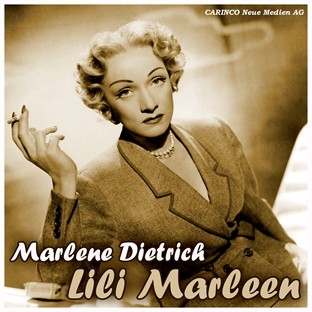
MARLENE DIETRICH'S RECORDED VERSION
Vor der Kaserne
Vor dem großen Tor
Steht eine Laterne
Und steht sie noch davor
so woll'n wir uns da wieder seh'n
Bei der Laterne wollen wir steh'n
Wie einst Lili Marleen,
Wie einst Lili Marleen.
Unsere beiden Schatten
Sah'n wie einer aus
Daß wir lieb uns hatten
Das sah man gleich daraus
Und alle Leute soll'n es seh'n
Wenn wir bei der Laterne steh'n
Wie einst Lili Marleen,
Wie einst Lili Marleen.
Deine Schritte kennt sie,
Deinen schönen Gang
Alle Abend brennt sie
Doch mich vergaß sie lang
Und sollte mir ein Leid gescheh'n
Wer wird bei der Laterne stehen
Mit dir Lili Marleen,
Mit dir Lili Marleen?
Aus dem stillen Raume,
Aus der Erde Grund
Hebt mich wie im Traume
Dein verliebter Mund
Wenn sich die späten Nebel dreh'n
Werd' ich bei der Laterne steh'n
Mit dir Lili Marleen,
Mit dir Lili Marleen? (bis)
Wenn sich die späten Nebel dreh'n
Werd' ich bei der Laterne steh'n
Mit dir Lili Marleen,
Mit dir Lili Marleen?
inviata da Riccardo Venturi - 21/7/2014 - 12:34
MARLENE DIETRICH'S STAGE VERSION
Vor der Kaserne
Vor dem großen Tor
Stand eine Laterne
Und steht sie noch davor
so woll'n wir uns da wieder seh'n
Bei der Laterne wollen wir steh'n
Wie einst Lili Marleen,
Wie einst Lili Marleen.
Unsere beiden Schatten
Sah'n wie einer aus
Daß wir lieb uns hatten
Das sah man gleich daraus
Und alle Leute soll'n es seh'n
Wenn wir bei der Laterne steh'n
Wie einst Lili Marleen,
Wie einst Lili Marleen.
Deine Schritte kennt sie,
Deinen schönen Gang
Alle Abend brennt sie
Doch mich vergaß sie lang
Und sollte mir ein Leid gescheh'n
Wer wird bei der Laterne stehen
Mit dir Lili Marleen,
Mit dir Lili Marleen?
Aus dem stillen Raume,
Aus der Erde Grund
Hebt mich wie im Traume
Dein verliebter Mund
Wenn sich die späten Nebel dreh'n
Werd' ich bei der Laterne steh'n
Mit dir Lili Marleen,
Mit dir Lili Marleen? (bis)
Wenn sich die späten Nebel dreh'n
Werd' ich bei der Laterne steh'n
Mit dir Lili Marleen,
Mit dir Lili Marleen?
inviata da Riccardo Venturi - 21/7/2014 - 12:27
Die U-Boot Fassung
La versione U-Boot
The U-Boot Version
The “U-Boot version” in German must have been created just shortly after the original version; its spirit is definitely far from being “martial”. The universal nature of this song peeps clearly out: the submariner's life is described crudely, and the seeming boldness cannot conceal a very different reality. A thousand meters from home is much better than a thousand meters deep in the ocean: the last verse is terribly clear.
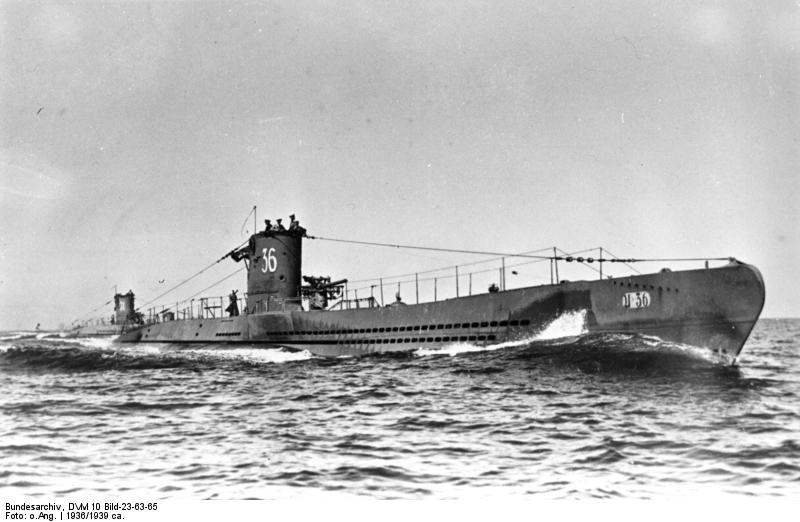
The "German U-Boot Version" specially composed for the submarine fleet during WW2.
Versión alemana compuesta para la flota de submarinos durante la Segunda Guerra Mundial.
Da / From uboat.net
U-BOOT FASSUNG
Auf dem Atlantik,
auf dem weiten Meer,
schwimmet unser U-Boot
so langsam hin und her,
und wenn wir denn auf Tiefe gehn,
so hab´n wir meistens 'was gesehn,
wie bei dir, Lili Marleen
wie bei dir, Lili Marleen
Plötzlich ruft der Posten:
"Rauchfahne voraus!"
Das kann drei Aale kosten
und macht uns gar nichts aus,
denn sollten sie daneben gehn,
kann uns daraus kein Leid entstehn,
wie bei dir, Lili Marleen
wie bei dir, Lili Marleen
Wenn die Spanten krachen,
und das Licht geht aus
und wir sacken tiefer,
das macht uns gar nichts aus,
und wenn wir denn auf Tiefe gehn,
bei tausend Meter bleib´n wir stehn,
wie bei dir, Lili Marleen
wie bei dir, Lili Marleen
Wir sind ja Artisten,
wir machen uns nichts draus,
und aus jeder Tiefe
steig´n wir gemütlich aus,
bei tausend Metern wird´s erst schön
wenn wir zu Fuss nach Hause gehn,
wie bei dir, Lili Marleen
wie bei dir, Lili Marleen.
inviata da Cristián Ramírez Muñoz (Santiago, Chile) - 5/10/2006 - 01:42
19 aprile 2014
VERSIONE SOMMERGIBILISTA
Là sull'Atlantico,
là sul vasto mar,
naviga il sottomarino
adagio qua e là,
e quando poi ci immergiam
è ché qualcosa visto abbiam,
come con te, Lili Marleen,
come con te, Lili Marleen.
La sentinella chiama:
„Fumo a dritta!“
Ci può costar tre siluri
ma noi ce ne infischiam,
ché dovrebbero andare in giù
e quindi noi nulla patiam,
come con te, Lili Marleen,
come con te, Lili Marleen.
Si senton scricchiolii,
la luce va via,
e noi si va più a fondo
e ce ne infischiam.
E se si va in profondità
a mille metri in piedi stiam,
come con te, Lili Marleen,
come con te, Lili Marleen.
Siamo degli artisti,
non ci scomponiam,
e da ogni profondo
arditi risaliam,
ma a mille metri bene stiam
quando a casa a piedi andiam,
come con te, Lili Marleen,
come con te, Lili Marleen.
English translation of the previous version sung on the German U-boats
On the Atlantic, on the wide sea,
Swims our U-boat so slowly to and fro,
And if we go to depth,
it's because we have usually seen something
As with you, Lili Marleen
As with you, Lili Marleen.
Suddenly shouts the guard:
"Smoke ahead!"
That can cost us three eels and still not quite do it,
Because should they slip past
For us no misfortune can arise from that
As with you, Lili Marleen
As with you, Lili Marleen.
When the bulkheads crack, and the lights go out,
And we sink deeper, that still does not finish us,
And if we then go deep,
We will stand in one thousand meters,
As with you, Lili Marleen
As with you, Lili Marleen.
Yes, we are artists, we make nothing out of it,
And from every depth we climb comfortably out.
At a thousand meters it will be lovely,
If we have to walk home
As with you, Lili Marleen
As with you, Lili Marleen.
Englisch und Italienisch
Inglese e Italiano
English and Italian
This section includes all the available versions of the song in English and Italian, say, the “working languages” of this website.
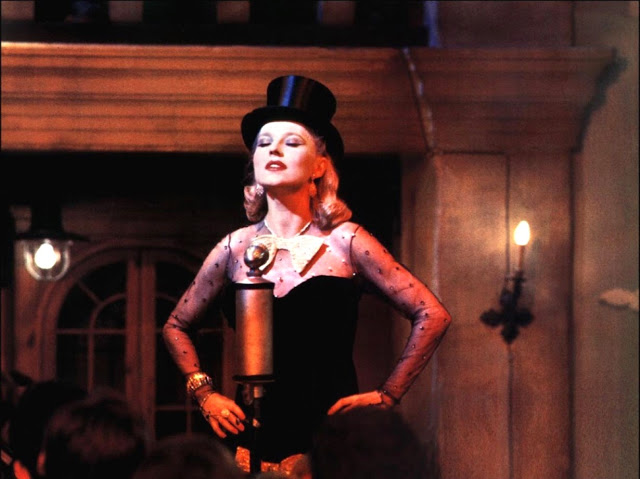
Versione italiana letterale di Monia Verardi del testo tedesco
A word-for-word translation of the German lyrics, by Monia Verardi
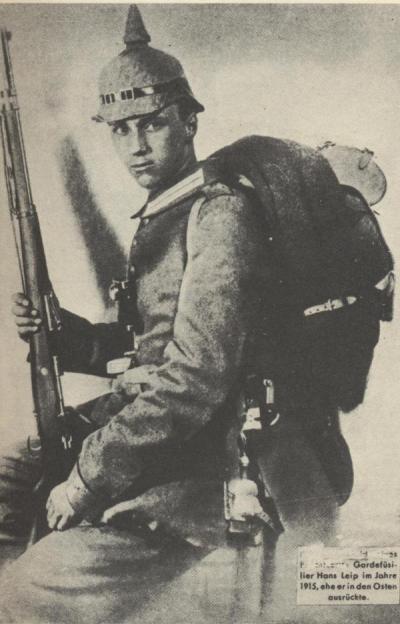
CANZONE DI UNA GIOVANE SENTINELLA
Davanti alla caserma
davanti al portone
si trovava un lampione
che è rimasto lì tutt'oggi
se ci volessimo rivedere
potremmo ritrovarci vicino al lampione
come una volta Lili Marleen
come una volta Lili Marleen
Le nostre ombre si fondevano
sembravano essere una sola
avevamo così tanto amore dentro di noi
che si vedeva subito anche da fuori
e tutti lo potevano vedere
quando stavamo vicino al lampione
come una volta Lili Marleen
come una volta Lili Marleen
Ma ecco che chiamò la guardia
"suonano la ritirata
questo ti può costare tre giorni"
"Camerata, vengo subito"
così ci dicemmo arrivederci
ma come avrei voluto invece venire con te!
come una volta Lili Marleen
come una volta Lili Marleen
Lei conosceva bene i tuoi passi
e la tua andatura delicata
tutte le sere si ardeva d'amore
ma nonostante ciò si stava dimenticando di me
procurandomi un gran dolore
chi ci sarà ora vicino al lampione
con te Lili Marleen? chi ci sarà?
Da luoghi silenziosi
dal profondo della terra
si alza come in un sogno la tua bocca
quando le tarde nebbie svaniranno
io sarò di nuovo vicino al lampione
come una volta Lili Marleen
come una volta Lili Marleen
inviata da Monia Verardi - 4/4/2005 - 09:18
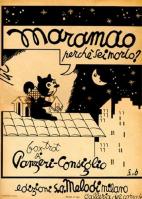
LE "CANZONI DELLA FRONDA"
NEL REGIME FASCISTA ITALIANO 1922-1943
ITALIANO / ITALIAN [2] - Nino Rastelli - Lina Termini
Versione italiana di Nino Rastelli [1941]
Standard Italian version by Nino Rastelli [1941]
Eseguita da Lina Termini
Performed by Lina Termini
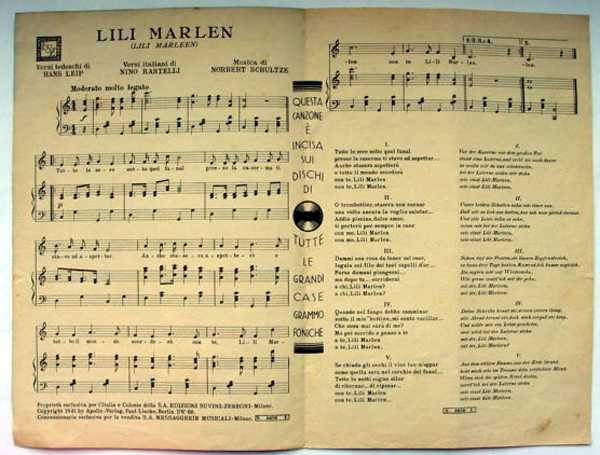
This version, like all the following versions in other languages (if not stated differently), is available at "Lili Marleen's Official Webpage"
(La specificazione non verrà più ripetuta.)
(This notice will not repeated any more.)

Altre interpreti italiane furono Meme Bianchi (1942-43) e Vivi Gioi (1942-43).
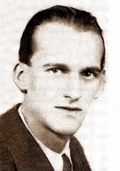
Other Italian interpreters have been Meme Bianchi (1942-43) and Vivi Gioi (1942-43).
LA CANZONE DELL'AVAMPOSTO
Tutte le sere
sotto quel fanal
presso la caserma
ti stavo ad aspettar.
Anche stasera aspetterò,
e tutto il mondo scorderò
con te Lili Marlen,
con te Lili Marlen.
O trombettier
stasera non suonar,
una volta ancora
la voglio salutar.
Addio piccina, dolce amor,
ti porterò per sempre in cor
con te Lili Marlen,
con te Lili Marlen.
Dammi una rosa
da tener sul cuor
legala col filo
dei tuoi capelli d'or.
Forse domani piangerai,
ma dopo tu sorriderai.
A chi Lili Marlen?,
A chi Lili Marlen?
Quando nel fango
debbo camminar
sotto il mio bottino
mi sento vacillar.
Che cosa mai sarà di me?
Ma poi sorrido e penso a te
con te Lili Marlen,
con te Lili Marlen.
Se chiudo gli occhi
il viso tuo m'appar
come quella sera
nel cerchio del fanal.
Tutte le notti sogno allor
di ritornar, di riposar,
con te Lili Marlen,
con te Lili Marlen.
inviata da Riccardo Venturi - 25/3/2005 - 18:15
As in the case of German soldiers before them, the song also became very popular with Italian soldiers who heard lyrics that were slightly changed from the original German text. Tony Fortuna, an Italian soldier during the war who was captured by the British army in Tobruk (North Africa) passed along to his nephew, Massimo Rosso, an unofficial variation in one stanza of the lyrics (the one starting with "Quando nel fango debbo camminar...")- Istrianet
Come era già successo per i soldati tedeschi, la canzone divenne molto popolare tra i soldati italiani. con parole leggermente diverse dal testo tedesco originale.
Tony Fortuna, un soldato italiano che durante la guerra fu catturato dall'esercito britannico a Tobruk (Nord Africa) trasmise al nipote, Massimo Rosso, una variazione non ufficiale di una strofa (al posto di "Quando nel fango debbo camminar...")
Versione italiana di Piergiorgio
Infine una breve riflessione: perché piace così tanto, questa canzone? un motivo, direi, è che essa non è storicamente contingente, ma universale nei contenuti, antica e sempre nuova, valida per tutti gli uomini d'ogni tempo. Poi, ad un livello più peculiare, essa suggerisce il disagio dell'uomo, che la contemporaneità (in particolare dal Novecento in poi) ha disumanizzato, massificato, reso "cosa". Nella guerra moderna il fenomeno è stato / è macroscopico, ma siamo "cose" anche quando produciamo, consumiamo, viviamo ecc. La canzone, i due personaggi che la animano, i loro sentimenti - ancorché dolorosi e quasi disperati - mi pare si mostrino incorrotti, di fronte a questa sorta di "Neue Ordnung" contemporanea.
Piergiorgio
Davanti alla caserma,
davanti alla gran porta
c’è un lampione
e sta ancora lì.
Ecco, lì vogliamo rivederci,
al lampione, vogliamo stare,
come una volta Lili Marleen,
come una volta Lili Marleen.
Entrambe le nostre ombre
come fossero una,
quanto ci amavamo,
si vedeva subito;
e tutti lo potevano vedere,
quando stavamo al lampione,
come una volta Lili Marleen,
come una volta Lili Marleen.
Già grida la sentinella:
«Suonano la ritirata:
questo può costarti tre giorni!».
«Camerata, vengo subito…».
Lì ci dicemmo arrivederci.
Come preferirei andare con te!
Come una volta Lili Marleen,
come una volta Lili Marleen.
Lei conosce i tuoi passi,
La tua delicata andatura.
Tutte le sere lei arde,
però mi dimenticava
e mi prendeva un gran dolore:
chi starà al lampione,
con te Lili Marleen?
Con te Lili Marleen?
Dallo spazio fermo,
dalla terra bassa
sale a me, come in sogno,
la tua bocca innamorata.
Quando, tarda, la nebbia si dissolve,
io starò al lampione,
come una volta Lili Marleen,
come una volta Lili Marleen.
inviata da Piergiorgio - 8/7/2008 - 16:52
Le parole tra parentesi non si trovano nel testo, le ho messe per rendere più scorrevole la frase.
A. Pelizzari (28.01.2010)
Davanti alla caserma, a fianco del portone
c'è sempre quel lampione, e lei sta ancora lì (sotto).
Se un giorno ci rincontreremo
dovrà essere proprio sotto quel lampione,
come una volta, Lilì Marleen,
come una volta, Lilì Marleen.
(Allora) le nostre due ombre si confondevano in una sola
per quanto ci amavamo, e lo si vedeva subito.
E tutti dovranno constatarlo ancora,
quando saremo di nuovo sotto il lampione
come una volta, Lilì Marleen,
come una volta, Lilì Marleen.
(Quell'ultima sera) la sentinella chiamò perché suonavano la ritirata.
Un ritardo costerebbe tre giorni (di libera uscita).
A malincuore risposi: “(vengo) subito, camerata!”,
allora ci dicemmo arrivederci; ma avrei preferito andarmene con te
con te, Lilì Marleen,
con te , Lilì Marleen.
Tutte le sere (quel lampione) si accende,
riconosce i tuoi passi, il tuo grazioso andare,
di me (invece) si è dimenticato: da lungo tempo non mi vede più
perché a me è capitata la peggior disgrazia.
Chi c'è adesso sotto quel lampione
assieme a te, Lilì Marleen,
assieme a te, Lilì Marleen?
Nel silenzio della tomba, sotto un metro di terra,
sogno il bacio della tua bocca amata,
e quando la nebbia della (mia) notte svanirà
andrò sotto il lampione ad aspettarti,
proprio come una volta. Lilì Marleen,
proprio come una volta, Lilì Marleen.
inviata da atonio pelizzari - 3/2/2010 - 08:23
Alfesibeo 02-2011
Davanti alla Caserma,
davanti al gran portone,
Si ergeva [1] un lampione
ed ancora si erge lì davanti.
Oh potessimo [2] rivederci là,
potessimo stare [3] accanto al lampione,
come una volta, Lili Marleen!!
Le nostre due ombre sembravano una sola,
che noi ci amassimo tanto,
da ciò lo si vedeva esattamente,
E tutti quanti dovranno vederlo,
quando saremo accanto al lampione, [4]
come una volta Lili Marleen.
E la sentinella chiamò.
"Suonano la ritirata!
Può costare tre giorni" [5]
"Camerata, arrivo subito".
Lì ci siamo detti arrivederci,
come sarei venuto volentieri via con te,
con te Lili Marleen.
I tuoi passi conosce [6]
il tuo delicato incedere,
tutte le sere arde,
ma da tempo ha dimenticato me
E dovesse mai capitarmi una disgrazia,
chi starà in piedi accanto al lampione
con te Lili Marleen?
Fuori dallo spazio immoto,
fuori dal suolo della Terra,
mi solleva come in sogno la tua amata bocca;
Quando le ultime nebbie si dissolveranno
ci starò io in piedi accanto al lampione,
come una volta Lili Marleen.
[2] lett. "volessimo" con valore ottativo
[3] sempre "stehen", stare in piedi cioè saldi, vivi
[4] qui nel testo i due tempi sono al presente indicativo, ma in italiano suona un po' troppo colloquiale
[5] giorni di consegna
[6] il soggetto è il lampione, "Die Laterne", ovviamente
inviata da Alfesibeo - 14/2/2011 - 23:22
Italian alternative verses, contributed by Gerald Bennett
Sotto il mio fardello mi sento vacillar
Che cosa mai sara di me
E poi sorrido e penso a te
A te Lili Marlene
A te Lili Marlen
Se chiudo gli occhi il viso tuo m'appar
Come quella sera nel cerchio del fanal
E tutta la notte sogno allor
Di ritornar,di riposar
Con te, Lili Marlene
Con te, Lili Marlen
inviata da Gerald Bennett - 26/10/2010 - 00:01
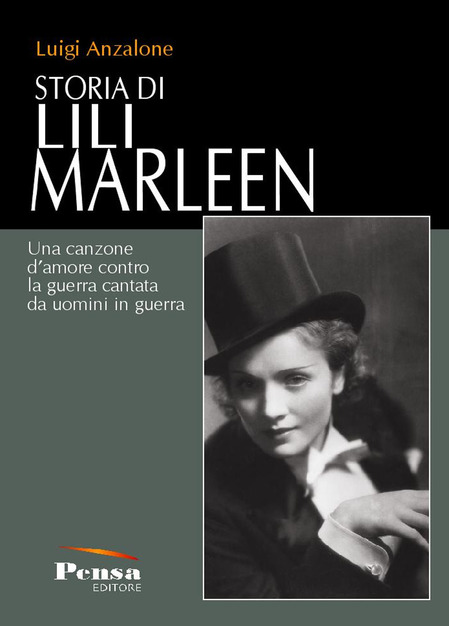
La traduzione italiana di Luigi Anzalone tratta dal volumetto: Storia di Lili Marleen – Una canzone d'amore contro la guerra cantata da uomini in guerra, Pensa Editore, 2017. Il volumetto è molto ispirato dalla presente pagina di questo sito, anche con citazioni dirette. Luigi Anzalone (che salutiamo e ringraziamo se legge), irpino, è autore di scritti storico-politici e filosofici. [RV]
Davanti alla caserma
Davanti alla grande porta,
C'era un lampione
E sta ancora lì davanti.
Così noi vogliamo vederci di nuovo lì,
Noi vogliamo stare vicino al lampione
Come una volta, Lili Marleen,
Come una volta, Lili Marleen.
Entrambe le nostre ombre
Sembravano una sola.
Che noi ci siamo tanto amati
Si vedeva bene da qui
E tutte le persone dovrebbero vederlo
Quando noi stiamo vicini al lampione
Come una volta, Lili Marleen,
Come una volta, Lili Marleen.
Presto il posto di guardia chiamò
Suonano la ritirata
Potrebbe costare tre giorni,
Camerata, io arrivo subito,
Così ci siamo detti arrivederci,
Quanto vorrei andare con te,
Come una volta, Lili Marleen,
Come una volta, Lili Marleen.
Conosce i tuoi passi,
La tua bella andatura,
Ogni sera brucia
Ma mi ha dimenticato da tempo
E se dovesse accadermi qualcosa
Chi starà presso il lampione
Come una volta, Lili Marleen,
Con te, Lili Marleen?
Dagli spazi silenti
Dal fondo della terra
Mi solleva come in un sogno
La tua bocca innamorata.
Quando tarda nebbia ti avvolge,
Chi starà presso il lampione
Come una volta, Lili Marleen,
Come una volta, Lili Marleen.
inviata da Riccardo Venturi - 20/2/2020 - 08:32
Traduzione italiana di Nino Rastelli [1941]
Standard Italian version by Nino Rastelli [1941]
Los Marcellos Ferial (o “I Marcellos Ferial”)
Lili Marlene / Bella Ciao (1965)


Anche in questo caso, così come in Bella Ciao, la canzone diventa una canzoncina d'amore, semplicemente eliminando le strofe che più la contestualizzavano, rimane un vago riferimento alla caserma, in fondo la naja era il motivo principale per cui i giovani nel 1965 si allontanavano da casa e dalle famiglie.
il viso tuo m'appar
come quella sera
nel cerchio del fanal.
Tutte le notti sogno allor
di ritornar, di riposar,
con te Lili Marlene,
con te Lili Marlene.
Tutte le sere
sotto quel fanal
presso la caserma
ti stavo ad aspettar.
La la la
la la la
con te Lili Marlene,
con te Lili Marlene.
la la
Dammi una rosa
da tener sul cuor
legala col filo
dei tuoi capelli d'or.
Forse domani piangerai,
ma dopo tu sorriderai.
A chi Lili Marlene?
A chi Lili Marlene?
inviata da Dq82 - 21/11/2024 - 09:17

Versione inglese di John Jordan Phillips e Tommie Connor [1944]
Si tratta della versione della canzone in lingua inglese cantata da Anne Shelton e Vera Lynn, nota anche come Lilly of the Lamplight.
Standard English version by John Jordan Phillips and Tommie Connor [1944]
The standard English version as sung by Anne Shelton and Vera Lynn, also known as Lilly of the Lamplight.
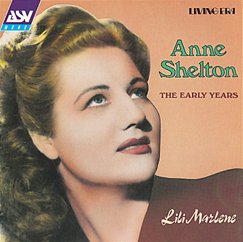
LILLY OF THE LAMPLIGHT
Underneath the lantern,
By the barrack gate
Darling I remember
The way you used to wait
T'was there that you whispered tenderly,
That you loved me,
You'd always be,
My Lilly of the Lamplight,
My own Lilly Marlene
Time would come for roll call,
Time for us to part,
Darling I'd caress you
And press you to my heart,
And there 'neath that far-off lantern light,
I'd hold you tight ,
We'd kiss good night,
My Lilly of the Lamplight,
My own Lilly Marlene
Orders came for sailing,
Somewhere over there
All confined to barracks
was more than I could bear
I knew you were waiting in the street
I heard your feet,
But could not meet,
My Lilly of the Lamplight,
my own Lilly Marlene
Resting in our billets,
Just behind the lines
Even tho' we're parted,
Your lips are close to mine
You wait where that lantern softly gleams,
Your sweet face seems
To haunt my dreams
My Lilly of the Lamplight,
My own Lilly Marlene.
inviata da Riccardo Venturi - 25/3/2005 - 18:17
Si tratta della versione di solito cantata in America e dai soldati americani. Cantata da un'altra Marlene, antinazista, esule: semplicemente la Storia.
The English version as sung by Marlene Dietrich. It is also the version usually sung in America by US soldiers [1943]. Performed by another Marlene, anti-Nazist, exiled: simply History.
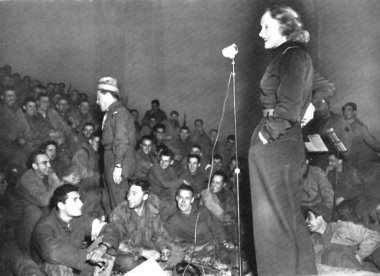
Outside the barracks by the corner light
I'll always stand and wait for you at night
We will create a world for two
I'll wait for you the whole night through
For you, Lili Marleen
For you, Lili Marleen
Bugler tonight, don't play the Call To Arms
I want another evening with her charms
Then we will say goodbye and part
I'll always keep you in my heart
With me, Lili Marleen
With me, Lili Marleen
Give me a rose to show how much you care
Tied to the stem, a lock of golden hair
Surely tomorrow you'll feel blue
But then will come a love that's new
For you, Lili Marleen
For you, Lili Marleen
When we are marching in the mud and cold
And when my pack seems more than I can hold
My love for you renews my might
I'm warm again, my pack is light
It's you, Lili Marleen
It's you, Lili Marleen
My love for you renews my might
I'm warm again, my pack is light
It's you, Lili Marleen
It's you, Lili Marleen.
inviata da Riccardo Venturi - 26/3/2005 - 01:37
A word-for-word translation of the German lyrics made by Frank (1998) and sent to the song's official website:
At the barracks compound,
By the entry way
There a lantern I found
And if it stands today
Then we'll see each other again
Near that old lantern we'll remain
As once Lili Marleen.
Both our shadows meeting,
Melding into one
Our love was not fleeting
And plain to everyone,
Then all the people shall behold
When we stand by that lantern old
As once Lili Marleen.
Then the guard to me says:
"There's tap call, let's go.
This could cost you three days."
"Be there in half a mo'."
So that was when we said farewell,
Tho' with you I would rather dwell,
With you, Lili Marleen.
Well she knows your foot steps,
Your own determined gait.
Ev'ry evening waiting,
Me? A mem'ry of late.
Should something e'er happen to me,
Who will under the lantern be,
With you Lili Marleen?
From my quiet existence,
And from this earthly pale,
Like a dream you free me,
With your lips so hale.
When the night mists swirl and churn,
Then to that lantern I'll return,
As once Lili Marleen.
inviata da Riccardo Venturi - 25/3/2005 - 18:18

The version performerd by the Italo-American singer Perry Como (1944) is essentially the same as Tommy Connor's standard version, with recited parts. Lyrics are reproduced from this page.
"A recording was made by Perry Como on 27 June 1944 and issued by RCA Victor Records as a 78rpm record (catalog number 20-1592-A) with the flip side "First Class Private Mary Brown". This recording was later re-issued as catalog number 20-2824-A with flip side "I Love You Truly". The song reached chart position #13 on the United States charts. The song was recorded during the musicians' strike and consequently has a backing chorus instead of an orchestral backup." - en.wikipedia
( This is the story of Lili Marlene,
doo, doo, doo doo, doo! )
Would you like to hear the story,
of a girl that many soldiers know?
It's a tale of love in all it's glory,
they tell when the lights are soft an' low!
Underneath the lamp post by the brigades
standing all alone every night you'll see her wait,
she waits for a boy who marched away
and though he's gone, she hears him say:
"Oh promise you'll be true,
fare thee well Lili Marlene,
'till I return to you,
fare thee well Lili Marlene! "
( This is the story of Lili Marlene! )
With a kiss she gave her promise,
to be constant as the stars above,
every soldier knows she's kept her promise,
and she has been faithful to her love!
( Underneath the lamp post by the brigade
standing all alone every night you'll see her wait,
for this is the place a vow was made
and breezes sing her serenade . . . )
"Oh promise you'll be true,
fare thee well Lili Marlene,
'till I return to you,
fare thee well Lili Marlene, "
( This is the story of Lili Marlene!
Though wee stems have an ending,
no one knows just what the end will be
but tonight when twilight is descending,
if you'll come along, here's what you'll see . . . )
Underneath the lamp post by the brigade
standing all alone every night you'll see her wait,
and as they go marching to the fray
the soldiers all salute and say:
We'll tell him you've been true,
fare thee well Lili Marlene,
'till he returns to you,
fare thee well . . .
Lili Marlene!
inviata da Riccardo Venturi - 6/9/2008 - 00:41
"Lili Marleen" was the 20th Century's most popular Soldier's Song.
Lale Andersen is the song's finest interpreter: here's her English language version.
This performance was broadcast from German Radio to Australian and New Zealand troops in North Africa in the Spring of 1942.
Listen to the bugle, hear its silv'ry call,
Carried by the night air telling one and all,
"Now is the time to meet your girl,
to meet your girl,
to meet your girl",
as once I met Marleen...
my sweet Lili Marleen.
Underneath the lantern by the barracks gate,
there I met Marleen every night at eight...
That was the time in early Spring
when birds all sing
then Love was king,
of my heart and Marleen's,
of my heart and Marleen's.
Waiting for the drum beat signaling retreat,
walking in the shadows where all lovers meet.
Yes, those were days of long ago
I loved her so,
I couldn't know
that time would part Marleen,
that time would part Marleen.
Then I heard the bugle calling me away,
by the gate I kissed her, kissed her tears away.
And, by the flick'ring lantern's light
I held her tight,
t'was our last night,
my last night with Marleen
my last night with Marleen.
Still I hear the bugle, hear its silv'ry call,
carried by the night air telling one and all,
"Now is the time to meet your girl,
to meet your girl,
to meet your girl",
as once I met Marleen
my sweet Lili Marleen.
In anderen Sprachen
In altre lingue
In other Languages
This section should theoretically include the versions of “Lili Marleen” in 46 languages: the legendary 48 translations minus those in Italian and English. As a matter of fact, the versions included aren't all up to now; it is anyway the most comprehensive repertory of the song versions existing in the world. We'll get it, sooner or later.
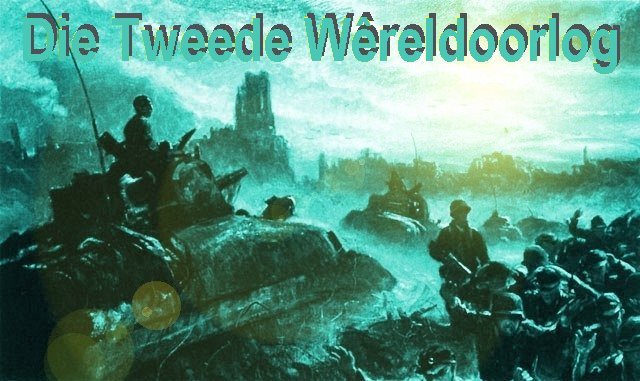
“Wat baie mense reeds vergeet het, is dat "Lili Marleen" ook in Afrikaans gesing is deur Suid-Afrikaanse soldate, onder andere in die Noorde. Koos Human het my vertel dat "Lili Marleen" dikwels in Afrikaans gehoor is oor die radio in die vroeë veertigerjare van die vorige eeu. Prof. Pieter W. Grobbelaar het twee Afrikaanse vertalings van "Lili Marleen" opgespoor, en het dié een aan my gestuur.”
“Ciò che parecchia gente ha già scordato, è che “Lili Marleen” è stata cantata anche in afrikaans dai soldati sudafricani, tra gli altri nel Nordeuropa. Koos Human mi ha raccontato che “Lili Marleen” veniva ascoltata spesso alla radio in afrikaans nei primi anni '40 del secolo scorso. Il prof. Pieter Grobbelaar ha trovato due traduzioni in afrikaans di “Lili Marleen”, e me ne ha messa una a disposizione.”
Lili Marleen would be sung also in Afrikaans by South African troops fighting in WW2 (specially in Northern Europe). This can be inferred by an article by Hennie Aucamp published on May 7, 2005 in the newspaper Die Burger:
“Wat baie mense reeds vergeet het, is dat "Lili Marleen" ook in Afrikaans gesing is deur Suid-Afrikaanse soldate, onder andere in die Noorde. Koos Human het my vertel dat "Lili Marleen" dikwels in Afrikaans gehoor is oor die radio in die vroeë veertigerjare van die vorige eeu. Prof. Pieter W. Grobbelaar het twee Afrikaanse vertalings van "Lili Marleen" opgespoor, en het dié een aan my gestuur.”
“What a lot of peoples has already forgotten, is that “Lili Marleen” was also sung in Afrikaans by South African soldiers, among others in Northern Europa. Koos Human told me that “Lili Marleen” was often listened to in Afrikaans in the early 40s of the past century. Prof. Pieter Grobbelaar discovered two Afrikaans translations of “Lili “Marleen”, and put one at my disposal.”
wag ek elke nag,
staan ek in die lamplig
daar vir jou en wag...
'N huisie vir twee sal ons laat bou,
ek wag my lewe lank vir jou,
vir jou, Lili Marlene,
vir jou, Lili Marlene.
Blaas daar die sein
vir bewapening
gee my nog 'n aand
in jou betowering
moet ons dan vaarwel sê
en moet skei maar in my hart
bly jy by my,
net jy Lili Marlene.
Gee my dan 'n roos
om te kan wys jy
gee ook om met
'n goue kruis voel jy
terneergeslaan onthou daar
kom weer beter dae,
vir jou Lili Marlene,
vir jou Lili Marlene.
As ons marsjeer
in modder en in kou
en my pak voel swaarder
as wat ek kan hou
my liefde vir jou hernieu,
my plig ek is weer warm
my pak voel lig vir jou,
vir jou, Lili Marlene.
En as die oorlog
oor is en ons veg nie meer,
kry ek jou dan daar net
by jou woonhuisdeur,
ons liefde sal ons weer kan herbou,
my liefde die bly nog steeds vir jou,
vir jou Lili Marlene,
vir jou Lili Marlene.
inviata da Riccardo Venturi - 29/7/2014 - 12:26
From the same article by Hennie Aucamp published in "Die Burger" it is possible to draw the following (literal) Afrikaans translation of "Lili Marleen". The whole article deserves to be read; Afrikaans is a very easy language, provided you know just a little Dutch. [RV]
Voor die barakke,
voor die groot hek
het daar 'n lantern gestaan
en as dit nog daar staan,
sal ons weer daar ontmoet
en by die lantern staan
soos eens, Lili Marleen,
soos eens, Lili Marleen.
Ons twee skaduwees
het soos een daar uitgesien
dat ons mekaar liefgehad het,
kon hieruit afgelei word.
En almal sou ons gesien het
daar by die lantern,
soos eens, Lili Marleen,
soos eens, Lili Marleen.
Spoedig waarsku die wag my,
hulle blaas die beuelsinjaal:
"Oortreding kan jou drie dae kos!"
"Kameraad, ek kom dadelik."
Dan sê ek en Lili Marleen tot siens,
hoe graag sou ek met jou wou gaan,
met jou, Lili Marleen,
met jou, Lili Marleen.
Jou skadu, Lili Marleen,
is goed bekend aan die lantern
en ook jou regop gang
elke aand brand dit opnuut
maar die lantern het my lankal vergeet,
en sou ek ook iets oorkom
wie sal dan by die lantern staan
met jou, Lili Marleen,
met jou Lili Marleen?
Vanuit die stil ruimte van my graf
in die diepte van die aarde
word ek gelig soos in 'n droom
deur jou liefdevolle lippe.
Wanneer die laat newels wegdryf
sal ek by die lantern staan
soos eens Lili Marleen,
soos eens Lili Marleen.
inviata da Riccardo Venturi - 29/7/2014 - 13:23
 La versione albanese di Alfred Kola proveniente da Klasa e Letërsisë - faqe në ndihmë të gjimnazistëve. Perfettamente ritmica e cantabile.
La versione albanese di Alfred Kola proveniente da Klasa e Letërsisë - faqe në ndihmë të gjimnazistëve. Perfettamente ritmica e cantabile.Albanian translation by Alfred Kola reproduced from Klasa e Letërsisë - faqe në ndihmë të gjimnazistëve. Fully rhytmic and singable.
Para kazermës,
Para portës sonë,
Ngrihet lampadari
Përballë ende qëndron.
Duam sërish të shihemi,
Nën llambadar duam të rrim’
Si dikur, Lili Marlen.
Si dikur, Lili Marlen.
Të dy hijet tona
Duken porsi një,
Bashkë të pushtuar,
Askush s’na dallon më.
Gjithë njerëzia të na shoh’,
Kur poshtë llambës të qëndrojm’
Si dikur, Lili Marlen.
Si dikur, Lili Marlen.
Ja thërret roja:
Tromba po buçet,
Tri dit’ do të kushtojë!
Kapiten ja erdha shpejt.
Atje ne thamë lamtumir’
Me ty të shkoja ish më mir’
Me ty, Lili Marlen!
Me ty, Lili Marlen!
Ecjen ka dalluar,
Hapat ti zmadhon,
Mbrëmjeve përv’luar,
Ka koh’ që s’më kujton.
Nëse më ndodh një fatkeqësi,
Kush do t’qëndroj’ nën llamb’ me ty,
Me ty, Lili Marlen!
Me ty, Lili Marlen!
Nga hapësir’ e heshtur
Nga toka mbi dhè,
Më çojn’ si në ëndërr
T’ëmblat buz’ që ke.
Mjegull e vonë kur të kaloj,
Tek llambadari do qëndroj
Si dikur, Lili Marlen.
Si dikur, Lili Marlen.
inviata da Riccardo Venturi - 30/7/2014 - 09:37
Contributed by DonQuijote82. A non-rhythmic, literal Basque translation.
Lili Marleen 1937an Norbert Schultze konposatzaileak idatzitako alemaniar abesti bat da. Berez, aurretik Lehen Mundu Gerran zehar, 1915ean, Hans Leip alemaniar gudariak idatzitako olerki batean oinarritzen da. Abestia 1938an estreinatu zen, eta Bigarren Mundu Gerran zehar sekulako ospea eta arrakasta lortu zuen, hizkuntza ugaritara itzulia izan da, herrialde batzutan martxa militar, kirol abesti edota koarteleko abesti arrunt ere bilakatu delarik.
Koartelaren aurrealdean,
atariaren aurrean,
farola bat zegoen,
eta oraindik han dago.
Han berriz elkartuko gara,
farolaren azpian egongo gara.
Lehen bezalaxe, Lili Marleen.
Gura bi itzalak
bat ziruditen.
Hainbeste maite ginen
non itxura hori zuen.
Eta jende guztiak ikusiko du,
farolaren azpian egongo garenean.
Lehen bezalaxe, Lili Marleen.
Zaindariak berehala deiadar egin du
"Ikuskatzea burutzen ari dira
Hau hiru egun kostatuko zaik"
Adiskide, banoak
Orduan elkarri agur esaten genion
Zurekin abestuz joango nintzen
Zurekin, Lili Marleen
Berak zure pausoak ezagutzen zituen
zure ibilkera galaia
arratsalde guztietan kiskaltzen zen
nahiz eta ahaztua ninduen
eta zeozer gertatuko balitzaidake
Nor jarriko zen farolaren azpian
Zurekin?, Lili Marleen
Eremu isiletik
Lurraren lurretatik
Amets batean bezala mantentzen naute
zure ezpain zoragarriak
Gaueko lainoa pilatzen denean
ni farolan egongo naiz
Lehen bezalaxe, Lili Marleen
inviata da DonQuijote82 - 19/4/2014 - 11:21
ছাউনির সামনে, ওই গেটের পাশে
একটি লণ্ঠনের আলো আজো যে আসে
সেইখানে আমরা দেখা করবো যে
লণ্ঠনের আলোয় দাঁড়িয়ে দুজনে
দুজনে লিলি মারলিন (দুজনে)
দুজনে লিলি মারলিন (দুজনে লিলি মারলিন)
আমাদের ছায়া দুটি এক হয়ে যেত
ভালোবাসা আমাদের ছিল যে কত
আমাদের কথাতো সবাই জানত
লণ্ঠনের আলোয় যখন দেখা হত
তাই নয় লিলি মারলিন (তাই নয়)
তাই নয় লিলি মারলিন (তাই নয় লিলি মারলিন)
প্রহরীটি বলতো: বিউগল বেজেছে
"তিন দিনের শাস্তি!" "দোস্ত, আসছি এক্ষণে"
বিদায় নিতাম অমনি যে আমরা দুজনে
মনের মাঝে ইচ্ছে তো যাই তোমার সাথে
সাথে লিলি মারলিন (সাথে)
সাথে লিলি মারলিন (সাথে লিলি মারলিন)
তোমার মৃদু পায়ের শব্দ চেনে সে
প্রতি রাতে জ্বলে, তবে আমায় ভুলেছে
এমন যদি হয় আর আসি না ফিরে
লণ্ঠনের আলোয় অপেক্ষায় কে
সে কে লিলি মারলিন? (সে কে?)
সে কে লিলি মারলিন? (সে কে লিলি মারলিন?)
নিস্তব্ধে ঘেরা এক সমাধি থেকে
স্বপ্নে জাগি তোমার উষ্ণ ছোঁয়াতে
রাতের কুয়াশারা যখন ভেসে বেড়ায়
লণ্ঠনের আলোয় ফিরব আমি যে
ফিরব লিলি মারলিন (ফিরব)
ফিরব লিলি মারলিন
( রাতের কুয়াশারা যখন ভেসে বেড়ায় )
( লণ্ঠনের আলোয় ফিরব আমি যে )
ফিরব লিলি মারলিন (ফিরব)
(ফিরব মারলিন)
inviata da Riccardo Venturi - 6/3/2024 - 01:51
La versione bretone di Jakez Konan. Testo e introduzione sono ripresi da br.wikipedia.
The Breton version by Jakez Konan. Lyrics and introduction reproduced from br.wikipedia
Savet eo ar ganaouenn diwar ur varzhoneg gant Hans Leip e 1915. Kentañ ma voe kanet a voe gant ar ganerez Lale Andersen en 1938.
Un doare brezhonek a voe savet gant Jakez Konan.
Hans Leip en doa skrivet Lied eines jungen Wachpostens (« Kan ur gedour yaouank ») e Berlin e-pad ar Brezel-bed kentañ, a-raok mont d'an talbenn rus e miz Ebrel 1915.
Sot-pitilh e oa Leip gant div blac'h yaouank. Lili, nizez e berc'hennez, ha Marleen, klañvdiourez, ha gant an div en deus graet unan. Er c'hazarn ma ranke chom, abalamour n'oa ket bet sentus, edo o valañ soñjoù du en ur vonedonea evel ur gedour. War e wele-kamp neuze en doa skrivet ar gwerzennoù kentañ.
Met un doare all zo d'an istor. Hervez doare e oa Hans Leip e karantez gant Lilly Freud (1888-1970), merc'h da Marie Freud, c'hoar da Sigmund Freud. Anzavet en deus Hans Leip en doa anavezet Lilly Freud a oa dimezet e 1917 d'an aktor ha leurenner Arnold Marlé.
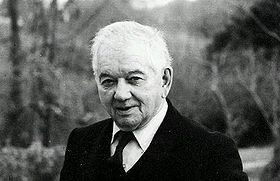
Jakez Konan (1910-2003) è stato uno dei più prolifici scrittori in lingua bretone.
Jakez Konan (1910-2003) has been one of the most prolific writers in the Breton language.
'Tal ar c'hazarn bemnoz
'Kichen an nor vras
'Vezan ouzh da c'hortoz
Dindan al letern glas
Eno fenoz evel gwechall
Ouzh da c'hedal e vin gant mall
'Vel kent, Lili Marleen
'Vel kent, Lili Marleen.
Diouzh hon daou skeud stardet
Un'n ne weled ken
Nag em eus da garet
Henn goût a rae pep den
Ret eo d'an holl gwelout fenoz
E vimp dindan al letern kozh
'Vel kent, Lili Marleen
'Vel kent, Lili Marleen.
Son a rae ar c'hleron
Sentiñ a oa ret
Pe e tapjen prizon
Chom pelloc'h n'hallen ket
Neuze diouzhit e tec'han kuit
Pa'm bije bet c'hoant mont ganit
Ganit, Lili Marleen
Ganit, Lili Marleen.
'Tal al letern karet
Gant va Lili gaezh
Pell em eus ankouaet
E sked bep abardaez
Met va c'halonig 'yafe fall
Mar kavfen eno unan all
Ganit, Lili Marleen,
Ganit, Lili Marleen.
Rak e don va spered
Ha dalc'hmat em c'hreiz
Eo da zremm venniget
A welan noz ha deiz
Emberr, ya, selaou 'ta ouzhin,
Dindan al letern kozh e vin,
'Vel kent, Lili Marleen
'Vel kent, Lili Marleen.
inviata da Riccardo Venturi - 8/4/2014 - 04:26
La versione bulgara storica cantata da Iva Vanja [1942]. Il testo e l'introduzione sono ripresi da bg.wikipedia. È seguita da una trascrizione. La versione bulgara è storica anche per un ulteriore motivo: Iva Vanja era la moglie di Norbert Schultze, il compositore della musica di Lili Marleen. L'artista bulgara la cantò sia nella sua lingua materna, che in tedesco.
The historic Bulgarian version sung by Iva Vanya [1942]. The lyrics and introduction are reproduced from bg.wikipedia. Includes transcription. This Bulgarian version may be historic for another cause: Iva Vanja was the wife of Norbert Schultze, the author of Lili Marleen's music. The Bulgarian artist used to sing it both in her native language and in German.

Стихотворението е публикувано за първи път в сборник с поезия през 1937 г., първоначално озаглавено "Песен на един млад войник, на пост." Първата мелодия за стихотворението е написана от Рудолф Цинк през 1938 г., а първият изпълнител на песента е Вили Фрич, който продава около 700 плочи.
В 1937 г. песента привлича вниманието на композитора Норберт Шулце (на немски: Norbert Schultze) съпруг на "сладоледената фея" и мис Берлин 1930 г. Ива Ваня - българската актриса, звезда на немското кино в годините преди Втората световна война Иванка Янакиева от граничното трънско село Джинчовци [1] [2]. В Берлин през 1938 г.̀ той написва новата музика на песента, с която тя остава в историята. Песента първоначално е наречена "Момичето под фенера", но става известна като "Лили Марлен" по името на героинята си. Първите й изпълнения са на Лале Андерсен от 1938 г. в престижното берлинско заведение "Kabarett der Komike". Шулце прави ритъма ѝ по-маршов очевидно за да е в крак с времето и песента "тръгва" - продадени над един милион копия (рекордът принадлежи на плочата на Лале Андерсен, издадена през 1939 г.).
От 18 август 1941 г. радиостанцията на окупационните немски войски "Soldatensender Belgrad" ("Войнишко радио Белград") започва да я излъчва и по-специално за африканския корпус на генерал-лейтенант Ервин Ромел. Използва се обикновена плоча купена на старо от магазин във Виена от един лейтенант, служещ в радиото. Песента скоро е спряна по искане на министър Гьобелс, защото кабаретната певица Лале Андерсен я пее с "недостатъчна бодрост" и песента става "депресираща", а изпълнителката за "упадъчно, не-немско поведение" е заплашена от концентрационен лагер, но съобщението за това от Би Би Си я спасява и обръща положението. Певицата е обявена за национално съкровище в Германия и канена многократно от Хитлер, докато не си припомнат отдавнашната й близост̀ с Ролф Либерман и други немски и швейцарски музиканти от еврейски произход и песента е забранена отново. Тогава до радиото започват да пристигат купища писма от войници от всички фронтове, с искане да се възобнови излъчването на песента. Загрижен за повдигане духа на войниците, към исканията от писмата се присъединява и самият генерал Ервин Ромел, който настоява песента да се излъчва редовно. Това е направено, и "Soldatensender Belgrad" започва всекидневно да пуска песента в 21:55 ч., с което завършва емисията си за деня цели 3 години и два месеца - чак до 20 октомври 1944 г., когато Белград е превзет от Червената армия, български и югославски войски. Песента става изключително популярна в германската армия. Всеки род войски, всеки фронт, дори всяка дивизия придобива своята версия на "Lili Marleen", отразяващи спецификата на мястото и т.н.
Най-известните записи на песента са на "титулярната" й изпълнителка Лале Андерсен и на ангажираната от американците в 1944 г. да я запише на немски и на английски Марлене Дитрих.
В нашата казарма до входната врата,
един фенер висеше и свети ощ в нощта,
ний двама ще се срещнем пак,
там под фенера в нощний мрак,
със теб Лили Марлин
със теб Лили Марлин
Двете наши сенки се сливаха в една,
силната ни обич личеше тъй сама,
и всички нек ни видят пак,
там под фенера в нощний мрак,
със теб Лили Марлин
със теб Лили Марлин
Там прозвуча тръбата, зарята почва веч,
другарю ето идвам, аз знам три дни арест.
О колко исках да съм с теб,
дано се видим в близък ден,
със теб Лили Марлин
със теб Лили Марлин
Твойте стъпки знай той и ходът ти напет,
но мен не ме забрави фенерът наш със теб,
и щом съдбата ме срази,
кой ще със тебе там стои,
със теб Лили Марлин
със теб Лили Марлин
В синия безкрай из тихата земя,
твоите целувки събуждат ме в съня,
и щом мъгли се спуснат пак,
ще се възправя в нощний мрак,
до теб Лили Марлин
до теб Лили Марлин
До теб Лили Марлин!
до теб Лили Марлин!
V našata kazarma do vxodnata vrata,
edin fener viseše i sveti ošt v noštta,
nij dvama šte se sreštnem pak,
tam pod fenera v noštnij mrak,
săs teb Lili Marlin
săs teb Lili Marlin
Dvete naši senki se slivaxa v edna,
silnata ni obič ličeše tăj sama,
i vsički nek ni vidjat pak,
tam pod fenera v noštnij mrak,
săs teb Lili Marlin
săs teb Lili Marlin
Tam prozvuča trăbata, zarjata počva več,
drugarju eto idvam, az znam tri dni arest.
O kolko iskax da săm s teb,
dano se vidim v blizăk den,
săs teb Lili Marlin
săs teb Lili Marlin
Tvojte stăpki znaj toj i xodăt ti napet,
no men ne me zabravi fenerăt naš săs teb,
i štom sădbata me srazi,
koj šte săs tebe tam stoi,
săs teb Lili Marlin
săs teb Lili Marlin
V sinija bezkraj iz tixata zemja,
tvoite celuvki săbuždat me v sănja,
i štom măgli se spusnat pak,
šte se văzpravja v noštnij mrak,
do teb Lili Marlin
do teb Lili Marlin
Do teb Lili Marlin!
Do teb Lili Marlin!
inviata da Riccardo Venturi - 8/4/2014 - 03:39
Una versione bulgara (letterale) proveniente dal forum Boina Slava. È seguita da una traslitterazione.
A (word-for-word) Bulgarian translation as reproduced from the forum Boina Slava. Includes transcription.
(Димитри Иванов)
Чуя ли за медиен закон*, сещам се за Лили Марлен. Онзи ден умря на 91-години Норберт Шулце, който написа тази мелодия. От последната си снимка той ни се усмихва и ни сочи челото си:
Помислете...Написах толкова по-хубави неща от "Лили Марлен". Не, нямам предвид "Bomben auf England", нито "Vorwaerts nach Osten". Но имам балетни сюити, музика за много филми. Най-много се гордея с операта "Черният Петър". Даваха я в 100 немски театри едновременно и тя разсмиваше децата, които войната лиши от детство. И всичко потъна в забрава. Оцеля само "Лили Марлен" поради едно недоразумение в България.
"Лили Марлен" е по стихотворение на 19-годишния Ханс Лайп. Преди да го убият в Първата световна война той харесвал две момичета - Лили и Марлене. Едната била сдържана, другата общителна; всяка по своему привлекателна и Ханс си фантазирал, че има момиче, което се казва Лили-Марлен; то прилича и на Лили и на Марлене и го чака под фенера край старата казарма.
Норберт Шулце открил стихотворението на Ханс Лип, написал за него една простичка мелодия и направил запис с кабаретната певица Лале Андерсен.
Шефът на пропагандата д-р Гьобелс забранил "Лили Марлен" като разложителна за бойния дух на Вермахта и Гестапо тръгнало да арестува Лале Андерсен, само че любовникът й я предупредил и тя избягала през Норвегия. На Шулце му се разминало: Гьобелс пишел сценарий за филм и разчитал на неговата музика. Ценял го като композитор, но само да пише мелодиите, а други да му пишат текста.
Моят малшанс и...
Спряха "Лили Марлен" по радио Берлин и радио Донау, ама кой да каже на радио София - Бекерле в немската легация зад "Попа" (паметника на патриарх Евтимий), която после стана нотариат, сигурно е имал други грижи, пък и при война работите винаги се объркват и те се объркаха още повече, когато започнаха въздушните бомбардировки над София. Средновълновият ни предавател излъчваше час по желание за немските войници в България и за окупационния корпус в Югославия и Гръция и беше относително мощен за времето си, но не вярвам на приказките, че "Лили Марлен" стигала чак до войниците на Ромел и на Мотгомъри в Либия. Във всеки случай "Лили Марлен" беше в ефира много често и в полунощ радиопрограмата ни - единствената разрешена за слушане - свършваше пак с нея.
Американците ни бомбардираха денем с фугасни бомби, англичаните - нощем със запалителни, не зная защо така. Спираха електричеството и след отбой отново го пускаха - и пак "Лили Марлен", както тогава, когато видях трамвайната линия пред "Попа" осеяна със сребърните лъжички от бабиния сервиз за чай. Разправят, че където падне бомба или артилерийски снаряд на същото място не удря втори път, но през нощта падна втора бомба и ми изгоря пианото Foerster (не Stainway като на Иво Хаджимишев, за каквото мечтаех), а сборникът с екзерсиси Straubock - чудна работа! - не изгоря. Целеха легацията срещу нас, но така и не я улучиха; тогава нямаше "умни бомби". А там, където свършва Борисовата градина и сега са жилищните блокове на улица "Незабравка" имаше немски казарми - дървени бараки, но спретнати, с бели перденца и цъфнал шибой на прозорците, но и тях все не улучваха и ако се разходите из гората зад телевизионната кула, ще видите бомбените кратери; вече полузапълнени от годините и по-плитки, отколкото бяха, но пак си личат.
...малшансът на "Касабланка"
Шлагерът на ХХ век щеше да е "As Time Goes By" от филма "Касабланка", но "As Time Goes By" остана на второ място след "Лили Марлен" и това е хубаво, понеже "As Time Goes By" беше за едните, докато "Лили Марлен" беше и за едните, и за другите и стана хит на немски, английски, френски и на още 46 езика, включително на иврит.
Френската версия беше шлагер номер едно в окупирания от немците Париж, а Марлене Дитрих изпълняваше английска версия на концертите за американските войници. След войната направиха няколко филма по тази история; един от филмите е на Шулце и в главната роля е Лале Андерсен. За най-добър минава филмът "Лили Марлен" на Райнер Вернер Фасбиндер от 1981.
Когато войната свърши, съветските и съюзническите войски се различававаха по три неща. Едните носеха чорапи, другите - партенки. Едните мечтаеха да се върнат у дома, другите - да останат в Европа. Третата разлика беше "Лили Марлен". Американците и другите, които бяха воювали в прибоите на Нормандия и джунглите на Гуадалканал, в пясъците на северна Африка и снеговете на Вогезите се завръщаха у дома подсвирквайки си "Лили Марлен". А в нашия "лагер" тя стана забранен "фашистки шлагер". И забранате беше по-продължителна и по-ефикасна, отколкото при Гьобелс.
* САЩ нямат такъв закон и не страдат. Нашите законотворци са закономани. Да млък... Да преминат от алегро фуриозо на пианисимо!
Sega - Internet Magazine
До стената на казармения двор,
Осветен от уличната лампа
Падат бавно есените листа
Колко ли време стоя
И чакам...
Теб, Лили Марлен
Теб, Лили Марлен
Двете ни сенки изглеждат като една
И всички ли в нас гледат,
Та и часовият вече ме вика
"Идвам, другарю!"
Казвам за да съм още миг...
С теб, Лили Марлен
С теб, Лили Марлен
Ако не умра от страх в окопа,
Ако снайпер не ме надупчи
Или пък ако сам не се предам в плен
Ще бъдем заедно, знам
Изпълнени с любов тук...
С теб, Лили Марлен
С теб, Лили Марлен
Фенерът на улицата познава твоите стъпки
Но, уви, май мен вече е забравил.
И ако всичко с мен е приключило, питам се
кой ще стои под светлината му...
С теб, Лили Марлен
С теб, Лили Марлен
Но и където и да съм
Споменът, всичко твое ще ме вдигне
И изпълнен с надежди
Аз пак ще дойда под нашия фенер
За да бъда...
До теб, Лили Марлен
До теб, Лили Марлен
Do stenata na kazarmenija dvor,
Osveten ot ulicata lampa
Padat bavno esenite lista
Kolko li vreme stoja
Teb, Lili Marlen
Teb, Lili Marlen
Dvete ni senki izgleždat kato edna
I vsički li v nas gledat,
Ta i časovijat veče me vika
„Idvam, drugarju!“
Kazvam za da săm ošte mig...
S teb, Lili Marlen,
S teb, Lili Marlen.
Ako ne umra ot strax v okola,
Ako snajper ne me nadupči
Ili păk ako sam ne se predam v plen
Šte bădem zaedno, zna,
Izpălneni s ljubov tuk...
S teb, Lili Marlen,
S teb, Lili Marlen
Fenerăt na ulicata poznava tvoite stăpki
No, uvi, maj men veče e zabravil.
I ako vsičko s men e priključilo, pitam se
Koj šte stoi pod svetlicata mu...
S teb, Lili Marlen,
S teb, Lili Marlen
No i kădet i da săm
Spomenăt, vsičko tvoe šte me vdigne
I izpălnen s nadeždi
Ak pak šte dojda pod našija fener
Za da băda...
Do teb, Lili Marlen,
Do teb, Lili Marlen.
inviata da Riccardo Venturi - 8/9/2008 - 11:21
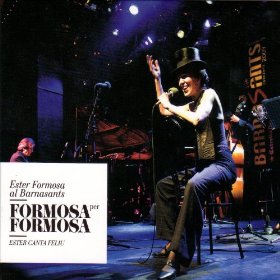 Lletra de Lili Marleen, de l'àlbum "Formosa per Formosa (Ester canta Feliu)" de Ester Formosa (2009). Traducció al catalá per Feliu Formosa i Torres.
Lletra de Lili Marleen, de l'àlbum "Formosa per Formosa (Ester canta Feliu)" de Ester Formosa (2009). Traducció al catalá per Feliu Formosa i Torres.La versione catalana di Feliu Formosa i Torres, dall'album "Formosa per Formosa (Ester canta Feliu)" della figlia Ester Formosa i Plans. (2009)
Catalan version by Feliu Formosa i Torres, from the album "Formosa per Formosa (Ester canta Feliu)" (Formosa by Formosa - Ester sings Feliu) by his daughter Ester Formosa i Plans(2009)
Lili Marleen (a vegades també anomenada Lili Marlene, Lily Marlene, Lili Marlene, etc.) és una cançó d'amor alemanya que es va fer popular a ambdós bàndols durant la Segona Guerra Mundial.

Degut a la fama que va adquirir durant la segona guerra mundial la cançó ha estat traduïda a diversos idiomes i versionada en nombroses ocasions. Una de les versions més populars és la de Marlene Dietrich. Ha estat traduïda al català per Feliu Formosa i cantada per Ester Formosa, així com per Núria Feliu amb una altra traducció.
El cineasta alemany Rainer Werner Fassbinder va fer una pel·lícula amb el mateix nom inspirada en part en aquesta cançó. - ca.wikipedia
Vora la caserna,
prop del portal gran,
Hi ha un fanal encès
on sovint ens vam parlar,
Un dia ens hi retrobarem,
prop del fanal, ens besarem,
De nou Lili Marleen,
de nou Lili Marleen.
Sols fèiem una ombra,
malgrat érem dos,
La gent que passava
mirava el nostre amor,
Un dia ens hi retrobarem,
prop del fanal, ens quedarem,
De nou Lili Marleen,
de nou Lili Marleen.
Els teus cabells rossos,
el teu caminar,
Quan arriba el vespre
els torno a recordar
I els ulls verds, sota la llum
d'aquell fanal, on vull tornar,
Amb tu Lili Marleen,
amb tu Lili Marleen.
Com més lluny em trobo,
més et sento a prop,
Quants més dies passen
l'amor és molt més fort,
I entre la boira cap el tard,
veig el fanal on vull tornar,
Amb tu Lili Marleen,
amb tu Lili Marleen.
inviata da DonQuijote82 - 19/4/2014 - 15:56

Lletra de Lili Marleen, de l'àlbum "Per raons sentimentals" de Núria Feliu (2009)
La versione catalana di Núria Feliu, dall'album "Per raons sentimentals" (Per motivi sentimentali) (2009
Catalan version by Núria Feliu, from the album "Per raons sentimentals" (For sentimental reasons) (2009)
Davant la caserna quan el dia es fon
la vella llanterna encén un altre món.
El vespre és nostre i cada nit
robem instants a l'infinit
tu i jo, Lili Marlene
tu i jo, Lili Marlene
i dins la nit fosca tots dos abraçats
fem només una ombra i els temps s'ha aturat.
Poques paraules ens diem
però sabem que ens estimen
tu i jo, Lili Marlene
tu i jo, Lili Marlene.
Passa el temps de pressa sense fer-ne esment
fins que el toc de queda desfà l'encantament.
Ens feia mal aquell adéu.
Fins a demà, dolç amor meu!
Adéu, Lili Marlene,
adéu, Lili Marlene.
inviata da DoNQuijote82 - 19/4/2014 - 15:59
Sota la llanterna, enfront del meu quarter,
sé que tu m’esperes sempre, amor meu…
Mentre murmuro el teu nom,
em bat el cor i et tinc present,
amor… Lili Marleen…
tan lluny… Lili Marleen.
Brama aquesta guerra, i ho esguerra tot,
i tinc por de perdre’m en un altre front…
Però em reconforta dir el teu nom,
i, quan el dic, et tinc a prop
si ets lluny… Lili Marleen…
tan lluny… Lili Marleen.
Cada cop que em criden per tornar a marxar,
busco entre els records la llum del teu mirar…
Sento els teus passos pel carrer,
i tot això em dóna fe
de tu, Lili Marleen…
tan lluny… Lili Marleen.
Però, mentre et perds entre el trepig,
la boira et du molt lluny de mi…
tan lluny… Lili Marleen…
molt lluny… Lili Marleen.
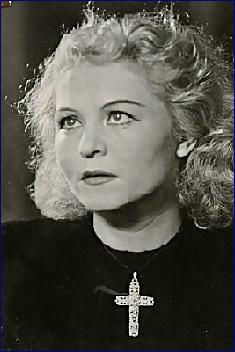
La versione è cantata da Lilly Hodáčová. Pseudonimo di Ludmila Hodáčová (1910-1998), è stata principalmente un'apprezzata attrice drammatica teatrale e cinematografica (in molti casi e in molte lingue le versioni di Lili Marleen sono state affidate a attrici più che a cantanti di professione).
Quanto al testo, invece, in Rete sono reperibili, e con molta difficoltà, solamente le prime due strofe. Addirittura è stata necessaria una ricostruzione, perché i versi sono sparsi qua e là tra due o tre siti (tra i quali uno della TV di stato ceca; sarà quindi necessaria una trascrizione all'ascolto da parte di un madrelingua ceco (le mie conoscenze della lingua non sono tali da permettermelo).
Non è chiaro il motivo di tale difficoltà nel reperimento del testo; forse, però, è dovuto al fatto che la versione è del 1942, e risale quindi in pieno al periodo di occupazione nazista. Un ricordo storico che, sicuramente, non deve essere gradito a nessun ceco. [RV]
Tam blízko kasáren
kousek za branou
spatříš v koutě starém
lucernu schovanou.
Tu svítilnu vždy vídávám,
když v dáli sám
vzpomínám jen
na svou Lili Marleen,
na svou Lili Marleen.
Tam jsme často stáli
při svitu bledém
a stíny naše se zdály
splývati v jeden.
Ten stín mohl nejlíp důkaz dát,
jak měl jsem rád
a plát chtěl jen
pro svou, Lili Marleen
pro svou, Lili Marleen.
[...]
inviata da Riccardo Venturi - 8/4/2014 - 18:27
La versione ceca proveniente da questo sito
Czech version from this site.
Původní německý text pochází z básně Píseň mladé hlídky z I. světové války od německého vojáka Hanse Leipa (narozen 22. 9. 1893 v Hamburku, zemřel 6. 6. 1983 ve Švýcarsku). Napsal tyto verše předtím, než odešel na ruskou frontu v roce 1915. Spojil v ní jméno své dívky Lili (dcera kupce), se jménem ošetřovatelky nazývané "Marleen", dívkou svého přítele, která se jednou, když byl na stráži, procházela v noční mlze.
Báseň byla vydaná v roce 1937 v jeho sbírce poezie. Tehdy upoutala pozornost Norberta Schultze (narozen 1911 v Braunschweigu, zemřel 17. 10. 2002), který ji v roce 1938 zhudebnil.
Schulze byl již bohatý a slavný, když napsal "Děvče pod lucernou", kterou očekával její milenec na kasárenské bráně. Jeho opery, filmové skladby, pochody a melodie na politické texty byly velmi úspěšné. V roce 1945 spojencům Schultze řekl, že již nechce skládat, ale opět po roce 1948 začal.
Píseň měla ale trnitou cestu. Ministr propagandy, Joseph Goebbels, ji neměl rád. Přál by si raději nějaký pochod. Zpěvačka Lale Andersenová jí nechtěla zpívat a v rozhlase jí nechtěli vysílat.
Předválečné nahrávky od Lale Andersenové se prodalo, do roku 1941, kdy jí rozhlas německých vojsk začal vysílat oddílům v Africe, pouze 700 kopií. Píseň byla tehdy v Německu zakázána pro její chmurnou náladu.
Poté co Němci začali okupovat Jugoslávii, byla zřízena rozhlasová stanice v Bělehradě, která odtud vysílala zprávy a propagandu africkým armádním sborům. Poručík Karl-Heinz Reintgen, ředitel rádia Bělehrad, měl přítele v afrických sborech, který měl tuto píseň rád. Vysílal verzi s Lale Andersenovou poprvé 18. srpna 1941. Generálu Rommelovi se píseň zalíbila a požádal rozhlas Bělehrad, aby ji začlenil do svých pravidelných vysílání. Píseň se brzy stala znělkou vysílání a byla hrána ve 21:55, když vysílání končilo. Jakmile byla vysílána rozhlasem, nemohl ji již nikdo zadržet. Spojenci také poslouchali německé rádio a Lili Marleen se stala brzy oblíbenou melodií vojáků na obou stranách, bez ohledu na jazyk.
Nesmírná popularita německé verze nutila spěchat s anglickou verzí, zvláště když britský hudební vydavatel J. J. Phillips jednou pokáral skupinu britských vojáků za zpěv v němčině. Jeden rozzlobený voják vykřikl: "Proč nenapíšete nějaký anglický text?". Phillips a britský textař Tommie Connor brzy měli anglickou verzi. Anna Sheldonová ji nahrála a tím začala její popularita ve spojeneckých zemích. Vera Lynn ji zpívala na BBC pro spojenecká vojska a britská 9. armáda ji přijala jako svou píseň.
Byla zpívána ve válečných lazaretech a vyřvávána přes frontu v obou směrech obrovskými tlampači spolu s propagandou.
Marlene Dietrichová, jak později vzpomínala, s mimořádným úspěchem vystupovala veřejně s Děvčetem pod lucernou v rozhlase a "tři dlouhé roky v severní Africe, na Sicílii, v Itálii, na Aljašce, Grónsku, Islandu a v Anglii".
Americká nahrávka, od anonymního sboru v roce 1944 udeřila na žebříčky popularity a potom opět v roce 1968. Na německé žebříčky v roce 1981 a na japonské v roce 1986.
Píseň prý byla přeložena do více než 48 jazyků, včetně francouzštiny, ruštiny, italštiny a hebrejštiny. Velice si ji oblíbil Tito v Jugoslávii.
Lili Marleene je zcela jistě nejpopulárnější válečnou písní. Její téma snění o milované osobě je univerzální. Proč je píseň tak populární? Poslední slovo má Lale Andersenová: "Může vítr vysvětlit proč se stal bouřkou?"
U vstupní brány
našich kasáren
lucerna právě
začala už plát
a pokud také dnes svítí
já opět Tě zas uvidím
zde svou Lili Marleen
Dva stíny prolnou
v jeden splývají
dny lásky naší
nepomíjejí
všichni pak spatří pod lampou
tu stálou lásku neměnnou
s krásnou Lili Marleen
Strážný povídá
potichu klepej
jinak tě vítá
katr ztemnělej,
s půlnocí musíš tady být
tak loučím se, já musím jít
sbohem Lili Marleen
Zná chůzi tvojí
kroky rozhodné
když nepřicházíš
večer uvadne.
Až jednou nepřijdu tam víc
kdo pod lampou ti zlíbá líc
krásná Lili Marleen
Od zemských strastí
až odpočinu
svobodně já snít
o tobě budu
S noční mlhou se vrátím zpět
tam pod lampu, kde byl náš svět
tenkrát s Lili Marleen.
inviata da Riccardo Venturi - 2/9/2007 - 03:23
La versione letterale cinese presente su zh.wikipedia, dalla quale è ripreso anche il commento. La trascrizione pinyin è effettuata mediante il tool di Google Translator.
The literal Chinese translation available from zh.wikipedia. The introduction is reproduced from the same page. Pinyin transcription made by using Google Translator tool. [CCG/AWS Staff]
1941年德军占领南斯拉夫,德军在贝尔格莱德开设德军广播电台,覆盖南欧和北非地区。8月18日,电台从一些废弃的唱片中找到这首德国歌曲播放,不久收到许多前线士兵来信要求重播这首歌曲。贝尔格莱德电台重播了《莉莉瑪蓮》,随后其他地区的德军电台也播放这首歌曲。由于帝国元帅格林欣赏拉莉·安德森的演唱,于是这首歌也在德国后方广为流传起来。但是纳粹宣传部长約瑟夫·戈培爾不喜欢这首歌,认为是靡靡之音,瓦解士兵斗志。1943年德军在斯大林格勒战役失败之后,戈培爾下令禁止演唱这首歌。
然而在北非的英国老兵也喜欢上了这首德国歌曲,并带回英国。1942年,英国诗人Tommy Connor为歌曲填写英文歌词,于是有了英国版的《我灯光下的莉莉》。不久这首歌又传给了法军,美军和加拿大部队,改名为《D-Day Dodgers》。1943年盟军加拿大部队唱着这首歌登陆意大利,1944年盟军也唱着这首歌登陆法国诺曼底,向德国挺进。美国为了进行抗德宣传,还请叛逃到美国的德国女演员玛莲娜·迪特里茜录制了爵士版的《莉莉瑪蓮》,在美军电台反复播放。1943年东线上的苏联也推出了苏联版《莉莉瑪蓮》。纳粹德国被《莉莉瑪蓮》包围。
拉莉·安德森(Lale Andersen)於1939年和玛莲娜·迪特里茜的唱片有助於提升歌的形象。儘管受到納粹政權,尤其是納粹的宣傳部長約瑟夫·戈培爾的反對,它仍能夠大眾化[1]。然而,在1941年佔領貝爾格萊德後,貝爾格萊德電台成為德軍無線電台並能收發信號遍及整個歐洲與地中海。它每晚9時55分都會播放安德森的唱片。在地中海附近,不論德軍還是盟軍都能定期地調整頻率聽到這首歌,更快速地增加它的知名度[1]。它的知名度就如同Waltzing Matilda一樣。Waltzing Matilda對一次大戰亦有描寫。
在兵营雄威的大门前,
那里有一座路灯。
如果它依然矗立,
我们就在灯下再次相会。
就像从前啊,莉莉玛莲,
就像从前啊,莉莉玛莲。
我们的身影交织如一体,
让每个人见证我们爱的永恒。
所有的人都将看见,
我们相会在那路灯下。
就像从前啊,莉莉玛莲,
就像从前啊,莉莉玛莲。
卫兵对我说,
归营号已吹响,
快说再见吧,兄弟,
否则三天都走不了。
分别时你对我说再呆一会吧。
想和你一起,我踌躇不前。
想和你一起啊,莉莉玛莲,
想和你一起啊,莉莉玛莲。
你熟悉我坚定的脚步声,
每夜痴痴地等候,
我来得再晚也从不怨怼。
不管我发生什么事
依然等候在那路灯下
想和你一起啊,莉莉玛莲,
想和你一起啊,莉莉玛莲。
天地间仿佛只剩下你我
你火热的双唇令我犹坠梦中
当夜雾弥漫
我将回到路灯下
就像从前啊,莉莉玛莲,
就像从前啊,莉莉玛莲。
Zài bīngyíng xióngwēi de dà mén qián,
Nà li yǒu yīzuò lùdēng.
Rúguǒ tā yīrán chùlì,
Wǒmen jiù zài dēng xià zàicì xiāng huì.
Jiù xiàng cóngqián a, lìlì mǎ lián,
Jiù xiàng cóngqián a, lìlì mǎ lián.
Wǒmen de shēnyǐng jiāozhī rú yītǐ,
Ràng měi gèrén jiànzhèng wǒmen ài de yǒnghéng.
Suǒyǒu de rén dōu jiāng kànjiàn,
Wǒmen xiāng huì zài nà lùdēng xià.
Jiù xiàng cóngqián a, lìlì mǎ lián,
Jiù xiàng cóngqián a, lìlì mǎ lián.
Wèibīng duì wǒ shuō,
Guī yíng hào yǐ chuī xiǎng,
Kuài shuō zàijiàn ba, xiōngdì,
Fǒuzé sān tiān dū zǒu bùliǎo.
Fēnbié shí nǐ duì wǒ shuō zài dāi yī huǐ ba.
Xiǎng hé nǐ yīqǐ, wǒ chóuchú bù qián.
Xiǎng hé nǐ yīqǐ a, lìlì mǎ lián,
Xiǎng hé nǐ yīqǐ a, lìlì mǎ lián.
Nǐ shúxī wǒ jiāndìng de jiǎobù shēng,
Měi yè chī chī de děnghòu,
Wǒ láide zài wǎn yě cóng bù yuànduì.
Bùguǎn wǒ fāshēng shénme shì
Yīrán děnghòu zài nà lùdēng xià
Xiǎng hé nǐ yīqǐ a, lìlì mǎ lián,
Xiǎng hé nǐ yīqǐ a, lìlì mǎ lián.
Tiāndì jiān fǎngfú zhǐ shèng xià nǐ wǒ
Nǐ huǒrè de shuāng chún lìng wǒ yóu zhuì mèng zhōng
Dàngyè wù mímàn
Wǒ jiāng huí dào lùdēng xià
Jiù xiàng cóngqián a, lìlì mǎ lián,
Jiù xiàng cóngqián a, lìlì mǎ lián.
inviata da Riccardo Venturi - 19/4/2014 - 09:44
La versione cinese ripresa da questa pagina dedicata a Marlene Dietrich. Per la conferma dell'identità del testo ci siamo serviti della voce 莉莉瑪蓮 su zh.wikipedia. La presente versione è in caratteri semplificati. La trascrizione pinyin è stata fatta mediante il tool di Google Translator.
The Chinese version reproduced from this page dedicated to Marlene Dietrich. Lyrics identity has been confirmed by comparation with the article 莉莉瑪蓮 on zh.wikipedia. The present version is in simplified characters. Pinyin transcription made by using Google Translator tool. [CCG/AWS Staff]
歌詞由Hans Leip(1893-1983)寫於一次大戰中的1915年,他當時是一名被徵召到德軍俄國前線的漢堡教師。Leip組合了他女朋友與另一名女性朋友的名稱,即莉莉與瑪蓮,詩意地組合了莉莉瑪蓮這一個人名。這首詩後來以"Das Lied eines jungen Soldaten auf der Wacht"(《一個年輕的士兵值班之歌》)的名字出版。在作者Hans Leip與Rudolf zinc為這首詩加上音樂前,诺伯特·舒尔策(Norbert Schultze)早已於1938年為它譜曲。而Tommy Connor之後寫了英文歌詞。
這首歌原本題為"Das Mädchen unter der Laterne"(德語:《提燈下的女孩》),但後來以莉莉瑪蓮而著名。
蕾兒·安德森於1939年和玛莲娜·迪特里茜的唱片有助於提升歌的形象。儘管受到納粹政權,尤其是納粹的宣傳部長約瑟夫·戈培爾 的反對,它仍能夠大眾化[1]。然而,在1941年佔領貝爾格萊德後,貝爾格萊德電台成為德軍無線電台並能收發信號遍及整個歐洲與地中海。它每晚9時55分都會播放安德森的唱片。在地中海附近,不論德軍還是盟軍都能定期地調整頻率聽到這首歌,更快速地增加它的知名度[1]。它的知名度就如同Waltzing Matilda一樣。Waltzing Matilda對一次大戰亦有描寫。
意大利的盟軍士兵後來用了莉莉瑪蓮的旋律改編歌詞成為了D-Day Dodgers。
1944年英國拍攝了一齣題為《The True Story Of Lili Marlene》(略譯:莉莉瑪蓮的真實故事)的電影。
1981年寧那·華納·法斯賓德以同一名稱拍攝了一齣虛構電影。
兵营的门前有一盏路灯,
就在路灯下初次遇上(我的)意中人,
(现在)我多么希望能再与她相见,
亲密偎依在路灯下。
我爱莉莉玛莲,
我爱莉莉玛莲。
我俩的人影重叠在一起,
人人看得出我们相爱有多深,
你看多少人羡慕我们,
亲密偎依在路灯下。
我爱莉莉玛莲,
我爱莉莉玛莲。
开拔的号声催得紧,
我要赶回去归队了,
又要(和你)分开,
在临别的时候难分难舍,
多么希望永远能在一起。
和你莉莉玛莲,
和你莉莉玛莲。
路灯也熟悉你的脚步声,
叫我怎能忘记你的笑容和倩影。
假如有一天我遭到不幸,
那么会有谁在路灯下,
等待(我的)莉莉玛莲,
等待(我的)莉莉玛莲?
深沉的黑夜四处多么寂静,
夜雾在弥漫,飘悠悠如梦境,
我从梦境里来到这里,
就想在往常一样(在路灯底下),
等待你莉莉玛莲,
等待你莉莉玛莲!
Bīngyíng de mén qián yǒuyī zhǎn lùdēng,
Jiù zài lùdēng xià chūcì yù shàng (wǒ de) yìzhōngrén,
(Xiànzài) wǒ duōme xīwàng néng zài yǔ tā xiāng jiàn,
Qīnmì wēiyī zài lùdēng xià.
Wǒ ài lìlì mǎ lián,
Wǒ ài lìlì mǎ lián.
Wǒ liǎ de rényǐng chóngdié zài yīqǐ,
Rén rén kàn dé chū wǒmen xiāng'ài yǒu duō shēn,
Nǐ kàn duōshǎo rén xiànmù wǒmen,
Qīnmì wēiyī zài lùdēng xià.
Wǒ ài lìlì mǎ lián,
Wǒ ài lìlì mǎ lián.
Kāibá de hào shēng cuī de jǐn,
Wǒ yào gǎn huíqù guīduìle,
Yòu yào (hé nǐ) fēnkāi,
Zài línbié de shíhou nán fēn nán shě,
Duōme xīwàng yǒngyuǎn néng zài yīqǐ.
Hé nǐ lìlì mǎ lián,
Hé nǐ lìlì mǎ lián.
Lùdēng yě shúxī nǐ de jiǎobù shēng,
Jiào wǒ zěn néng wàngjì nǐ de xiàoróng hé qiànyǐng.
Jiǎrú yǒu yītiān wǒ zāo dào bùxìng,
Nàme huì yǒu shuí zài lùdēng xià,
Děngdài (wǒ de) lìlì mǎ lián,
Děngdài (wǒ de) lìlì mǎ lián?
Shēnchén de hēiyè sìchù duōme jìjìng,
Yè wù zài mímàn, piāo you yōu rú mèngjìng,
Wǒ cóng mèngjìng lǐ lái dào zhèlǐ,
Jiù xiǎng zài wǎngcháng yīyàng (zài lùdēng dǐxia),
Děngdài nǐ lìlì mǎ lián,
Děngdài nǐ lìlì mǎ lián!
inviata da Riccardo Venturi - 7/9/2008 - 00:56
The following is a literal translation of Lili Marleen in the Korean language, reproduced from Dr. Choi's Blog. No rhythmic Korean version has been found yet. The transcription is made according the McCune-Reischauer system by using ushuaia.pl transcription tool. [CCG/AWS Staff]
Le seguenti note in coreano provengono da ko.wikipedia
The following notes in Korean are reproduced from ko.wikipedia:
릴리 마를렌(Lili Marleen, 또는 Lili Marlene, Lili Marlène 등으로 불림)"은 제2차 세계 대전 당시 양 진영 모두에서 유명해진 독일의 사랑 노래이다.
가사는 1915년 제1차 세계대전 당시 독일 제국군에 징집된 함부르크 출신의 한스 라이프(Hans Leip, 1893-1983)이 썼으며, 들리는 바에 의하면 제목은 그의 애인인 릴리와 군 간호사 마를렌의 이름을 조합했다고 한다. 이것은 1939년 랄레 안데르센(Lale Andersen)에 의해 녹음되었다.
후에 1941년 독일군방송이 된 벨그라데 라이오 방송(Radio Belgrade)이 음반 더미에서 이 앨범을 찾아냈고, 다른 음반의 부족으로 이 음악을 빈번히 틀었다고 한다. 나치 정부의 선전 장관 요제프 괴벨스 (Joseph Goebbels)는 이 음악을 방송금지 명령했으나, 이 음악을 다시 틀어달라는 군인들의 편지가 방송국에 쏟아져 들어오자, 요제프 괴벨스는 마지못해 자신의 마음을 바꾼다. 이때부터 이 노래는 9:55PM에 방송되고 그것의 인기는 급상승한다.
최초의 영어 녹음은 아마도 앤 셜튼(Anne Shelton)이 했을테지만, 이후 많은 버전들이 나왔다. 1940년대 후반과 1950년대 초 "릴리 마를렌"은 마를렌 디트리히(Marlene Dietrich)에 의해 독일어와 영어로 녹음되었다.
1980년에 파스빈더는 릴리 마를렌(Lili Marleen)이라는 제목으로 영화를 찍는데, 이 영화는 랄레 안데르센의 이야기와 그녀가 부른 버전의 노래를 들려주는데 초점을 맞춘다.
가로등이 하나 밝혀져 있고 그녀는 여전히 그 앞에 서 있네.
거기서 우리는 다시 만나고자 하네,
가로등 옆에서 우리는 서 있고자 하네,
언젠가 그랬듯이 릴리 마를렌, 언젠가 그랬듯이 릴리 마를렌.
우리 둘의 그림자, 우린 마치 한 사람처럼 보였네,
우리가 서로 사랑한다는 걸 모두가 금방 알아차렸네.
그리고 우리가 가로등 옆에 서면,
모든 사람들이 그걸 봐야 하네,
언젠가 그랬듯이 릴리 마를렌, 언젠가 그랬듯이 릴리 마를렌.
초병이 소리쳤네: “소등나팔이 울려!
(안들어오면) 일 영창행일지도 몰라!!” – “전우여, 곧 돌아올께!”
우리는 작별인사를 했네,
내가 그대와 떠나길 얼마나 원했던가,
그대와 함께 릴리 마를렌, 그대와 함께 릴리 마를렌.
가로등은 그대의 발걸음을 아네, 그대의 아름다운 걸음걸이를.
매일 저녁 가로등은 불타지만, 그녀는 오래전에 나를 잊었네.
그리고 나는 고통을 느껴야 했네,
누가 가로등 옆에 서 있을 것인가?
그대와 함께 릴리 마를렌, 그대와 함께 릴리 마를렌.
사랑에 빠진 너의 입은 꿈을 꾸듯,
조용한 공간에서, 땅바닥에서 솟아오르네.
늦은 안개가 되돌아갈 때,
누가 가로등 옆에 서 있을 것인가,
그대와 함께 릴리 마를렌, 그대와 함께 릴리 마를렌.
karodŭngi hana palkhyŏjŏ ikko kŭnyŏnŭn yŏjŏnhi kŭ ape sŏ inne.
kŏgisŏ urinŭn tasi mannagoja hane,
karodŭng yŏpesŏ urinŭn sŏ ikkoja hane,
ŏnjen’ga kŭraettŭdi illi marŭllen, ŏnjen’ga kŭraettŭdi illi marŭllen.
uri turŭi kŭrimja, urin mach’i han saramch’ŏrŏm poyŏnne,
uriga sŏro sarangandanŭn kŏl moduga kŭmbang arach’aryŏnne.
kŭrigo uriga karodŭng yŏpe sŏmyŏn,
modŭn saramdŭri kŭgŏl pwaya hane,
ŏnjen’ga kŭraettŭdi illi marŭllen, ŏnjen’ga kŭraettŭdi illi marŭllen.
ch’obyŏngi sorich’ŏnne: “sodŭngnap’ari ullyŏ!
(andŭrŏomyŏn) il yŏngch’angaengilchido molla!!” – “chŏnuyŏ, kot toraolkke!”
urinŭn chakpyŏrinsarŭl haenne,
naega kŭdaewa ttŏnagil ŏlmana wŏnhaettŏn’ga,
kŭdaewa hamkke illi marŭllen, kŭdaewa hamkke illi marŭllen.
karodŭngŭn kŭdaeŭi palgŏrŭmŭl ane, kŭdaeŭi arŭmdaun kŏrŭmgŏrirŭl.
maeil chŏnyŏk karodŭngŭn pult’ajiman, kŭnyŏnŭn oraejŏne narŭl idŏnne.
kŭrigo nanŭn kot’ongŭl nŭkkyŏya haenne,
nuga karodŭng yŏpe sŏ isŭl kŏdin’ga?
kŭdaewa hamkke illi marŭllen, kŭdaewa hamkke illi marŭllen.
sarange ppajin nŏŭi ibŭn kkumŭl kkudŭt,
choyongan kongganesŏ, ttangbadagesŏ sodaorŭne.
nŭdŭn an’gaega toedoragal ttae,
nuga karodŭng yŏpe sŏ isŭl kŏdin’ga,
kŭdaewa hamkke illi marŭllen, kŭdaewa hamkke illi marŭllen.
inviata da Riccardo Venturi - 20/4/2014 - 01:34

Croatian version from Vlado Kreslin's concert in Ljubljana - Gallusova dvorana, Čankarjev dom
Tamo pred kasarnom, pored glavnih vrata,
gdje stoji lanterna, još od starih dana:
pod njenim svjetlom žutim,
opet ću uzet' te za ruku,
kao nekad, Lili Marlen,
kao nekad, Lili Marlen,
Tamo je mali svijet, samo za nas dvoje
gdje se tvoja sjenka s mojom zaigra.
Sad neka svi vide da to je rastanak,
s tobom, Lili Marlen,
s tobom, Lili Marlen.
Tvoj korak samotno odzvanja u tami,
a mog već odavno nema pod svjetlom,
i dok svitanje tamu tjera,
ko će se pod lanternom sresti
s tobom, Lili Marlen,
s tobom, Lili Marlen.
U vjetru nad grobljem što dahta na sve nas
Kao kroz san, čuje se tvoj glas,
i kada će svitanje maglu rastjerati,
ja ću opet pod lanternu stati,
s tobom, Lili Marlen,
s tobom, Lili Marlen.
inviata da Monia Verardi - 4/8/2005 - 00:31
Il commento è ripreso da un articolo di Svanibor Pettan (per i riferimenti si veda il brano in inglese riportato nel seguito), che vuole mettere in risalto l'esistenza di due tipologie distinte nelle canzoni cantate in quel periodo in Croazia: le canzoni "ufficiali", dai toni più blandi e caratterizzate da una certa professionalità nell'arrangiamento, venivano trasmesse dalla televisione e dalle radio di stato, mentre le canzoni "alternative", che utilizzavano mezzi di diffusione non ufficiali (spesso cassette pirata) e presentavano una limitata capacità musicale, erano per lo più delle vere e proprie canzoni a favore della guerra, intrise di odio per il nemico (serbo, chiamato spesso dispregiativamente "čedo", cetnico).
D'altra parte anche le canzoni ufficialmente pacifiste (si veda ad esempio Stop the War in Croatia) erano comunque utilizzate per far passare l'idea che la Croazia fosse esclusivamente la vittima dell'offensiva serba e stesse lottando per la propria libertà.
La versione ufficiale di Lili Marleen di Norbert Schultz (in croato "Čekam te", Ti aspetto) divenne conosciuta in Croazia in seguito al suo adattamento e interpretazione di sette attrici di Zagabria (ZG glumice / Le Cinema featuring Anja Šovagović). Partendo come una dolce e intima canzone sull'addio tra un uomo che deve andare al fronte e una donna che promette di aspettare il suo ritorno, la canzone gradualmente, dalla prima all'ottava strofa, diviene meno intima e alla fine lancia una speranza di un futuro migliore per la Croazia una volta che abbia conquistato la libertà.
Qui di seguito si riporta la trascrizione completa della prima versione, spesso trasmessa in radio e televisione (1) e due strofe della seconda, opera di uno sconosciuto con capacità musicali molto limitate, caratterizzata da arrangiamenti, produzione e suono molto poveri (2).
Se la prima versione non può essere certo definita una canzone contro la guerra (la Lili Marlene croata che dice "insieme a te voglio difendere il nostro popolo" tradisce tutto lo spirito della canzone originale), la seconda "versione maschile" è ancora più guerrafondaia. La seconda versione è probabilmente una risposta alla prima "versione femminile", una specie di sua (tristissima) parodia intrisa di nazionalismo e di odio per il nemico (serbo).
Riportiamo queste due versioni, ovviamente, solo come documento storico.
Seguono la traduzione italiana e inglese delle due versioni.
Trascrizione all'ascolto delle strofe centrali della prima versione di Monia Verardi.
The following two Croatian versions of Lili Marleen were popular during the Yugoslav wars in the 90s. As the following extract states, there were two different types of songs in Croatia during those years. The "official" ones were widely broadcasted by the state television and radio while the "alternative" ones were published in pirate tapes, and were often full of hate towards the enemy.
(Svanibor Pettan, Music, politics, and war in Croatia in the 1990s: an introduction, in "Music, politics and war: views from Croatia")
Obviously these versions cannot be considered "antiwar songs". In the first one the Croatian Lili Marlen "wants to defend" her country together with her beloved soldier, while the second is a very sad parody which is actually a pro-war song. We report them only as historical document.
The two versions are followed by English and Italian translations.
Dan polako sviće,
blijedi ova noć
iz zagrljaja moga
na front ti moraš poć'
ali ma gdje bio s s tobom je
i mjesec naš i zvijezde sve
i znaj da čekam te
i znaj da čekam te
ti otvaraš vrata
ti otkucaj sad
ne gledaj me tako
do tek je kiše kap
idi sada dušo jutro je
idi sad ne gledaj me
al' znaj da čekam te
al' znaj da čekam te
jedna nova jutra
zauvijek će proć'
i veteran (?) ti ćes meni doć'
ali sad ću poslat andjele
da kazu ti da ljubim te,
da znaš da čekam te
da znaš da čekam te
kad se noću budi
tebe nema tu
ja osjećam tvoj dodir,
čežnju tvoju svud
vratit ćes dragi k meni ti
i naše san oživjeti
i znaš da ja to znam
i znas da tvoja sam
sanjam tvoje oči
tvoje ošljive
sanjam tvoje lice
tvoje cijelove
tebe noćas svud je zvijezdice
i mjesec naš i krijesnice
i noći daleke
i noći daleke
neka moja pjesma
tebi snage da
i znaj da samo tvoja
tvoja ja sam sva
nikome te ne dam voljeni
i sretni bit ćemo opet mi
i ja cu čekati za tebe živjeti
ne dam svoju zemlju,
sela, gradove
ne dam naše šume,
pola, domove
ne dam našu lijepu Hrvatsku
i s tobom sad ja branim ljud'
i znaj da čekam te
i znaj da čekam te
i srušene će kuce opet stajati
i svako će se dijete opet smijati
i nasu pjesmu čut ce svi
jer Hrvatska to svi smo mi
nek' ljubav pobjedi
2. PARODIA GUERRAFONDAIA / PRO-WAR PARODY
Dan se završava,
počinje već noć,
prek' Bošuta Čedo
pokusat će proć
ali neka zna da
čekam ga ja
i moja strojnica
i hrpa metaka
Dan polako svice,
blijedi ova noć,
prek' Bošuta Čedo
nije mog'o proć
zauvijek ce mrtav ostat' tu,
u tome hladnom Bošutu,
a ja ću živjeti
i Hrvatsku braniti
inviata da Monia - 4/8/2005 - 00:56
English version of "Čekam te": first and last verse from the article by Svanibor Pettan; central verses translated by Lorenzo Masetti (from the italian version)
Versione italiana della parodia guerrafondaia di Lorenzo Masetti (dalla versione inglese)
English version of the pro-war parody from the aricle by Svanibor Pettan
Il giorno se ne sta andando, la notte impallidisce
ti devi staccare dal mio abbraccio per andare al fronte ma dovunque tu sia
la nostra luna e tutte le stelle saranno con te
e sappi che ti aspetterò
tu apri la porta e ora la chiudi dietro di te
non guardarmi mentre sto piangendo
vai caro, è mattino
vai e non guardarmi
ma sappi che ti aspetterò
ogni nuovo giorno comunque passerà
e tu veterano tornerai da me
ma ora manderò degli angeli
per dirti che ti amo, così che tu sappia che ti aspetterò, che tu sappia che ti aspetterò
quando arriva la notte e tu non sei qui
io sento il tuo tocco, il tuo desiderio
tu caro tornerai da me
per rivivere i nostri sogni
e sappi che io lo so
e sappi che io sono tua
sogno i tuoi occhi le tue carezze (?)
sogno la tua faccia e tutto il tuo corpo
in questo momento starai vedendo le stelle, la nostra luna e le stelle cadenti
e le notti ormai lontane
che la mia canzone ti dia forza
e che tu sappia che io sono solo tua
non ti dare a nessuna
e saremo di nuovo felici
e io aspetterò per vivere per te
non cedo la nostra nazione, villaggi, città
non cedo le nostre foreste, campagne, case
non cedo la nostra bella Croazia
e ora insieme a te voglio difendere il nostro popolo
e sappi che ti aspetterò
e così le case saranno rimesse in piedi,
e ogni bambino riderà di nuovo
e la nostra canzone la sentiranno tutti
perché la Croazia siamo tutti noi
che l'amore vinca
1. I'M WAITING FOR YOU
The day slowly replaces the night,
you have to leave me and go to the front line
wherever you are, our moon and stars will be with you
and remember that
I am waiting for you
you open the door and close it behind you
don't look at me while I'm crying
go, my dear, it's morning
go, and don't look at me
but remember that
I am waiting for you
Each new day will go by anyway
and you, veteran, will come back to me
but now I'll send you some angels
to say that I love you,
so that you know
that I'm waiting for you,
I'm waiting for you
when the night comes
and you're not here
I feel your touch, your desire
you'll come back to me, my dear
to live our dreams once again
and remember I know
and remember I'm yours
I dream your eyes, and your caresses
I dream your face, and all your body
in this moment maybe you're seeing the stars,
our moon and the shooting stars
and far-off nights by now
let my song give you strenght
and remember I'm only yours
don't give yourself to any woman
and we'll be happy again
and I'll wait for living for you
I don't give away our nation, our villages and towns
I don't give away our forests, countryside and houses
I don't give our beautiful Croatia away
and now with you I want to defend our people
and remember
I am waiting for you
and the destroyed houses
will be built again,
and every child will laugh again
and our song will be heard everywhere,
because Croatia - that is all of us,
let love be winner.
2. PARODIA GUERRAFONDAIA
Il giorno finisce,
comincia la notte
Čedo (il Cetnico) proverà
a passare il fiume Bošut
ma dovrebbe sapere
che lo sto aspettando,
insieme alla mia mitragliatrice
e alle pallottole
Il giorno se ne sta andando,
la notte impallidisce
Čedo non è riuscito a passare il Bošut
starà nel freedo Bošut per l'eternità,
mentre io vivrò
e difenderò la mia Croazia.
2) PRO-WAR PARODY
The day ends up,
the night begins,
Čedo (Chetnik) will try
to pass the Bošut river
but he should know
that I am waiting for him,
together with my machine-gun and bullets
the day slowly replaces the night,
Čedo was unable to pass Bošut
he will stay in the cold Bošut forever,
while I will live
and defend my Croatia.
La versione danese di Emil Damvig (1942) interpretata da Elsa Sigfuss assieme all'orchestra di Aage Juhl-Thomsen (Odeon D-512)
The Danish version by Emil Damvig (1942) recorded by Elsa Sigfuss with Aage Juhl-Thomsen's Orchestra (Odeon D-512)
Teksten til “Lili Marleen” blev skrevet af Hans Leip i 1915. Hans Leip (1893-1983), var en skolelærer fra Hamburg der var blevet indkaldt til den Kejserlige Tyske Hær. Navnet “Lili Marleen” er angiveligt sammensat af navnene på hans kæreste og en anden kvindelig ven. Sangen blev senere udgivet som "Das Lied eines jungen Soldaten auf der Wacht" ("Sangen om en ung soldat på vagt"). Norbert Schultze satte musik til i 1938.
Sangen var oprindeligt kaldt "Das Mädchen unter der Laterne" (tysk for "Pigen under gadelygten"), men den blev kendt som "Lili Marleen".
Kort før Anden Verdenskrig i 1939 indspillede Lale Andersen den og senere hjalp Marlene Dietrich med at gøre sangen populær. En popularitet den opnåede på trods af modstand fra Naziregimet og i særdeles modstand fra propagandaministeren Joseph Goebbels som endda på et tidspunkt prøvede at forbyde den. Efter tyskerne havde indtaget Beograd i 1941 blev Radio Beograd omdannet til de tyske styrkers radiostation og kunne høres over hele Europa og langs Middelhavet. Efter opfordring af Erwin Rommel begyndte radiostationen at spille Andersens Lili Marleen optagelse hver aften 21:55 og både tyske og allierede soldater omkring Middelhavet lyttede regelmæssigt med. - dk.wikipedia
"Sangen blev ubestridt den mest populære under 2. verdenskrig. Den originale tyske tekst stammer egentlig fra 1. verdenskrig, hvor den 21-årige Hans Leip skulle til fronten og savnede sine to veninder Lili og Marleen. Sangerinden Lale Andersen var ikke særlig kendt i Tyskland, da hun indspillede 'Lied eines jungen Wachtpostens' i 1939; men i 1941 sendtes den første gang ud i æteren fra den populære radiostation Soldatensender Belgrad, der kunne nå ud til alle de tyske soldater, og derefter blev sangen brugt til at afslutte dagens udsendelser med. Det betød umådelig succes for Lale Andersen, indtil hendes brevveksling med jødiske venner i Schweiz blev opdaget af Gestapo, og sangen blev blacklistet i 1942. Derefter røg Lale Andersen ud i kulden med et efterfølgende selvmordsforsøg. Sangen kom også til at spille en lille rolle i Danmark under besættelsen. Den blev ofte sunget på teksten:
i det ene ben,
og så ta'r vi Gobbels
og slår dem mod en sten,
Hitler skal hænges i en strop
ved siden af von Ribbentrop,
så bli'r de rent til grin
- de fire nazisvin.
Dette medførte et forbud mod at spille og synge sangen i Danmark, da tyskerne aldrig kunne være sikre på, hvilken tekst danskerne sang den på." - festabc.dk
På den stolte skude
fjernt fra hjemmets strand
står den tavse sømand
og længes hjem i land.
Tænker, mens skibet står mod nord,
på den, som i hans hjerte bor,
på sin Lili Marleen,
kun om Lili Marleen.
Det var på en knejpe
i Marseilles havn,
at han pluds'lig hørte
det nu så søde navn;
mændene talte kun om een
med ravnsort hår og slanke ben,
kun om Lili Marleen,
kun om Lili Marleen.
Det var kærlighed ved
første øjekast,
men i dag så står han
med hende last og brast;
for da han fried', fik han ja,
og han blev gift den næste da'
med sin Lili Marleen,
med sin Lili Marleen.
Og når fra det fjerne
Peter vender hjem,
er en grøn lanterne
det tegn, der viser frem.
Han ved, når rejsen, den er endt,
så står hun dér og venter spændt,
hans eg'n Lili Marleen,
hans eg'n Lili Marleen.
inviata da Riccardo Venturi - 25/3/2005 - 18:28
The Hebrew version by Avraham 'Oz (1982)
להלן הגרסה העברית לשיר, בתרגום אברהם עוז - 1982

Che di Lili Marleen esista una versione anche in lingua ebraica, è naturalmente assai indicativo del valore davvero universale di questa canzone. Tra tutte le lingue in cui una canzone tedesca musicata da un compositore di chiare simpatie naziste come Norbert Schultze poteva essere tradotta, l'ebraico è naturalmente la meno probabile; eppure c'è. E non stupisce chi sia il traduttore: Avraham 'Oz lo conosciamo fin dalla primissima pagina di questo sito, dato che il professore e attivista pacifista (e antisionista) di Haifa è autore anche della traduzione ebraica del Disertore. La sua traduzione di Lili Marleen è del 1982.
The fact that there's also a Hebrew version of Lili Marleen is obviously a clear sign that its nature is really universal. Hebrew wasn't too likely to be a language a German song set to music by a composer like Norbert Schultze, clearly sympathizing with Nazism, could be translated into; yet it has been. You shouldn't be amazed at the translator's name: we know Avraham 'Oz since the very first page of this site, for the university teacher and peace (and anti-Zionist) activist of Haifa is also the author of the Hebrew translation of Le déserteur. He made his translation of Lili Marleen in 1982. [CCG/AWS Staff]
Le seguenti note in ebraico provengono da he.wikipedia
The following notes in Hebrew are reproduced from he.wikipedia:
לילי מרלן (בגרמנית: Lili Marleen) הוא שיר גרמני מפורסם, אשר הפך לפופולרי ביותר משני עברי החזית במהלך מלחמת העולם השנייה. השיר עוסק בלילי מרלן, נערתו של חייל הממתינה לו מתחת לפנס בשער הבסיס, בפרידתם עם הישלחו לחזית ובגעגועיו העזים לנערתו אשר נותרה בעורף. השיר קצבי (אך אינו מארש) ונוגה.
מילות השיר נכתבו בשנת 1915, במהלך מלחמת העולם הראשונה, בידי הנס לייפ (Hans Leip; 1893 - 1983), מורה מהאמבורג שגויס לצבא האימפריאלי הגרמני. השיר התפרסם מאוחר יותר בשם "שירו של חייל צעיר על משמרתו" או "שירו של זקיף צעיר" (Das Lied eines jungen Soldaten auf der Wacht) והולחן בשנת 1938 בידי נורברט שולצה (Norbert Schultze). שמו המקורי של השיר המולחן היה "הנערה מתחת לפנס" (Das Mädchen unter der Laterne), אך הוא נודע בשמה של גיבורת השיר, לילי מרלן.
הצלחתו
ביצוע השיר בשנת 1939 בידי לאלה אנדרסן, וכן בידי מרלן דיטריך, סייעו לפופולריות הגואה של השיר. זאת על אף התנגדות לו מצד המפלגה הנאצית, ובמיוחד התנגדותו של יוזף גבלס, שר התעמולה הממונה על התעמולה הנאצית, אשר הובילו אף לאיסור השמעתו של השיר בראשית שנות ה-40 בשל המסר האנטי-מלחמתי המשתמע ממילות השיר. לאחר כיבוש בלגרד בידי גרמניה בשנת 1941, הפך רדיו בלגרד לתחנת שידור של הצבא הגרמני ששידוריה נקלטו ברחבי אירופה והמזרח התיכון. התחנה שידרה את השיר לראשונה ב- 18 באוגוסט 1941 והגנרל פלדמרשל ארווין רומל, ששמע את השיר ואהב אותו, הורה לתחנה לשלבו באופן קבוע בשידוריה. כתוצאה מכך שידרה התחנה את השיר בביצועה של אנדרסן, שהפך לסימן ההיכר של התחנה, בכל ערב בשעה 21:55 והפכה את השיר לפופולרי ביותר, תחילה בצפון אפריקה, ולאחר מכן בכל החזיתות.
השיר אומץ בידי חיילי בעלות הברית בחזית האיטלקית, ולחנו שימש לשיר ה-D-Day Dodgers. גרסה אנגלית של השיר בוצעה לראשונה, ככל הנראה, בידי אן שלטון (Anne Shelton) אולם במהרה הופיעו לו גרסאות כיסוי רבות. השיר עובד לגרסאות בכ- 50 שפות שונות, וחודש שוב ושוב גם לאחר סיום המלחמה. השיר הגיע למקום ה-13 במצעד הפזמונים האמריקאי בשנת 1944 ונכנס לרשימה שנית בשנת 1968. השיר נכנס לרשימת השירים המושמעים גם בגרמניה בשנת 1981 וביפן ב- 1986. גרסת הכיסוי החדשה ביותר לשיר הוקלטה בידי להקת The Divine Comedy האירית ב-2006. חברת התקליטים העצמאית Bear Family הוציאה אוסף מיוחד בן 7 תקליטורים ובו 195 גרסאות שונות לשיר.
השיר תורגם לשפות רבות, בין השאר - תורגם לעברית על ידי זאב גייזל ואברהם עוז. שרון חזיז הקליטה לראשונה בעיבוד פופ את השיר בעברית ב-1995 באלבומה "בת הקוסם" ובתרגום של אהוד מנור
מוּל פְּנֵי הַשַּׁעַר
מוּל צְרִיפֵי הַגְּדוּד
שָׁם נִצַּב אֵי פַּעַם
פַּנָּס בְּרֹאשׁ עַמּוּד.
אִם שָׁם בַּחוּץ פַּנָּס עוֹד יֵשׁ,
שׁוּב לְיָדוֹ עוֹד נִפָּגֵשׁ
כְּמוֹ אָז, לִילִי מַרְלֶן.
שְׁנֵי צִלֵּי גּוּפֵנוּ
יֵרָאוּ אֶחָד,
עָצְמַת אַהֲבָתֵנוּ
גְּלוּיָה לַכֹּׁׁל מִיָּד.
אֵיךְ עוֹד נֹאהַב וְנִתְרַגֵּשׁ
יִרְאוּ כֻּלָּם כְּשֶׁנִּפָּגֵשׁ
כְּמוֹ אָז, לִילִי מַרְלֶן.
שׁוּב קוֹרְאִים לַדֶּגֶל:
יוֹצְאִים לִפְעֻלָּה!
אִי אֶפְשָׁר לָסֶגֶת,
פְּרִידָה כֹּה אֻמְלָלָה!
שָׁמָּה מַמְתִּין לִי הַתּוֹתָח,
אֲבָל עָדִיף לִהְיוֹת אִתָּךְ
אִתָּךְ, לִילִי מַרְלֶן.
הַפַּנָּס יוֹדֵעַ
אֶת שֵׁמַע כַּף רַגְלֵךְ,
וַאֲנִי גּוֵֹעַ
כֹּה רָחוֹק מִמֵּךְ.
אִם לֹא אָשׁוּב, אִמְרִי: מִי אָז
יִפְגּשׁ אוֹתָךְ מוּל הַפַּנָּס?
כֵּן, מִי, לִילִי מַרְלֶן?
גַּם מִן הַשֶּׁקֶט
בֵּין שׁוֹכְנֵי עָפָר
עוֹד נַפְשִׁי חוֹשֶׁקֶת
בְּפִיךְ הַנֶּהְדָּר.
וּכְשֶׁהָאֹפֶל יִתְפַּזֵּר
אֲנִי אֶל הַפַּנָּס חוֹזֵר
כְּמוֹ אָז, לִילִי מַרְלֶן.
Mul pney hashe'er
mul tsrifey hagdud
shan nitsev ey pe'em
penas brish 'emud.
Im sham behuts penas 'od esh,
shuv lyado 'od nipagesh
kmo az, Lili Marlen.
Shney tsilay gufenu
yiru ekhad,
'atsmet ehavatenu
gluya lekhol miyad.
Eykh 'od nihev venitregesh
yiru klam kshenipagesh
kmo az, Lili Marlen.
Shum korayim ledegel:
yotsayim lif'ela!
Yi efshar laseget,
prida ko emlala!
Shana memtin li hetotakh,
eval 'adikh lihyot itakh,
kmo az, Lili Marlen.
Hepenas yodea'
et sheme' kef reglekh,
veani goe'
ki rakhok mimekh.
Im lo ashuv, imri: mi az
yifgesh otakh mul hepenas?
Kmo az, Lili Marlen?
Gem min hesheket
beyn shokhney 'afar
'od nefshiy khosheket
bfikh henehdar.
Ukhshehayifel yitpezer
ani el hepenas khozer
kmo az, Lili Marlen.
inviata da Riccardo Venturi - 20/4/2014 - 00:45
Versione in esperanto
Esperanto version
Germane verkis Hans Leip, 1915
Esperanta teksto laŭ Kantfesto I, 1982
Melodion komponis Norbert Schultze, 1938
Tiu ĉi germana poemo el la Unua Mondmilito fariĝis la plej furora kanto de la Dua Mondmilito ĉe la simplaj soldatoj ĉe ambaŭ flankoj de la okcidenteŭropa/afrika milita teatro (mi ne scias, kiomagrade ĝi populariĝis ĉe la Ruĝa Armeo aŭ en la azia/pacifika teatro. Kondamnite de la nazioj, kaj samtempe rigardate de aliancaj estroj kiel germana propagandaĵo, tiu ĉi sentimentale sopira amkanto tamen fidele spegulis la sentojn kaj sintenojn de la ordinaruloj en la armeoj, kaj montris la esencan transfrontan homfratecon de la malamikoj.
"Lili Marleen estas kanto, de kiu la teksto en 1915 estis verkita de la germana soldato Hans Leip. La teksto deriviĝis de la poemo Das Lied eines jungen Soldaten auf der Wacht (La kanto de juna soldato dum la gardodeĵoro). La kanto atingis grandan furoron kiam ĝi en 1942 reeldoniĝis. Sufiĉe stranga estas ke ĝi tre populariĝis kaj en Germanio kaj inter la aliancanoj. Ekde tiam ĝi estas multfoje reeldonita, inter aliaj de Marlène Dietrich kaj Lale Andersen." (eo.wikipedia)
Brilis lampo hele ĉe kazerna pord',
Lumis ĝi fidele en ĉiutaga ord'.
Sur trotuara ŝton-eben',
Renkontis vin mi dum promen'
Kun ĝoj', Lili' Marlene,
Kun ĝoj', Lili' Marlen'.
Ni premiĝis kune, manon tenis man',
Ŝtelis mi sublune kiseton el Nirvan'.
Kaj siblis vent' kun akra pen',
Sed brilis lamp' por nia ben',
Ni du, Lili' Marlene,
Ni du, Lili' Marlen'.
Vokas la gardisto: "Venu!" Jen signal',
Helpas ne rezisto, ĝi gvidas al fatal'.
Kun pez' mi paŝas al kusen',
Sub lamp' mi restus en katen'
De vi, Lili' Marlene,
De vi, Lili' Marlen'.
Mi en koro ardas pro sopir' al vi.
Reven vin rigardas kaj ĉarme ridas vi,
Tra la kuraĝa larm-reten'
Dum ĝis-revid' en lamp-seren'
Do ĝis, Lili' Marlene,
Do ĝis, Lili' Marlen'.
inviata da Riccardo Venturi - 15/6/2005 - 03:54
Versione estone anonima.
Estonian version. The author is unknown.
This version has been also performed by Vennaskond with some slight differences in the lyrics.
""Lili Marleen" on maailmakuulus laul, mille sõnad kirjutas saksa kirjanik ja luuletaja Hans Leip 1915. aastal enne Idarindele saatmist, ja viisi Norbert Schultze 1938. aastal.
Laulu tegi tuntuks 1939. aastal Lale Andersen. Hiljem, 1943. aastal laulis seda Marlene Dietrich ameerika sõduritele inglise keeles. Laulu lauldi Teise maailmasõja lõpus mõlemal pool rindejoont." (et.wikipedia)
Kasarmu ees väraval,
öisel kõnniteel
latern tookord säras,
ta särab nüüdki veel.
Ja ootab, et me tema all
taas kohtuksime tänaval,
kui kord, Lily-Marleen,
kui kord, Lily-Marleen.
Latern oma kaitsel
õnned ühendas,
kaunil tunnil vaiksel
me varjud ühendas.
Mis sest, et rahvas möödus meist,
me nägime vaid teineteist,
mu neid, Lily-Marleen,
mu neid, Lily-Marleen.
Juba lahku viiski
signaal meid õnneteelt,
kolm päeva kartsa siiski
ei julgustanud meelt.
Ehk küll su juurde ihkasin
ja lahkumist ma vihkasin,
mu arm, Lily-Marleen,
mu arm, Lily-Marleen.
Latern sinu sammu
tunneb ikka veel,
kuigi mina ammu
viibin kaugel teel.
Ja ootab et me tema all
taas kohtuksime tänaval,
mu neid, Lily-Marleen,
mu neid, Lily-Marleen.
Kui mul uni laugel
öisel puhkusel,
tõotan sulle kaugelt
kaitsekraavist veel.
Kui igav hakkab laternal,
sind ootan jälle tema all,
kui siis, Lily-Marleen,
kui siis, Lily-Marleen.
inviata da Riccardo Venturi - 25/3/2005 - 18:37
Vennaskond, Lily Marlene
The version as performed by Vennaskond, showing slight differences in the lyrics. We reproduce it from Sasslantis 2000.
Kasarmu ees tänaval,
öisel kõnniteel
latern tookord säras,
ta särab nüüdki veel
Ja ootab et me tema all
taas kohtuksime tänaval,
kui kord Lily Marlene,
kui kord Lily Marlene.
Latern oma kaitsel
me õnne pühendas
kauni tunni maitsel
me varjud ühendas
Mis sest, et rahvas möödus meist
me nägime vaid teineteist
mu neid Lily Marlene,
mu neid Lily Marlene.
Juba lahku viiski
signaal me õnneteelt
kolm päeva kartsa siiski
ei julgustand mu meelt
ehk küll su juurde ihkasin
ja lahkumist ma vihkasin
mu tüdruk Lily Marlene,
mu tüdruk Lily Marlene.
Latern sinu sammu
tunneb ikka veel
kuigi mina ammu
viibin kaugel teel
Ja ootab et me tema all
taas kohtuksime tänaval
mu neid Lily Marlene,
mu neid Lily Marlene.
Kui mul uni laugel
öisel puhkusel
tõotan sulle kaugelt
kaitsekraavist veel
Kui igav hakkab laternal
sind ootan jälle tema all
kui siis Lily Marlene,
kui siis Lily Marlene.
inviata da CCG/AWS Staff - 8/5/2009 - 04:53
Versione finlandese di Kerttu Mustonen.
Una delle poche versioni dove Lili Marleen cambia del tutto nome: si chiama infatti "Liisa". E' stata interpretata per la prima volta nel 1943 dal cantante Georg Malmstén (probabilmente l'unico uomo che l'ha mai cantata, perché usualmente la canzone è affidata a una voce femminile).
Finnish version by Kerttu Mustonen.
One of the few versions in any language where the girl has a totally different name: "Liisa". It was first interpreted 1943 by the Singer Georg Malmstén (probably the only man who has ever sung it: traditionally, the song is interpreted by a woman).

Kerttu Mustonen (1891-1959) è stata un'apprezzata cantante finlandese; cosi pure Georg Malmstén (1902-1981). Quest'ultimo cantava sia in finlandese che in svedese. Vogliamo qui ringraziare il sig. Markku Leporanta, che ci ha scritto segnalandoci alcune notizie su Kerttu Mustonen e, soprattutto, ci ha fornito il testo esatto di questa versione finlandese che era inesatto in alcuni punti. [CCG/AWS Staff]
Kerttu Mustonen (1891-1959) was a much appreciated Finnish singer, as well as Georg Malmstén (1902-1981). The latter was able to sing both in Finnish and Swedish. We seize to occasion to thank Mr Markku Leporanta, who has made available to us a number of details on Kerttu Mustonen and, above all, has contributed the correct Finnish lyrics of this version, that was incorrect in some points. [AWS/CCG Staff]
Alkuperäiset, saksankieliset sanat teki Hans Leip vuonna 1915. Alkuperäinen runo oli nimeltään "Das Mädchen unter der Laterne", jonka teemaa myös suomenkielinen sanoitus seuraa.
Laulun sävelsi Norbert Schultze ja Lale Andersen levytti teoksen vuonna 1939, mutta levystä tuli myyntihitti vasta pari vuotta myöhemmin. Lale Andersen joutui levyttämään saman kappaleen uudelleen sovitettuna Joseph Göbbelsin määräyksestä kesäkuussa 1942.
Laulun erikielisiä versioita on käytetty marssilauluna useissa maissa. Kappale tuli tunnetuksi koko Euroopassa sen jälkeen kun Soldatensender Belgrad alkoi soittaa kappaletta vuonna 1941. Kappale joutui kuitenkin soittokieltoon, koska Saksan propagandaministeri Göbbels ei pitänyt Lale Andersenista eikä etenkään tämän juutalaisystävistä, ja piti laulua sopimattoman hempeänä rakkauslauluna, joka ei sovi armeijan asemalla soitettavaksi. Runsaan asiakaspalautteen alla Göbbels kuitenkin taipui, ja kappaletta soitettiin joka ilta 21:55 illan viimeisenä kappaleena. Lale Andersenin ura silloisessa Saksassa oli kuitenkin tuhottu ensin esiintymiskiellolla ja sitten rajoitetulla esiintymisluvalla, jonka ehtoihin kuului, ettei Lale Andersin saanut esittää kappaletta Lili Marleen.
Marlene Dietrich levytti teoksen saksaksi ja englanniksi USA:n armeijalle propagandakäyttöön vuonna 1944.
Georg Malmstén levytti laulun suomeksi nimellä Liisa pien’ vuonna 1942. Myöhempiä levytyksiä siitä ovat tehneet mm. Eino Grön vuonna 1961, Pauli Räsänen vuonna 1969, Solistiyhtye Suomi vuonna 1989 ja Korsuorkesteri vuonna 1996." (fi.wikipedia)
Kasarmimme eessä
suuri portti on,
mi illan pimetessä
jää lyhdyn valohon.
Sen eessä jälleen
kohdataan,
ja lyhdyn alla
haastellaan,
kuin ennen Liisa pien´,
kuin ennen Liisa pien´.
Huomas kaikki heti,
meitä katsoessaan,
et´ lempi yhteen veti,
kun yks´ jäi varjo vaan.
Sen nähdä kaikki kyllä saa,
ken lyhdyn alla armastaa,
sun kanssas´ Liisa pien´,
Sun kanssas' Liisa pien'.
Iltahuudon hetki
liian pian sai.
Vois tulla kallis retki,
siks´ nyt jo lähden vain.
Sulle nyt
kuiskaan näkemiin,
vaik´ tahtoisin
mä kaupunkiin,
sun kanssas´ Liisa pien´,
Sun kanssas' Liisa pien'.
Askeleesi siellä,
kauniin käyntis myös,
ne tuntee lyhty siellä,
mi´ jälleen loistaa yös´.
Jos en mä enää
palaa lain,
ken lyhdyn al-
la seisoo ain,
sun kanssas´ Liisa pien´,
sun kanssas' Liisa pien'.
Kaikki sumuun häipyy,
maa ja taivaskin,
Huulillani säihkyy
tuo nimi rakkahin.
Luokses mä unel-
missain saan,
taas lyhdyn al-
la kohdataan,
kuin ennen Liisa pien´,
kuin ennen Liisa pien'.
inviata da Riccardo Venturi - 25/3/2005 - 18:34
Versione finlandese di Palle (Reino Palmroth)
Finnish translation by Palle (Reino Palmroth)
Suomennos Palle (Reino Palmroth)
Link to the song performed by A. Aimo and the Sointu Orchestra:
Kasarmimme eessä
lie lyhty vieläkin
Sen hämyn kimmelteessä
niin usein seistihin
Siellä sun kohtaan jällehen
ja seistään alla lyhdyn sen
kuin ennen Mirja pien'
kuin ennen Mirja pien'
Lyhdyn valo meidän
nää varjot yhteen loi
ja tietää sopii teidän
siell' Amor askaroi
Nähdä sen saa myös kateinen
mutt' seistään alla lyhdyn sen
kuin ennen Mirja pien'
kuin ennen Mirja pien'
Kutsuu torvi, kuules
jo iltahuutohon
ja jättää punahuules
mun täytyy, kiire on
Sulle nyt kuiskaan: näkemiin
mi vaikka tulla toivoin niin
sun kanssas' Mirja pien'
sun kanssas' Mirja pien'
Kun sä kuljet illoin
tuo lyhty tuntee sun
Se loistaa sulle silloin
mutt' unhoittaapi mun
Mulle jos sattuis turma tuo
mutt' saapuis' silloin lyhdyn luo
sun kanssas' Mirja pien'
sun kanssas' Mirja pien'
On kuin tuoksu tuulen
sun tervehdykses' tois
Mä kuiskeesi kuulen
se vainko unta ois
Ilta kun saa sen ennättäy
luo lyhdyn askeleeni käy
kuin ennen Mirja pien'
kuin ennen Mirja pien'
inviata da Juha Rämö - 17/3/2015 - 17:20

[1941]
Probabilmente la prima di tutte le versioni della canzone in una lingua straniera. Fu interpretata per prima da Suzy Solidor e incisa nel 1942.
Standard French version by Henri Lemarchand
[1940]
Probably the first version ever composed in a foreign language. It was first interpreted by Suzy Solidor and recorded in 1942.
Lili Marleen est une chanson d'amour allemande dont les paroles sont inspirées du poème écrit en avril 1915 par le romancier Hans Leip, alors mobilisé.
Dans sa version originale, elle a d'abord été interprétée par la chanteuse Lale Andersen en 1938. Les versions les plus populaires ont été chantées en allemand ou en anglais par Marlène Dietrich.
Le romancier et jeune soldat allemand de la Garde impériale Hans Leip a écrit Lied eines jungen Wachtpostens (en français « Chanson d'une jeune sentinelle ») à Berlin dans la nuit du 3 au 4 avril 1915 pendant la Première Guerre mondiale, avant son départ pour le front russe.
Leip était amoureux de deux jeunes filles : Lili, nièce de sa logeuse, et Marleen, infirmière, qu'il a unies en une seule. Consigné à la caserne pour de nombreuses indisciplines, il déprime alors qu'il fait les cent pas en tant que sentinelle. Il écrit alors sur son lit de camp les trois premières strophes sur cet amour fugitif (il dessine en même temps une portée musicale sur son manuscrit) avant d'être envoyé sur le Front de l'Est. Il publie en 1937 un recueil, Le petit accordéon du port, avec les 5 strophes.
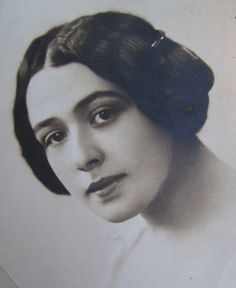
Quand, en 1937, la chanteuse réaliste allemande Lale Andersen découvre le poème de Hans Leip qu'il vient de publier dans un recueil de poésie (l'ayant complété des deux strophes qui évoquent la mort du jeune soldat), elle demande à son ancien amant le compositeur Rudolf Zink de le mettre en musique, une première version romantique, et interprète la chanson la même année dans des petits cabarets de Berlin et de Münich. En 1938, elle demande également au compositeur Norbert Schultze, (avec lequel elle avait eu une aventure sans lendemain en 1932), de mettre lui aussi ce poème en musique, ce qu'il fait en lui fredonnant une mélodie qu'il avait crée deux ans plus tôt pour une publicité radiophonique pour le dentifrice Chlorodont, une mélodie plus martiale. Lale chante alternativement les deux versions dans les cabarets, elle préférait la première version plus douce mais testait les deux pour voir laquelle aurait plus les faveurs du public, mais c'est la deuxième, martiale, qui est enregistrée le 2 août 1939 pour le premier label allemand Electrola et qui s'imposera pendant la Seconde Guerre mondiale. Cette chanson nostalgique, jugée par la critique « terne et sans rythme », est un échec commercial avant la guerre (seulement 700 exemplaires du disque vendus).
En 1941, l'Allemagne est en pleine guerre sur plusieurs fronts et, changeant brusquement de statut, cette chanson d'amour va devenir un chant de guerre. Son succès est lancé le 18 août 1941 lorsque le lieutenant Heinz-Karl Reitgen, directeur de la radio militaire allemande de Belgrade, programme, faute de mieux, ce disque au rebut car les bombardiers anglais ont détruit son entrepôt de disques. Les soldats de la Wehrmacht éloignés de leur foyers et de leurs amies envoient des dédicaces à une émission populaire de cette radio qui fait de la chanson son indicatif qui clôt la fin son programme tous les soirs avant 22 heures. Ce succès est même tel que l'on s'en inquiéte au NSDAP. Radio Belgrade était entendue jusqu'au front d'Afrique du Nord. Selon Norbert Schultze, Joseph Goebbels dit que cette chanson «sent la danse macabre ». En quelques mois, la chanson est traduite en 43 langues.
Goebbels semble être plutôt hostile à la chanson, qui est très populaire et bénéficie du soutien de puissants protecteurs : le maréchal Erwin Rommel qui incite les radios à la programmer (jusqu'à 35 fois par jour, Radio Berlin imitant même l'émission de dédicaces de Radio Belgrade), Emma Göring, seconde épouse d'Hermann Göring et ancienne chanteuse d'opéra, Max Schmeling, boxeur idole des nazis dont le biographe n'est autre que Hans Leip. Hitler aurait dit de cette chanson à son aide de camp qu'elle pourrait même lui survivre.
Une nouvelle version de la chanson, transformée de chant d'amour en marche militaire, ne rencontre aucun succès public. L'affirmation selon laquelle les Einsatzgruppen l'auraient diffusée pendant leurs assassinats n'est pas prouvée, mais il est possible que la chanson ait accompagné les crimes, comme les valses de Strauss et les symphonies de Mozart et de Beethoven ont été utilisées dans les camps de la mort.
Lili devient un succès mondial
Grâce à la radio militaire allemande de Belgrade, cette chanson — ou du moins son air — franchit la Méditerranée et est entendue et adoptée par les soldats alliés combattant en Tripolitaine. Ainsi, en 1942, l'émission dédiée aux dédicaces aurait, selon Jean-Pierre Guéno, entraîné quotidiennement le cessez-le-feu et une sorte de fraternisation entre les troupes anglaises et les troupes allemandes à Tobrouk lorsque la chanson est diffusée dans les haut-parleurs, chaque soir à 22 heures, après les combats. Pour les belligérants et les civils des deux camps, elle devient l'hymne de la Seconde Guerre mondiale, adopté et chanté en allemand par beaucoup de soldats jusqu'au printemps 1944.
En 1942 on vend 160 000 exemplaires du disque et, en l'espace de six mois, la chanson est adaptée dans 48 langues. L'amour et la nostalgie de la paix sont des sentiments mieux incarnés par les soldats des démocraties que par ceux qui servent la cause hitlérienne. Les paroles françaises, dues à Henri Lemarchand, sont écrites à la fin de 1941 à la demande de Suzy Solidor, qui crée la version française dans son cabaret « La Vie parisienne » en janvier 1942. L'armée britannique se voit contrainte de faire produire une version anglaise en mai 1943 (après que Goebbels a fait enregistrer par Lale Andersen la chanson adaptée en anglais afin de démoraliser les Alliés), dont les interprétations par Anne Shelton et Vera Lynn en 1943 ont connu un succès fulgurant. À la suite de l'immense succès de la version américaine interprétée en swing par les Andrew Sisters et le big band (grand orchestre) de Glenn Miller, les Américains profitent de la Libération pour récupérer les droits de la chanson. L'actrice et chanteuse antinazie Marlène Dietrich finit ainsi à la fin de la guerre en 1944 par donner une version américaine, plus langoureuse, mais aussi plus énergique, puisque cette fois, dans la dernière strophe, le souvenir de la femme aimée redonne courage au soldat (qui meurt, enfoui dans sa tranchée, dans la dernière strophe du chant allemand!). Dietrich l'interprète dans plus de 60 concerts donnés au cours de la campagne d'Europe qui la voit accompagner la 3e armée américaine du général Patton7. Cette chanson devient dès lors attachée à sa personnalité, Marlène Dietrich se l’appropriant en modifiant les paroles, lui donne son nom , Lily Marlène, (et cet orthographe) en fait la chanson de la libération.
Elle en fait une chanson vedette de son récital lorsqu’elle entame sa carrière de chanteuse en 1953. Elle l’abandonne parfois, notamment en France, jugeant qu’elle « peut réveiller un bruit de bottes pour certains spectateurs ». Elle fut interdite dans beaucoup de dictatures car rappelant quelle était chantée des deux côtés.
Chanson subversive de résistance, car, transcendant les clivages, la chanson est interdite dans plusieurs pays totalitaires (RDA, Yougoslavie de Josip Broz Tito) et devient l'hymne anti-nucléaire pendant la Guerre froide. La chanson connaît depuis de nombreuses versions, depuis l'allure pacifiste d'antimilitaristes, l'adaptation punk du groupe Interterror («Adios Lili Marlen») ou rock par La Souris Déglinguée en 1983. En 2005, pour la commémoration du 60e anniversaire du Débarquement, la chanteuse Patricia Kaas doit la chanter en Mondovision mais les Polonais mettent un veto au choix de cette chanson la veille de l'événement, en raison de l'épisode des Einsatzgruppen, lui préférant l’Hymne à l'amour.
Pour l'écrivain John Steinbeck, Lili Marleen est « la seule chose que l'Allemagne nazie ait apportée au monde ». - fr.wikipedia
Devant la caserne
Quand le jour s'enfuit,
La vieille lanterne
Soudain s'allume et luit.
C'est dans ce coin là que le soir
On s'attendait remplis d'espoir
Tous deux, Lily Marlène,
Tous deux, Lily Marlène.
Et dans la nuit sombre
Nos corps enlacés
Ne faisaient qu'une ombre
Lorsque je t'embrassais.
Nous échangions ingénûment
Joue contre joue bien des serments
Tous deux, Lily Marlène,
Tous deux, Lily Marlène.
Le temps passe vite
Lorsque l'on est deux!
Hélas on se quitte
Voici le couvre-feu...
Te souviens-tu de nos regrets
Lorsqu'il fallait nous séparer?
Dis-moi, Lily Marlène?
Dis-moi, Lily Marlène?
La vieille lanterne
S'allume toujours
Devant la caserne
Lorsque finit le jour
Mais tout me paraît étrange
Aurais-je donc beaucoup changé?
Tous deux, Lily Marlène,
Tous deux, Lily Marlène.
Cette tendre histoire
De nos chers vingt ans
Chante en ma mémoire
Malgré les jours, les ans.
Il me semble entendre ton pas
Et je te serre entre mes bras
Tous deux, Lily Marlène,
Tous deux, Lily Marlène.
inviata da Riccardo Venturi - 25/3/2005 - 18:21

French version by Anne Vanderlove from the album "Femme de légende (2003)
Dans cette gare d'une ville inconnue
Où j'attendais un train qui n'est jamais venu,
Je n'suis ni blonde, ni de Berlin,
Pourtant il m'a pris les deux mains.
Chante-moi Lili Marlène...
Chante-moi Lili Marlène...
Je n'avais pas le cœur à faire des manières.
J'ai bu un verre de vin, il a bu de la bière,
M'a parlé de guerres oubliées :
De son grand-père qui aimait
Lili, Lili Marlène...
Lili, Lili Marlène...
Et de ce réverbère à l'angle de la rue
Qui frangeait de lumière leurs ombres éperdues,
De la mitraille et des obus
Dont il n'est jamais revenu,
Adieu Lili Marlène...
Adieu Lili Marlène...
Dans cette gare oubliée dans la nuit,
Il a pleuré, j'ai pleuré avec lui.
Où s'en vont les ombres légères
De ceux qu'on aime de ceux qu'on perd ?
Et toi Lili Marlène...
Et toi Lili Marlène...
On avait dans les yeux comme une pluie d'hiver,
Comme une solitude de vieux réverbères.
On a chanté pour son grand-père
Pour que son âme retrouve celle
De sa Lili Marlène...
De sa Lili Marlène...
La la la...
Et on a bu un autre verre
À l'absurdité de la guerre,
Et à Lili Marlène,
À toi Lili Marlène,
Adieu Lili Marlène...
inviata da Bartleby - 15/3/2011 - 11:15
Version française – LILI MARLÈNE (Chanson d’un jeune planton) – Marco Valdo M.I. – 2016
Chanson allemande – Lili Marleen [Lied eines jungen Wachtpostens] – Hans Leip – 1915
Lili Marlène, mais Marco Valdo M.I., je la connais cette chanson. C’est une chanson du temps de la guerre. Je l’ai entendue fort souvent depuis ce temps-là. Mais justement, ce temps-là, pour moi, c’était la Deuxième Guerre mondiale ; alors, explique-moi, ce qu’elle fait ici en plein milieu de la Première Guerre mondiale.
Ah, Lucien l’âne mon ami, c’est encore une histoire assez étrange et d’une certaine manière paradoxale. Une chanson d’amour, somme toute assez banale, qui raconte une histoire ordinaire, arrivée à des milliers de jeunes soldats et qui devient une sorte de tube parmi les belligérants de tous les camps. Un autre aspect paradoxal est celui que tu soulignes : voici une chanson qu’on situe généralement dans les chansons de la Seconde Guerre mondiale – ce qu’elle fut assurément, mais qui est en réalité et très objectivement une chanson de la Première Guerre mondiale. J’affirme tranquillement ça, malgré ton regard interrogatif encore, car elle a été écrite en 1915 par Hans Leip, jeune soldat affecté à la Garde impériale à Berlin. Cependant, son argument est quasiment intemporel : un jeune soldat rencontre son « amie » près de la caserne, etc, il part au front (comme Hans Leip et des millions d’autres) et il meurt à la guerre (comme des millions d’autres) ; du moins, on le suppose à la lecture de la dernière strophe.
C’est bien vrai qu’elle est intemporelle et que tant qu’il y aura des guerres, elle sera d’actualité. Et, je t’assure, dit Lucien l’âne en riant, qu’elle aurait aussi bien pu concerner un « miles » romain affecté à la garde du Palais de Néron ou un planton de Nabuchodonosor.
Évidemment, pour le mélo, on joue le grand air de la nostalgie, le pauvre soldat songe à son amie qu’il a laissée et qui l’oublie dans les bras du suivant et il pense aussi à l’autre qui a pris sa place, disons sous la lanterne. Pour corser l’affaire et émouvoir plus encore, on fait en plus surgir la chanson de la tombe du jeune mort nostalgique.
En effet, dit Lucien l’âne, c’est un vrai mélodrame, cette chanson. Un mélodrame des plus mélos et des plus dramatiques, un mélimélo propre à séduire les cœurs d’artichaut et les âmes infantiles.
Tu as parfaitement résumé la chose, Lucien l’âne mon ami. C’est une chanson qui joue sur les émotions et sur les réflexes psychologiques profonds, acquis dans la petite enfance ; sur les ressorts qui actionnent les sentiments des militaires et des ménagères, encore que chez ces dernières, il y ait de solides exceptions. Berta, par exemple, raisonnait plus sainement. Cette résonance sentimentale dans les âmes militaires montre combien ces hommes et ces jeunes gens, et les populations à leur suite, sont infantilisés et en quelque sorte, hypnotisés et chloroformés. Mais ce n’est pas un hasard, car c’est une nécessité intrinsèque à la conduite de la guerre. On ne peut faire une armée militaire, obéissante et sans conscience propre, prête à massacrer et à se laisser massacrer, avec des adultes sensés.
Tout le conditionnement disciplinaire vise précisément à infantiliser (certains diraient lobotomiser, d’autres robotiser) les recrues ; heureusement, ça ne marche pas toujours, il y a des réticences chez certains. D’ailleurs, au temps du service militaire obligatoire, ceux qui retardaient leur incorporation de quelques années pour des raisons d’études (par exemple) étaient plus difficiles à mettre sous le joug que les jeunes recrues. Au point que ces « incorporés tardifs » étaient mis dans des groupes spécifiques, afin d’éviter la contagion.
Oh, dit Lucien l’âne, quand même pour la plupart des gens et tout spécialement, les jeunes (encore qu’il ne manque pas de vieux cons, comme aurait Tonton Georges), la guerre, c’est toujours la guerre des pissotières ; elle ressemble à une grande compétition sportive ou inversement. Concluons ainsi et reprenons notre tâche et tissons à nouveau sans désemparer le linceul de ce vieux monde infantile, militarisé, inconscient et cacochyme.
Heureusement !
Ainsi Parlaient Marco Valdo M.I. et Lucien Lane
Devant la caserne
Devant la grand porte
Il y avait une lanterne
Et elle y est encore.
Là, on pourra se retrouver ;
Sous la lanterne, on pourra rester
Comme avant, Lili Marlène,
Comme avant, Lili Marlène.
Nos deux ombres
Semblent montrer aux autres
Comme nous nous sommes tant aimés.
Notre amour est si évident
Que le voient tous les gens
Quand nous sommes sous la lanterne
Comme avant, Lili Marlène,
Comme avant, Lili Marlène.
Déjà, le veilleur crie,
Le couvre-feu a sonné,
Trois jours d’arrêt, ça peut coûter.
« Camarade, j’arrive ! »
On s’est dit au revoir, on s’est quitté.
Même si avec toi, je voulais m’en aller.
Comme avant, Lili Marlène,
Comme avant, Lili Marlène.
Il connaît ton pas,
Ta démarche souple.
Chaque soir, ça me brûle
Et la douleur ne me lâche pas
Tant qu’il est là sous la lanterne,
Avec toi, Lili Marlène,
Avec toi, Lili Marlène.
Dans ce grand silence
Du fond de la terre
Me revient comme en rêve
Ta bouche amoureuse.
Et aux premières brumes,
Je serai sous la lanterne,
Comme avant, Lili Marlène,
Comme avant, Lili Marlène.
inviata da Marco Valdo M.I. - 10/6/2016 - 13:03
Irish transcreation by Gabriel Rosenstock
Vor der Kaserne, vor dem grossen Tor
Os comhair na beairice, Lilí, a stór,
Stand eine Laterne, und steht sie noch davor.
Lampa ina sheasamh ansúd mar gharda mór.
So woll’n wir uns da wieder seh’n
Táimse ag siúl anois féd dhéin
Bei der Laterne wollen wir steh’n
Faoin lampa atá ag dó mar ghréin
Wie einst Lili Marleen, Wie einst Lili Marleen.
Mar riamh, Lilí Marleen, mar riamh Lilí Marleen.
Unsere beide Schatten sah’n wie einer aus
Scáileanna a chéile bhíodar mar aon scáil
Dass wir so lieb uns hatten, das sah man gleich daraus.
Ba ríléir do gach éinne go rabhamar i ngrá.
Und alle Leute solln es seh’n
Bhíos-sa de shíor ag siúl faoid dhéin
Wenn wir bei der Laterne steh’n,
An lampa ag dó ag dó mar ghréin
Wie einst Lili Marleen, wie einst Lili Marleen
Mar riamh, Lilí Marleen, mar riamh, Lilí Marleen.
Schon rief der Posten: Sie blasen Zapfenstreich
Arsa an garda: Cuirfiú, a mhic, cuirfiú
Das kann drei Tage kosten. Kam’rad, ich komm sogleich.
Bog breá ansin, a gharda, tabhair nóiméad dúinn, gan bhrú.
Da sagten wir auf Wiedersehen,
Is dúramar Auf Wiedersehen
Wie gerne wollt ich mit mir dir geh’n,
An lampa ag dó ag dó mar ghréin
Mit dir Lili Marleen, mit dir Lili Marleen.
Mar bhí, Lilí Marleen, mar bhí, Lilí Marleen.
Deine Schritte kennt sie, deinen zieren Gang
Aithníonn sé do ghúna, aithníonn sé do chló
Alle Abend brennt sie, doch mich vergass sie lang.
Mise táim dearúdta, dearúdta aige fadó
Und sollte mir ein Leids gescheh’n,
Dá mbeinnse lagbhríoch nó i bpéin
Wer wird bei der Laterne stehen,
Cé bheadh ag siúl ansin faoid dhéin
Mit dir Lili Marleen, mit dir Lili Marleen?
Mar bhí, Lilí Marleen, mar bhí Lilí Marleen?
Aus dem stillen Raume, aus der Erde Grund
Is i lar an chiúnais, anseo i dtír aineoil
Hebt mich wie im Traume dein verliebter Mund.
Seoltar mé go huaigneach chughatsa, chun do bheoil
Wenn sich die späten Nebel drehn,
Beidh mise taobh leat cé i gcéin
Werd’ ich bei der Laterne steh’n
Is an lampa ag dó ag dó mar ghréin
Wie einst Lili Marleen, wie einst Lili Marleen.
Mar riamh, Lilí Marleen, mar riamh Lilí Marleen.
inviata da Gabriel Rosenstock - 27/7/2018 - 16:50
A translation into the Georgian language (Kartuli ena) reproduced from the blog Defence and History. The page is focused on military music and it should be remarked that it includes other songs by Norbert Schultze, like the famous "Bomben auf England" also mentioned in the Introduction. The transcription has been made according to the Georgian national system. [RV]
ამ ყაზარმის წინ, დიდი ჭიშკრის წინ,
ქუჩაში რომ დგას სინათლის ბოძი,
გვსურს ერთმანეთის ჩვენ კიდევ ნახვა,
იმ სინათლის ქვეშ კვლავ ერთად დგომა,
როგორც ერთხელ ლილი მარლენ,
როგორც ერთხელ ლილი მარლენ.
ჩვენი ჩრდილები ერთმანეთს ერწყმის,
ჩვენს ტრფობას ყველა უმალ ამჩნევდა,
და ყველას უნდა კვლავ იმის ნახვა,
იქ ჩვენი ხილვა, იმ სინათლის ქვეშ,
როგორც ერთხელ ლილი მარლენ,
როგორც ერთხელ ლილი მარლენ.
საყვირი უკრავს _ უკვე მიხმობენ,
ჩვენ ერთად ყოფნის სამი დღე დაგვრჩა,
მალე ყაზარმას დავუბრუნდები,
ჩემს გულის სატრფოს უნდა დავშორდე.
ო, როგორ მინდა მეც შენთან ვიყო,
შენთან ერთად ლილი მარლენ,
შენთან ერთად ლილი მარლენ.
სინათლის ბოძი გრძნობს შენს ნაბიჯებს,
არ შეუძლია მას დავიწყება,
და თუ სიკვდილმა მომიღო ბოლო,
მაშინ ვინ დადგეს კვლავ იმის ჩრდილში?
როგორც ერთხელ ლილი მარლენ,
როგორც ერთხელ ლილი მარლენ.
მყუდრო სივრციდან, მიწის სიღრმიდან
ზევით მეწევა ზმანება შენი,
როდესაც მწუხრი ყველაფერს ბურავს,
მაშინ დავდგები ისევ იმ ბოძთან,
როგორც ერთხელ ლილი მარლენ,
როგორც ერთხელ ლილი მარლენ.
am qazarmis tsin , didi chishkris tsin ,
k’uch’ashi rom dgas sinat’lis bodzi ,
gvsurs ert’manet’is ch’ven kidev nakhva ,
im sinat’lis k’vesh kvlav ert’ad dgoma ,
rogorts’ ert’khel lili marlen ,
rogorts’ ert’khel lili marlen .
ch’veni ch’rdilebi ert’manet’s ertsqmis ,
ch’vens trp’obas qvela umal amch’nevda ,
da qvelas unda kvlav imis nakhva ,
ik’ ch’veni khilva , im sinat’lis k’vesh ,
rogorts’ ert’khel lili marlen ,
rogorts’ ert’khel lili marlen .
saqviri ukravs _ ukve mikhmoben ,
ch’ven ert’ad qop’nis sami dghe dagvrch’a ,
male qazarmas davubrundebi ,
ch’ems gulis satrp’os unda davshorde .
o , rogor minda mets’ shent’an viqo ,
shent’an ert’ad lili marlen ,
shent’an ert’ad lili marlen .
sinat’lis bodzi grdznobs shens nabijebs ,
ar sheudzlia mas davitsqeba ,
da t’u sikvdilma momigho bolo ,
mashin vin dadges kvlav imis ch’rdilshi ?
rogorts’ ert’khel lili marlen ,
rogorts’ ert’khel lili marlen .
mqudro sivrts’idan , mitsis sighrmidan
zevit’ metseva zmaneba sheni ,
rodesats’ mtsukhri qvelap’ers buravs ,
mashin davdgebi isev im bodzt’an ,
rogorts’ ert’khel lili marlen ,
rogorts’ ert’khel lili marlen .
inviata da Riccardo Venturi - 30/7/2014 - 10:00
La versione giapponese.
The Japanese version.
Lyrics are reproduced from this page. We don't know if it is the standard version (in any case, the song was known to the Japanese troops fighting in WW II) or a later version. Includes transcription. [CCG/AWS Staff]
加藤登紀子 作詞
Norbert Schultze 作曲
(曲はポピュラーコーナーと同じ)
ガラス窓に灯がともり 今日も町に夜がくる
いつもの酒場で 陽気に騒いでる
リリー リリー マルレーン
リリー リリー マルレーン
男達にかこまれて 熱い胸を躍らせる
気ままな娘よ みんなのあこがれ
リリー リリー マルレーン
リリー リリー マルレーン
お前の赤い唇に 男達は夢を見た
夜明けがくるまで すべてを忘れさせる
リリー リリー マルレーン
リリー リリー マルレーン
ガラス窓に日が昇り 男達は戦にでる
酒場の片隅 ひとりで眠っている
リリー リリー マルレー
リリー リリー マルレーン
月日は過ぎ人は去り お前を愛した男達は
戦場の片隅 静かに眠ってる
リリー リリー マルレーン
リリー リリー マルレーン
ga kuru itsumo no sakaba de yōki ni sawai deru
rirī rirī marurēn
rirī rirī marurēn
Otokotachi ni kakoma rete atsui munewoodoraseru
kimamana musume yo min'na no akogare
rirī rirī marurēn
rirī rirī marurēn
Omae no akai kuchibiru ni otokotachi wa yumewomita
yoake ga kuru made subete o wasure saseru
rirī rirī marurēn
rirī rirī marurēn
Garasu mado ni Ni~Tsu ga nobori otokotachi wa sen ni deru
sakaba no katasumi hitori de nemutte iru
rirī rirī marurēn
rirī rirī marurēn
Tsukihi wa sugi hito wa sari omae o aishita otokotachi wa
senjō no katasumi shizuka ni nemutteru
rirī rirī marurēn
rirī rirī marurēn
inviata da Riccardo Venturi - 5/9/2008 - 20:32
Here's what seems to be a literal Japanese translation of the original German lyrics, reproduced from ja.wikipedia together with the historic commentary included in the same page. [CCG/AWS Staff]
『リリー・マルレーン』(Lili Marleen)は、第二次世界大戦中に流行したドイツの歌謡曲。
1915年にロシアへの出征を前にドイツの詩人ハンス・ライプ(Hans Leip)が、ベルリンのある兵営の営門に歩哨に立った時に創作した詩集『Das Lied eines jungen Soldaten auf der Wacht』(邦題・港の小さな手風琴)に収録されていた詩を原典として、第二次世界大戦直前の1938年に、作曲家ノルベルト・シュルツェ(Norbert Schultze)が曲をつけた。歌手のララ・アンデルセンの1939年2月に録音したレコードが、有名になった。
大戦下での流行
1939年に発売した当初、アンデルセンのレコードは60枚しか売れなかったと言われている。しかし、販売店に山積みになっていた売れ残りのレコードから、店員がドイツ軍の前線慰問用レコード200枚の中に2枚紛れ込ませた。それが1941年の秋に初めて流され、それ以後も放送で繰り返しかけられて人気を得た[1]。第二次世界大戦下の一時期、21時57分にベオグラードのドイツ軍放送局から流れたこの歌に、多くのドイツ兵が戦場で耳を傾けて故郷を懐かしみ、涙を流したといわれている。また、ドイツ兵のみならずイギリス兵の間にも流行したため、北アフリカ戦線のイギリス軍司令部は同放送を聞くことを禁じた。アンデルセンも慰問で人気者になったが、長くは続かなかった。1942年夏、アンデルセンの親しい関係にあったロルフ・リーバーマンがユダヤ人であったことが当局に知られてアンデルセンの歌手活動が禁止され、アンデルセンの録音したレコードの原盤が廃棄される事態となる。「リリー・マルレーン」の歌と曲自体は、ヨーゼフ・ゲッベルス宣伝相の指示により別バージョンが作られた。
女性歌手によって歌われることが多い。日本ではベルリン出身のハリウッド女優、マレーネ・ディートリッヒの持ち歌として知られている。第二次世界大戦当時、ナチス政権下のドイツを離れ、アメリカの市民権を得ていたディートリヒは進んで連合軍兵士を慰問し、この歌を歌った。そのため、ドイツでのディートリヒは敵側の人間(反逆者)と見なされ、戦後も不人気であった。
兵営の前、門の向かいに
街灯が立っていたね
今もあるのなら、そこで会おう
また街灯のそばで会おうよ
昔みたいに リリー・マルレーン
俺たち2人の影が、1つになってた
俺たち本当に愛しあっていた
ひと目見ればわかるほど
また会えたなら、あの頃みたいに
リリー・マルレーン
もう門限の時間がやってきた
「ラッバが鳴っているぞ、遅れたら営倉3日だ」
「わかりました、すぐ行きます」
そして俺たちお別れを言った
君と一緒にいるべきだったのか
リリー・マルレーン
もう長いあいだ見ていない
毎晩聞いていた、君の靴の音
やってくる君の姿
俺にツキがなく、もしものことがあったなら
あの街灯のそばに、誰が立つんだろう
誰が君と一緒にいるんだろう
たまの静かな時には
君の口元を思い出すんだ
夜霧が渦を巻く晩には
あの街灯の下に立っているから
昔みたいに リリー・マルレーン
inviata da Riccardo Venturi - 21/7/2014 - 12:01
La versione giapponese cantata da Rie Tanaka per la colonna sonora dell'anime Strike Witches. E' seguita da una trascrizione.
The Japanese version performed by Rie Tanaka for the Strike Witches anime soundtrack. Includes transcription [CCG/AWS Staff]
兵舎の大きな門の前、
街灯が立っていた
今もまだあるのなら
また会おう、並んで
そこに立とう
いとしの リリー・マルレーン
二つの影は、一つに
愛しあう二人の姿
誰にでも分かる
みんなに見て欲しい
並ぶ姿を
いとしの リリー・マルレーン
兵舎は焼け、大陸は落ちた
戦いの空はまだ続く、
君たちは飛び立ち
さよなら告げる
君と行きたい
いとしの リリー・マルレーン
君の飛行を、エンジン音を
街灯は覚えていた
それももうやけ落ちた
僕のことも忘れてくれ
もう届かない
いとしの リリー・マルレーン
静かな大地の底から
君の唇が僕を呼ぶ
渦巻く霧の中
夜更けに僕は戻る
かつてのように
いとしの リリー・マルレーン
渦巻く霧の中
夜更けに僕は戻る
リリー リリー・マルレーン
リリー リリー・マルレーン
Heisha no ōkina mon no mae,
gaitō ga tatte ita
ima mo mada aru no nara
mata aou narande
soko ni tatou
itoshi no rirī marurēn
Futatsu no kage wa hitotsu ni
aishi au futari no sugata
dare ni demo wakaru
minna ni mite hoshī
narabu sugata wo
itoshi no rirī marurēn
Heisha wa yake, tairiku wa ochita
tatakai no sora wa mada tsuzuku,
kimitachi wa tobitachi
sayonara tsugeru
kimi to yukitai
itoshi no rirī marurēn
Kimi no hikō wo, enjin-on wo
gaitō wa oboete ita
sore mo yakeochita
boku no koto mo wasuretekure
mō todokanai
itoshi no rirī marurēn
Shizuka na daichi no soko kara
kimi no kuchibiru ga boku wo yobu
uzumaku kiri no naka
yofuke ni boku wa modoru
katsute no yō ni
itoshi no rirī marurēn
Uzumaku kiri no naka
yofuke ni boku wa modoru
rirī rirī marurēn
rirī rirī marurēn
inviata da donquijote82 - 19/4/2014 - 14:53

"Tante le traduzioni: ma ancora mancava quella in greco. Cerco di rimediare, come posso, io. Ho pensato che la cosa migliore fosse tradurre la traduzione dal tedesco offerta da Alfesibeo, il quale ne garantisce l'aderenza letterale." (gpt)
Nota. Nel titolo e nel testo è stata ripristinata la grafia "Λιλή Μαρλέν", che sembra essere quella tradizionale in lingua greca.
"There are so many translations of this song, but a Greek translation was still lacking. I did my best to fill this gap. In my opinion, the best thing to do is using Alfesibeo's Italian translation from German, assuring good literalness." (gpt)
Note. In the song title and lyrics, the spelling "Λιλή Μαρλέν" has been restored, as this seems to be the traditional Greek spelling.
Με τον τίτλο Λιλή Μαρλέν, (Lili Marleen), φέρεται το πλέον διάσημο τραγούδι στη διάρκεια του Β' Παγκοσμίου Πολέμου που τραγουδήθηκε και από τις δύο πλευρές των αντιμαχομένων, με διάφορο χαρακτήρα. Αρχική ερμηνεύτρια του τραγουδιού ήταν η Λάλε Άντερσεν.
Η «Λιλή Μαρλέν» ήταν ένα παλαιό γερμανικό ερωτικό ποίημα που φέρεται να γράφηκε από τον δάσκαλο Hans Leip (1893–1983) στη διάρκεια του Α΄ Παγκοσμίου Πολέμου περί το 1915, το οποίο πρωτοδημοσιεύτηκε το 1937 με τον τίτλο «Das Lied eines Jungen Soldaten auf der Wacht» (= «Το τραγούδι ενός νεαρού στρατιώτη στη σκοπιά»). Τον επόμενο χρόνο μελοποιήθηκε από τον Νόρμπερτ Σουλτζ και το 1939 ηχογραφήθηκε για πρώτη φορά υπό εκτέλεση της Γερμανίδας τραγουδίστριας Λάλε Άντερσεν (1905-1972) υπό τον νέο τίτλο «Das Mädchen unter der Laterne» (= «Το Κορίτσι κάτω απ΄ το φανάρι»).
Μετά την ταυτόχρονη Γερμανική εισβολή στην Ελλάδα και Γιουγκοσλαβία ο καταληφθείς ραδιοφωνικός σταθμός του Βελιγραδίου από το Ράιχ άρχισε ν' αναμεταδίδει με τον πολύ ισχυρό πομπό που είχε στο μεταξύ εγκατασταθεί, το τραγούδι αυτό, ως πιο πρόχειρο στη δισκοθήκη, χωρίς ιδιαίτερο προπαγανδιστικό χαρακτήρα, απ΄ όπου και διαδόθηκε στη συνέχεια σ΄ όλη την Ευρώπη, τη Μεσόγειο και Β. Αφρική, ακόμα και στις ΗΠΑ και μάλιστα μεταγλωττισμένα. Τελικά ο τίτλος του καθιερώθηκε από το αναφερόμενο στο τραγούδι όνομα του κοριτσιού Λιλή Μαρλέν. Τον Ιούνιο του 1942 σε μια νεότερη διασκευή με κρουστά έλαβε την μορφή εμβατηρίου, που συνδυαζόταν άριστα με τον γερμανικό στρατιωτικό βηματισμό. Από τότε και μετά για μεν τους Γερμανούς και τους συμμάχους τους έφερε προπαγανδιστικό χαρακτήρα, για δε τους αντιπάλους παρέμενε ένα ιδιαίτερα δημοφιλές τραγούδι, με την γλυκιά και γεμάτη πάθος φωνή της Άντερσεν.
Το τραγούδι αυτό μεταγλωττισμένο στην ιταλική έχει ένα ιδιαίτερο αργό τέμπο σε χαμηλότερη φωνή που προσέδιδε μάλλον απογοήτευση παρά ενθουσιασμό. Μεταγλωττίστηκε και στην ελληνική με κάποιο σκωπτικό όμως χαρακτήρα που αποδιδόταν με νεαρές φωνές από θεατρικούς θιάσους της επιθεώρησης. Μεταγλωττίστηκε και τραγουδήθηκε ακόμα και στα φιλανδικά όχι όμως με τον γερμανικό στόμφο. Υπολογίζονται σε περίπου 200 διαφορετικές εκτελέσεις να έχουν κυκλοφορήσει από τότε μέχρι σήμερα. - el.wikipedia
Μπροστά στον στρατώνα
μπροστά στην μεγάλη πύλη
στεκόταν ένα φανάρι
κι ακόμα στέκεται εκεί μπροστά.
Μακάρι εκεί να συναντηθούμε
μακάρι να σταθούμε
όπως παλιά, Λιλή Μαρλέν!
Οι δυό σκιές μας φαινότανε μιά μονάχα
και πόσο πολύ αγαπιόμαστε εμεις
απ'αυτό δειχνότανε ακριβώς.
Κι ο κόσμος όλος πρέπει να το δει,
πότε θα σταθούμε δίπλα στο φανάρι
όπως παλιά, Λιλή Μαρλέν.
Και φώναξε ο σκοπός: «Η αποχώρηση σημαίνει
πρόσεξε τρεις μέρες να μην τις φας»
«Καμαράντ, εδώ πια είμαι».
Εκεί αποχαιρετηθήκαμε,
με τι χαρά θα είχα φύγει μαζί σου
μαζί σου, Λιλή Μαρλέν.
Τα βήματά σου καλά τα ξέρει, ξέρει και το βάδισμά σου τ'ελαφρό
κάθε βραδιά ανάβει αυτό
μα εμμένα δεν θυμάται από πολύ.
Κι αν συμφορά τυχόν μου γίνει
ποιός θα σταθεί δίπλα στο φανάρι
μαζί σου, Λιλή Μαρλέν;
'Εξω απ'το διάστημα τ'ακίνητο
έξω από το έδαφος της Γης
με σηκώνει σαν σ'όνειρο το στόμα σου π'αγάπησα.
'Οταν οι τελευταίες ομίχλες θα λειώσουν
εγώ θα σταθώ εκεί δίπλα στο φανάρι όρθιος,
όπως παλιά, Λιλή Μαρλέν.
inviata da Gian Piero Testa - 10/4/2012 - 22:19
Dall'album del 1985 Φύλλο πορείας (“Foglio di via”), interpretato da Thanasis Gaïfyllias assieme a Lia Tsiambazi (Λία Τσιαμπάζη), sua moglie. Il testo greco è di Makis Fotiadis.
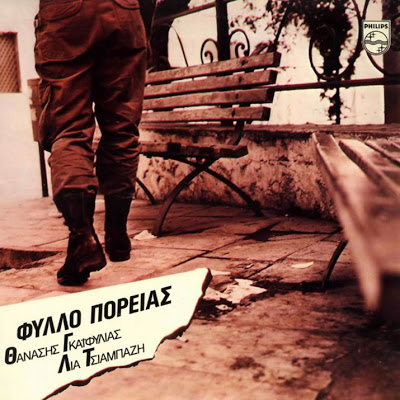
La Lili Marleen di Thanasis Gaïfyllias, forse, avrebbe meritato una pagina autonoma in quanto non è una semplice parodia, bensì una totale riscrittura sulla musica originale. Si tratta di una canzone ambientata in una qualche taverna, magari della città trace di Komotinì dove Gaïfyllias ha vissuto fin dall'infanzia, nella quale “cinque o sei amici del cuore” ricordano il periodo dell'Occupazione nazifascista e discutono della Resistenza, degli errori e della tattica da adottare cantando proprio Lili Marleen. Una canzone che tutti i greci avranno sentito cantare dagli occupanti tedeschi, e della quale deve esistere probabilmente qualche traduzione coeva. Nel testo di Makis Fotiadis c'è un riferimento che ha del geniale: la “bettolaccia” dove i cinque o sei amici stanno viene posta esattamente “fuori dalla caserma” (vor der Kaserne...), proprio davanti alla sentinella.
Thanasis Gaïfyllias è nato nel 1947 a Souflì nell'Evros, il nomo più orientale della Grecia continentale ai confini con la Bulgaria e la Turchia; dal 1953 vive a Komotinì in Tracia. Accanto all'attività di cantautore, è sempre stato un apprezzato compositore di musiche di scena per il teatro. [RV]
Πέντε-έξι φίλοι,
φίλοι καρδιακοί
Με αναμνήσεις
από την κατοχή
Όταν θα ‘ρθει η περίσταση
μιλούν για την αντίσταση
Και το τραγούδι λέν
για την Λιλή Μαρλέν
Λένε για λάθη
και για τακτική
Κι είναι της ταβέρνας
θαμώνες τακτικοί
Κι όταν θα ‘ρθει περίσταση
μιλούν για την αντίσταση
Και το τραγούδι λεν
για την Λιλή Μαρλέν
Έξω απ’ τη στρατώνα
μπρος απ’ το φρουρό
Σ’ ένα ρημαγμένο
και τρύπιο καπηλειό
Πέντε-έξι φίλοι καρδιακοί
μιλούν για την αντίσταση
Και το τραγούδι λεν
για την Λιλή Μαρλέν
Και το τραγούδι λεν
για την Λιλή Μαρλέν.
inviata da Riccardo Venturi - 21/7/2014 - 20:52
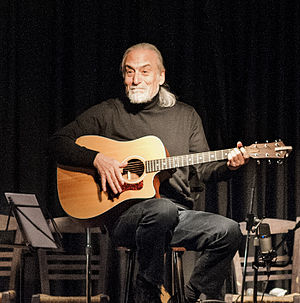
Traduzione italiana (di Riccardo Venturi) della Versione greca di Makis Fotiadis e Thanasis Gaïfyllias. 21 luglio 2014.
Cinque o sei amici,
amici del cuore
pieni di ricordi
dell'Occupazione,
quando arriverà l'occasione,
parlano della Resistenza
e cantano la canzone
di Lili Marleen.
Parlano degli errori
e della tattica,
e son della taverna
avventori abituali,
quando arriverà l'occasione,
parlano della Resistenza
e cantano la canzone
di Lili Marleen.
Fuori dalla caserma,
davanti alla sentinella
dentro una bettolaccia
tutta sgarrupata,
cinque o sei amici del cuore
parlano della Resistenza
e cantano la canzone
di Lili Marleen
E cantano la canzone
di Lili Marleen.
Versione inglese/hawaiana di Kiope Raymond e Pearl Rose
English and Hawaiian versione di Kiope Raymond and Pearl Rose
We cannot give, for the moment, the Hawaiian lyrics of this English/Hawaiian bilingual version of Lili Marlene. The English part is the standard one, performed by the singer Pearl Rose; Kiope Raymond, who recites the Hawaiian part rather than singing it, is a teacher in the department of Hawaiian studies of the Honolulu University. Of course, we call upon help by Hawaiian friends for the lyrics transcription. [CCG/AWS Staff]
inviata da DQ82 - 19/4/2014 - 15:32
Iceland is perhaps the last country in the world where one would be supposed to find a version of “Lili Marleen”, for it has never made any war in its history (and this for the simple -and noble- reason that it has never had an army). Yet, a “Lili Marleen” -though definitely debased- has reached Iceland too. A popular songbook reports this short version (only the 1st verse) where “Lily Marlene” becomes, with a very Icelandic adaptation, the girlfriend of a shepherd who “is coming home before spring shines in the valley”. His “true love” is waiting for him home, “behind the blue mountains”. Once come home, he “will hug and kiss” her: “I'm coming and you love me”. The Icelandic lyrics are followed by a word-for-word English translation. [AWS/CCG Staff]
Að baki hinna bláu fjalla
bíður ástin mín,
ég mun koma aftur heim,
er vor í dalnum skín.
Einmana ég þrái og hugsa um þig,
þá hvíslast á mín kveðja og þrá,
ég kem, þú elskar mig,
ég kem, þú elskar mig.
my sweetheart is waiting,
I'll be back home
before the spring shines in the valley.
And finally I'll kiss and hug you,
my sorrows and my pains are over,
I'm coming, you love me,
I'm coming, you love me.
inviata da Riccardo Venturi - 22/10/2008 - 02:26
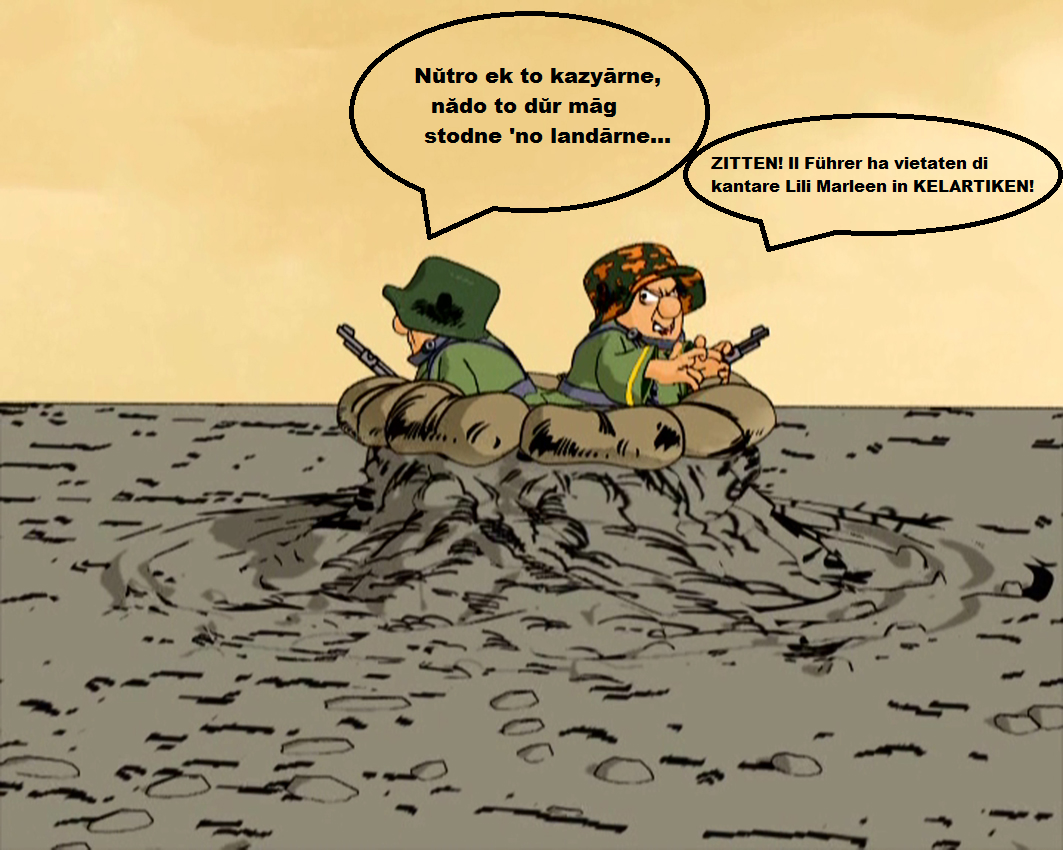
Nŭtro ek to kazyārne,
nădo to dŭr māg
stodne 'no landārne
ya stā hīdyē lorhāg.
Nŏ lāin ŏmārdărkestāi,
nar to landārne lāin stāstāi
kā envien, Lilī Marlēn,
kā envien, Lilī Marlēn.
Ŏlldvŭ mās skiad
k' anberra eno,
ŏmmadnăin tonād,
to dărknuar cieno.
Y'ŏllāi dărkhantnă ton
merkos syestodnăin hon
kā envien, Lilī Marlēn,
kā envien, Lilī Marlēn.
Yěd rhav to vahtlēn:
“Tokuar to retīr,
to măs layhant tīr dyēn!”
“Kamrād dŭlem astīr”,
Ŏmdudon adāuse hontă
Ya cien' vīssram stāstāi săm tă,
kā envien, Lilī Marlēn,
kā envien, Lilī Marlēn.
Lī kăn tān triftāi,
tān gīsmen lāimbig,
ŏll vispăr lī kāi
yomăr ubelne mă
ya te mă sitne syane mā',
nar to landārne, ces nŭ stā?
Săm tă, Lilī Marlēn,
Săm tă, Lilī Marlēn?
Ek to htomo stānig,
ek to dŏrr elveā,
abgī al mă kā'n manig
tān haus madaleā...
Merkos syelaus to niebe āsyem
nar to landārne mī stāsyem
kā envien, Lilī Marlēn,
kā envien, Lilī Marlēn.
Latin version by Meredith Minter Dixon
In Latinum sermonen vertit Mereditha Minter Dixon
La versione latina di Lili Marleen proviene, e la cosa deve essere sottolineata, dalla Nuova Zelanda. la.wikipedia è assai scarno: "Lili Marleen fuit secundo bello mundano praecipue inter milites clarissimum carmen, quod a Lale Andersen canebatur."
The Latin version of Lili Marleen, and this should be really pointed out, comes from New Zealand. la.wikipedia reports only the following: "Lili Marleen fuit secundo bello mundano praecipue inter milites clarissimum carmen, quod a Lale Andersen canebatur." [CCG/AWS Staff]
Extra hiberna
In decumana,
Trita'rat laterna;
Manebit vetusta,
Conveniemus hoc rursus;
Infra laternam stabimus,
Olim Lili Marleen.
Olim Lili Marleen.
Duae umbrae nobis
Una facta sunt.
Amavimus inter nos
Et omnes viderunt.
Omnes videbunt hac rursus;
Infra laternam stabimus,
Olim Lili Marleen.
Olim Lili Marleen.
Tum vigil dixit
Ut strepuisse vi.
Igitur ad castra
Reveniendum mi.
Ergo te iussi valere.
Malui tecum comitare,
Tecum Lili Marleen.
Tecum Lili Marleen.
Cognoverat vestrum
Incessum passumque.
Vesper' exspectabat
Diu oblita mei.
Occiso me, quis stabit tum,
Infra laternam sic tecum,
Tecum Lili Marleen?
Tecum Lili Marleen?
In hebeti die,
Vita quieta,
Memoria teneo
Quam dulci' oscula.
Nebula noctis venio.
Infra laternam solus sto.
Olim Lili Marleen.
Olim Lili Marleen.
inviata da Riccardo Venturi - 25/3/2005 - 18:38
Ad castra urbana
ad portam maximam
erat tunc lanterna.
Si est nunc etiam,
conveniamus eodem,
apud lanternam eandem,
ut tunc, Lili Marleen
[ut tunc, Lili Marleen]
[...]
inviata da Riccardo Venturi - 16/9/2008 - 20:47
Valdis Mednis' Latvian version reproduced from Dziesmas.lv
Daudzas latvju meičas vāciski tik prot,
Negrib latvju zēniem skūpstus vairāk dot.
Par to mēs varam tikai smiet,
Ka latvietes ar fričiem iet un dzied-
"Lili Marlēn" un dzied-"Lili Marlēn".
Nepaies ne gadiņš, ražojums kad nāks,
Daudzas latvju meičas, bērna ratus vāks.
Ratiņos guļ fricis mazs un vēder` kas`,
Pēc pupiņ` pras`,un dzied-
"Lili Marlēn" un dzied-"Lili Marlēn".
Fricis latvju meiču drātē jūrmalā,
Uznāk viņas māte- abus pārsteidza.
Mīļā meitiņ, ne... , uz tripera var uzrauties,
Kā reiz Lili Marlēn,
Kā reiz Lili Marlēn.
inviata da Riccardo Venturi - 19/3/2006 - 01:51
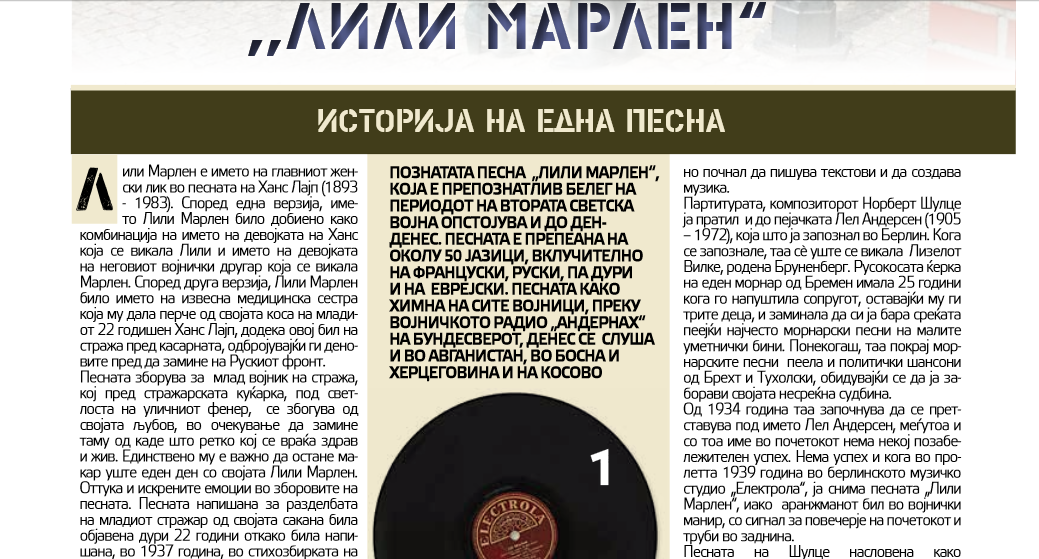
Maybe it shouldn't be said in the “Antiwar Songs” site; but, in any case, this is a page with a very special status. The following translation in the Macedonian language is reproduced, yes indeed, from a two pages article (by Aleksandar Stojčevski, who also made the translation) published in the nr 53 (February 2014) of the magazine Štit, that is, the official magazine of the Ministry of Defence of the Republic of Macedonia. In other words, the magazine of the Macedonian Armed Forces. The article, if you want to read it, is on pages 56 and 57. Moreover: the comprehensive text written by the journalist/translator is definitely good and sounds somewhat familiar, for it seems to be a word-for-word translation of the Introduction to this sitepage (including the image of Lale Andersen's original Electrola recording of 1939). So to say: when an army picks up from the “Antiwar Songs”, all this is really original! [RV]
Пред касарната
Пред големата капија
Стоеше еден фенер
И стои сè уште таму
Сакавме таму да се гледаме
Кај фенерот сакавме да стоиме
Како некогаш, Лили Марлен.
Нашите две сенки
Изгледаа како една
Дека се сакаме
Тоа секој го гледаше
И сите луѓе нека видат
Кога кај фенерот стоиме
Како некогаш, Лили Марлен.
Стражарот повика,
Засвира повечерје
Тоа може да чини три дена
Другар, доаѓам веднаш
Си кажуваме догледање
А колку сакав да отидам со тебе
Со тебе, Лили Марлен.
Фенерот го знае твојот чекор,
И твојот убав од
Секоја ноќ тој гори,
А мене веќе ме заборавил
И ако ми се случи најлошо
Кој кај фенерот ќе стои
Со тебе, Лили Марлен?
Од тивкото место,
Од длабочините на земјата
Како во сон ме подигаат
Твоите заљубени усни
Кога ноќната магла ќе затрепери
Ќе стојам кај тој фенер
Како некогаш, Лили Марлен.
Pred kasarnata
pred golemata kapija
stoeše eden fener
i stoi se ušte tamu
sakavme tamu da se gledame
kaj fenerot sakavme da stoime
kako nekogaš, Lili Marlen.
Našite dve senki
izgledaa kako edna
deka se sakame
toa sekoj go gledaše
i site lugje neka vidat
koga kaj fenerot stoime
kako nekogaš, Lili Marlen.
Stražarot povika,
zasvira povečerje
toa može da čini tri dena
drugar, doagjam vednaš
si kažuvame dogledanje
a kolku sakav da otidam so tebe
so tebe, Lili Marlen.
Fenerot go zna tvojot čekor,
i tvjot ubav od
sekoja nokj toj gori,
a mene vekje me zaboravil
i ako mi se sluči najlošo
koj kaj fenerot kje stoi
so tebe, Lili Marlen?
Od tivkoto mesto,
od dlabočinit na zemjata
kako vo son me podigaat
tvoite zaljubeni usni
koga nokjnata magla kje zatreperi
kje stojam kaj toj fener
kako nekogaš, Lili Marlen.
inviata da Riccardo Venturi - 30/7/2014 - 10:55
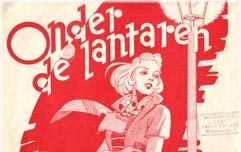
La classica versione neerlandese (olandese e fiamminga) di Herre de Vos (1877-1948) [1940]; nei paesi di lingua neerlandese è più nota col titolo di Onder de lantaren ("Sotto il lampione"). Una delle primissime ad essere registrate. Fu interpretata originariamente dalla Lou Bandy Orkester; qui sotto la vediamo e ascoltiamo interpretata dalla cantante (di madrelingua frisone) Anneke Douma.
The standard Dutch version by Herre de Vos (1877-1948) [1940]; it is best known in the Dutch-speaking countries under the title of Onder de lantaren ("Under the lamplight"). It was first performed by the Lou Bandy Orkester; here's the version recorded later by the Frisian-speaking singer Anneke Douma.

In Leips gedicht mijmert een soldaat over zijn liefje Lili Marleen, dat buiten de kazerne steevast bij een lantaarn op hem wachtte. Naarmate de tekst vordert blijkt dat de soldaat inmiddels van de kazerne naar het slagveld is verhuisd. Hij vraagt zich in de refreinregels af op welke soldaat Lili Marleen nu bij de lantaarn wacht. In het laatste couplet laat Lili's verliefde mond de soldaat 's avonds uit de aarde opstijgen, waarna hij ronddwaalt bij de lantaarn waar hij haar ooit ontmoette. Of met de aarde een loopgraaf wordt bedoeld waaruit de verlangende gedachten van de soldaat opstijgen, of een soldatengraf waaruit zijn geest opstijgt, blijft onduidelijk.
Hans Leip schreef het gedicht voordat hij naar het Russische front vertrok. Lili was de naam van zijn vriendinnetje. Marleen was mogelijk een verpleegster van wie Leip onder de indruk was geraakt. In 1937 publiceerde Leip een poëziebundel waarin Das Lied eines jungen Soldaten auf der Wacht was opgenomen.

Daarop besloot men bij de BBC om er een Engelse versie van te maken, geschreven door Tommy Connor en gezongen door Anne Shelton. Ze besloten het lied wel te kuisen: de oorspronkelijke Lili is een soldatenmeid die onder een straatlantaarn bij de grote poort van de kazerne op haar vrijer staat te wachten. In de Engelse versie is zij een beschaafd meisje dat op haar geliefde wacht. Ook het ietwat sinistere einde van het origineel is in de Engelse versie wat lichter verteerbaar.
Gedurende de hele oorlog was het lied razend populair bij soldaten aan beide zijden van het front. Het is bekend dat Joseph Goebbels Lili Marlene 'onpatriottisch' vond. Goebbels had een hekel aan het lied, omdat het morbide, neerslachtige karakter ervan zich slecht verhield tot het nationaalsocialistische beeld van de Duitse man/soldaat; Goebbels zou het een lijk van een smartlap hebben genoemd. De Duitse soldaten waren het daar niet altijd mee eens. Ze speelden het lied o.a. af tijdens executies van burgers in de oostelijke gebieden.
Het lied is naast het Engels nog in diverse andere talen vertaald; waaronder: het Deens, Estisch, Fins, Frans, Hongaars, Italiaans, Japans, Kroatisch, Latijn, Lets, Nederlands, Pools, Portugees, Russisch, Servisch, Sloveens, Spaans, Turks en Zweeds. - nl.wikipedia
[LILI MARLEEN]
Onder de lantaren,
bij de groote poort,
vrijen vele paren
bij avond ongestoord.
Als ik van boord kom,
ga 'k meteen
terstond naar
die lantaren heen,
met jou Lili Marleen,
met jou Lili Marleen!
Onder de lantaren,
heel dicht bij elkaar...
dat verliefd wij waren,
zag wel een ieder daar!
En elk die glimlacht
- naar ik meen -
gaat hij langs die
lantaren heen:
om ons Lili Marleen,
om ons Lili Marleen!
Onder de lantaren,
werd een sein gehoord,
dat kwam van de baren
en riep mij weer aan boord!
Ik zei vaarwel
en ging toen heen,
bij de lantaren
stond alleen,
mijn schat Lili Marleen,
mijn schat Lili Marleen!
Onder de lantaren,
loop jij nu mijn kind...
Ik ben weer gaan varen
en zwalk door weer en wind.
Soms is mijn hart
zoo zwaar als steen
en dan gaan mijn
gedachten heen
naar jou Lili Marleen,
naar jou Lili Marleen!
inviata da Riccardo Venturi - 25/3/2005 - 18:27
La versione norvegese della cantante Rita Engebretsen (nata nel 1957) proviene dall'album Frem fra glemselen (qualcosa come "via dal dimenticatoio") del 1976. E' una versione, quindi, di molti anni dopo la guerra. Questo spiega il suo rarissimo "happy end": qui Lili Marleen e il suo innamorato si ritrovano dopo lunghi anni dopo il lampione. E vissero felici e contenti!
The Norwegian version by the singer Rita Engebretsen (born 1957) is reproduced here from the 1976 album Frem fra glemselen ("out of oblivion"); it is, so, a definitely post-war version. This explains well its fairly rare happy end: here, Lili Marleen and her sweetheart meet again under the lamppost, after long years of separation. And they lived in happiness! [RV]
Lang der i det fjerne
ved kasernens dør,
står det et lanterne
og lyser nå som før,
der sto vi to i lyktens skinn,
du sa at du var vennen min,
du sa: Lili Marleen,
er din Lili Marleen.
Men jeg måtte reise,
og du ble igjen,
Kun den gamle sangen
jeg hadde om min venn.
Minnene har jeg med i den,
de sa vi skulle sees igjen,
en dag, Lili Marleen,
blir min Lili Marleen.
Årene forsvant
og tiden langsomt gikk,
mange brev jeg sendte
men intet svar jeg fikk.
Kanskje har du forelsket deg,
dat ved jeg jo du glemmer meg,
min venn Lili Marleen,
min venn Lili Marleen.
Nå er jeg tilbake
ved kasernens dør,
venter på min kjære,
som jeg gjorde før.
Da kommer du i lyktens skinn,
og sier du er vennen min
som før, Lili Marleen,
som før, Lili Marleen.
Under en lanterne,
ved kasernens dør,
står vi atter sammen,
som vi gjorde før,
her står vi nå i lyktens skinn,
og atter er jeg bare din,
og du, Lili Marleen,
er min, Lili Marleen.
inviata da Riccardo Venturi - 20/2/2020 - 13:29
“In questo caso, a differenza di altri - come “giovinezza-delinquenza” che faremo più tardi - l’ironia si accompagna ad un sentimento di amarezza…” Se non altro per la mancanza di “tajarin” e la relativa abbondanza di polenta… (Alberto Cesa)
Quand ch’i cantavo “La bela Gigogin”
Tute le sèire mangiavo ij tajarin
Adess ch’i cantoma Lilì Marlen
La pansa veuida, ij tubo pien
Ma mi lolì m’arven, ma mi lolì m’arven!
Tute le sèire ‘ndé a lét sensa mangé
E la matin bonora andé a travajé
Dòpo mesdì patate e ris
Ël Duce a rij e an benedis:
e viva j’italian, con n’etto e mes ëd pan…!
Passa la neuit: tre ore për durmì
E la matin bonora ‘nt la fàbrica a murì
A passa ‘l temp, ‘t n’ancorze nen
A canto tuti Lilì Marlen
Ma mi lolì m’arven, ma mi lolì m’arven!
inviata da dq82 - 30/11/2015 - 14:59

Polish version by Wojciech Młynarski
Lili Marleen – najsłynniejsza niemiecka piosenka z okresu II wojny światowej. Autorem tekstu (1915) jest Hans Leip, muzyki (1938) Norbert Schultze[1]. Pierwszym wykonawcą utworu była Lale Andersen.
Hans Leip napisał słowa w formie wiersza zatytułowanego "Das Lied eines jungen Soldaten auf der Wacht" w 1915 roku, który w 1937 ukazał się w zbiorze jego poezji. Kompozytor Norbert Schultze, zainteresowany jego treścią, napisał rok później muzykę do słów Leipa. Lale Andersen nagrała piosenkę w 1939 roku, a krążek z nagraniem sprzedano w ilości zaledwie 700 sztuk[3]. Popularność piosenka zdobyła dopiero dzięki nadawaniu jej przez niemiecką okupacyjną rozgłośnię Soldatensender Belgrad (Żołnierskie Radio Belgrad) w 1941 roku. Od razu stała się przebojem wśród żołnierzy Afrika Korps, gdyż belgradzkie radio było dobrze odbierane w Afryce. Początkowo piosenka nie spotkała się z aprobatą hitlerowskiego aparatu propagandowego i usiłowano zabronić jej śpiewania, lecz popularność i powszechne jej wykonywanie przez żołnierzy zmieniło stanowisko hitlerowskich propagandzistów. Piosenka w wersji niemieckiej była słuchana chętnie także wśród żołnierzy alianckich. Utwór został przetłumaczony na 48 języków. Na podstawie wspomnień Lale Andersen Rainer Werner Fassbinder nakręcił w 1980 roku film pt. Lili Marleen z Hanną Schygullą w roli głównej. - pl.wikipedia
Światło mrok rozgarnia,
bo u koszar bram
Pali się latarnia,
którą dobrze znam.
Zobaczyć ciebie w wieczór ten
W jej blasku chcę
Lili Marleen,
Tak chcę, Lili Marleen.
Zbliżasz się i oto
wśród latarni lśnień,
Cienie dwa się splotą
w jeden wspólny cień.
Niech wszyscy ujrzą obraz ten,
Mój cień i twój,
Lili Marleen,
I twój, Lili Marleen.
Słyszę twoje kroki,
a złociste skry
Twarz twą rzeźbią w mroku,
ból sprawiają mi
Kto będzie z tobą w wieczór ten
I noc po świt,
Lili Marleen,
Po świt, Lili Marleen.
Lecz gdy w otchłań runę,
mocno wierzę że
Jeden pocałunek
twój ocali mnie,
Znów będziesz ze mną w wieczór ten
I noc po świt,
Lili Marleene,
Po świt, Lili Marleen.
inviata da Riccardo Venturi - 25/3/2005 - 19:12
Poco ortodossa, visto il fatto che è più breve e richiama le atmosfere della guerra in Africa dei soldati dell'Afrika Korps :=)
Nel video su YT viene cantata dall'autore. [Krzysiek Wrona]
Polish version by Edward Snopek.
Rather unorthodox, as it shorter and recalls the atmospheres of the African war and of the Afrika Korps soldiers :=)
Sung by the author in the YT video. [Krzysiek Wrona]
Edward Snopek è un blogger e cantautore polacco attivo su YouTube.
Edward Snopek is a Polish blogger and songwriter active on YouTube. [CCG/AWS Staff]
W afrykańskich piaskach,
Tam gdzie wojna wre,
Kiedy głowę składam
Sen ogarnia mnie,
Sen o przepięknej pannie tej
Dwóch imion, Lili Marleen,
Dwóch imion, Lili Marleen.
Nigdy nie zapomnę
Łzawych oczu tych,
Które mnie żegnały
Tęsknie szepcąc mi,
Że nie zapomną nigdy mnie
I ja cię też, Lili Marleen
I ja cię też, Lili Marleen.
Kula mnie trafiła
Obok serca tuż,
Ciężko ranny ległem
Wśród piaszczystych wzgórz,
A w oczach wciąż tkwi obraz ten,
Ach żegnaj, Lili Marleen,
Ach żegnaj, Lili Marleen.
inviata da Krzysiek Wrona - 8/4/2014 - 23:16
A Polish (literal) translation by swalczak reproduced from this forum.
Przed koszarami, koło wielkiej bramy
Stoi latarnia, pod nią stają damy.
Tam chciałbym Ciebie spotkać znów,
Dziewczyno z koszarowych snów.
Ciebie, Lili Marlen,
Jak dawniej, Lili Marlen.
Oba nasze cienie, jeden tworzą cień,
Niech się nic nie zmienia,
Niech wiecznie trwa ten dzień.
Niech wszyscy ludzie widzą nas,
Pod tą latarnią cały czas.
Ja i Ty, Lili Marlen.
Ty i ja, Lili Marlen.
Już capstrzyk wzywa, już głośno trąbka dmie.
Ta trąbka natarczywa do koszar woła mnie.
Kolego daj mi jeszcze czas,
Bym mógł popatrzeć jeszcze raz
Na mą Lili Marlen.
Na Ciebie, Lili Marlen.
Ona zna Twe kroki, ona wszystko wie.
Świeci od zmroku, lecz już nie pamięta mnie.
I wielki ból mi sprawia myśl,
Że pod latarnią stoisz dziś,
Z innym, Lili Marlen.
Nie ze mną, Lili Marlen.
W moich wspomnieniach wciąż wielką rolę grasz,
W moich marzeniach nadal widzę Twoją twarz.
Gdybyś Boże chciał mi szczęście dać,
To pod latarnią chciałbym stać
Z moją Lili Marlen.
Jak dawniej, Lili Marlen.
inviata da Krzysiek Wrona - 8/4/2014 - 15:30
Libera versione portoghese tratta dal / A rather free Portuguese translation from blog di Alexandre Monteiro/Alexandre Monteiro's webblog.
Impressionado pela imagem da amante que se despede do namorado de sentinela, Schultz compõe no ano seguinte uma canção que tem a sua primeira interpretação feita por uma cantora de Bremerhaven, Lale Andersen. A gravação dá origem a 700 exemplares que passam mais ou menos despercebidos.
É apenas com a ocupação da Jugoslávia pela Wermacht e com a consequente criação da Rádio Belgrado que a canção ganha asas: o director da Rádio, o tenente Karl-Heinz Reintgen, difunde-a pela primeira vez a 18 de Agosto de 1941, a pedido de um amigo seu, combatente do Afrika Korps na Líbia. Por mero acaso, a Lili Marleen é ouvida por Rommel. O general alemão, comandante das forças alemãs no Norte de África, gosta tanto da canção que pede à Rádio Belgrado que a emita regularmente. E assim acontece: todos os dias, às 21.55, a emissão da Rádio Belgrado termina a sua emissão com a Lili Marleen, para embevecimento dos militares alemães.
Contudo, o teor nostálgico da canção não agrada a Berlim: o Ministério da Propaganda proibe a sua difusão com o argumento de que a Lili Marleen faz baixar o moral das tropas. Sob uma chuva de protestos, Goebbels tem de retractar-se e a canção passa vezes sem conta nas rádios alemãs, um verdadeiro hit discográfico avant la lettre difundido para uma Europa a ferro e fogo.
A canção torna-se um ícone, não só para os alemães como igualmente para os ingleses. Quando o Exército britânico dá por isso, milhares e milhares dos seus Desert Rats cantam em surdina a Lili Marleen - e, para cúmulo, em alemão!
Preocupados com o efeito subversivo que a canção poderia ter, os britânicos fazem gravar apressadamente uma versão sua, interpretada pela diva da altura, Vera Lynn (a tal que é citada no álbum The Wall, dos Pink Floyd, a fazer uma perninha com o seu We’ll meet again) numa versão de J. J. Phillips e Tommy Connor.
De todas as versões aquela de que mais gosto é, contudo, a interpretada pela Marlene Dietrich. E é esta versão, também ela gravada para as tropas americanas, a que se ouve hoje e se pode ler, aqui, em tradução livre. - Alexandre Monteiro.
Ali, junto ao quartel
ao pé da grande porta
havia um candeeiro alto
que ainda hoje se mantém de pé.
era aí que nos queriamos reencontrar
onde ficaríamos os dois, junto ao candeeiro
como antigamente, Lili Marleen
como antigamente, Lili Marleen
As nossas sombras encontravam-se
juntas fundiam-se como se fossem uma só
estávamos tão apaixonados
todos o podiam imediatamente ver
todos podiam contemplar-nos
quando estávamos junto ao candeeiro
como antigamente, Lili Marleen
como antigamente, Lili Marleen
E foi então que a sentinela gritou:
já tocou a reunir,
podes perder três dias de licença"
"camarada, já estou a caminho"
e foi assim que tivemos que dizer adeus
o que eu preferia ter ido contigo
contigo, Lili Marleen
contigo, Lili Marleen
O candeeiro sabe de cor as tuas passadas
o modo gracioso do teu andar
e, embora se acenda todas as noites
esqueceu-me já há muito.
se algo me acontecer
quem ficará debaixo do candeeiro
contigo, Lili Marleen?
contigo, Lili Marleen?
Dos céus acima de nós
das profundezas da terra
os teus lábios, como se eu sonhasse
elevam-se à procura dos meus
e eu, perdido no nevoeiro do entardecer
espero-te junto ao candeeiro, mais uma vez
contigo, Lili Marleen
contigo, Lili Marleen.
inviata da Riccardo Venturi - 26/3/2005 - 01:52
This Brazilian version of Lili Marleen is in form of a military march and traces back probably to the time when Brazilian troops were fighting in Europe with the Allies. As a matter of fact, the version is fully adapted to a Brazilian context: a love story with a “pequena dos alemães” (German babe) between machine guns and trenches (the Brazilian troops fought in the Ardennes), that the Brazilian soldier will remember when (and if) he's back in Brazil -where, however, he will keep “outro amor” (another love) far from war. The lyrics have been transcribed directly from the YT video, also including Marlene Dietrich's German version and some notes on the song history. [RV]
Sob a metralha,
dentro das trincheiras
em pleno “black-out”
eu ouvi noites inteiras
uma canção no céu vibrar,
era o inimigo a recordar
a ti, Lili Marlene,
a ti, Lili Marlene.
Em meu violão
plangente quis tocar
a canção que diz
quanto és doce para amar,
e palpitou meu coração
pela pequena do alemão,
por ti, Lili Marlene,
por ti, Lili Marlene.
Eu te encontrei
enfim, e me sorriste,
abracei-te e vi
que eras linda, porém triste,
ao lampião nada se via,
então chorei naquele dia
por ti, Lili Marlene,
por ti, Lili Marlene.
E se algum dia
próximo à vitória,
tocando o clarim
findando a linda história,
ao meu Brasil regressarei
e deste amor me lembrarei,
de ti, Lili Marlene,
de ti, Lili Marlene.
Mas outro amor
terei longe da guerra,
nos campos em flor,
nas coxilhas ou nas serras,
nada faz bem au coração
como o luar lá do sertão
sem ti, Lili Marlene,
sem ti, Lili Marlene.
inviata da Riccardo Venturi - 22/7/2014 - 11:17
La versione brasiliana (di Ghiaroni) interpretata e registrata nel 1947 da Francisco Alves. In questa versione ogni legame con l'originale (a parte la musica e il lampione) cessa di esistere: si tratta di una canzonetta d'amore portata al successo da uno dei più famosi cantanti dell'epoca, Francisco Alves detto "o rei das vozes". Figlio di immigrati portoghesi, era nato a Rio de Janeiro nel 1898; morì il 27 settembre 1952 carbonizzato in un incidente stradale.
The Brazilian version (by Ghiaroni) performed and recorded 1947 by Francisco Alves. In this version, every connection with the original (except music and, of course, the lamplight) is eliminated: it is a love song popularized by one of the best known Brazilian singers of that time, Francisco Alves, known as "o rei das vozes". The son of Portuguese immigrants, he was born 1898 in Rio de Janeiro; he died on September 27, 1952, burnt alive in a street accident. [CCG/AWS Staff]
"Mais uma interpretação inédita de Francisco Alves. Lili Marlene é uma canção alemã. Foi o maior êxito da ex-vedete Frau Goering [?!?] e muito cantada pelos alemães durante a campanha da África. Os ingleses aprenderam a canção na África e a cantavam em Londres. Lili Marlene agradou tanto que não havia música que a superasse. Quando a Força Expedicionária Brasileira chegou à Itália, Lili Marlene era a coqueluche da península e não há pracinha que não conheça a história de Lili Marlene. Assim como perderam a guerra, os alemães perderam a canção que passou a ser, na época, uma das favoritas de todo o mundo. Francisco Alves apresentou, em 21.4.47 esta versão da encantadora balada... a pequena e triste história de Lili Marlene."
Nota.Poiché non esiste in Rete alcun testo di questa versione, è stato trascritto all'ascolto con alcune incertezze e un paio di parole mancanti. Naturalmente, chi volesse completare il testo è il benvenuto. [RV]
Note. As the lyrics of this version are not to be found on the Web, they have been transcribed on direct listening with some doubts and a pair of words lacking. Of course, anyone who feels capable to complete the lyrics is welcome. [RV]
Sob o lampião,
na esquina do jardim
eu a encontrava
a noite junto a mim,
alí no jardim a sós então
nossa paixão
nasceu, cresceu
entre nós dois p'ra sempre,
Lili Marlene e eu.
Numa noite fria
a mão que eu apeguei
p'ra amor, ela fugia
de mim, porquê não sei...
Alí sob a luz do lampião
nossa paixão
findou, morreu
e separou p'ra sempre
Lili Marlene e eu.
Sob o lampião
no parque, […]
já lá regressar
verá um dia […]...
A nossa roseira já morreu,
o lampião
escureceu
a relembrar p'ra sempre
Lili Marlene e eu.
inviata da Riccardo Venturi - 23/7/2014 - 09:23
”Un tip din my YM friends list m-a rugat într-o zi să-i fac o favoare: să-i incropesc o traducere/adaptare în limba română a textului piesei Lili Marleen […] după versiunile din engleză şi germană. Cu aceasta ocazie, melodia (un mare succes pe vremea războiului) şi-a mai câştigat un fan. Am reuşit, grosso modo, să fac o adaptare cât mai aproape de varianta germană (cea originală) cât se poate de cantabilă, dar poate prea puţin poetică in comparaţie cu varianta engleză.”
Fossi in Sisiphe, non sarei così pessimista: la sua versione, oltre a essere “cantabilă”, è parecchio ben fatta e, più che altro, è l'unica che si riesce a trovare in rete in lingua rumena (eppure ce ne dovrà essere stata qualcuna esistente). Confrontando la fonte utilizzata, si noterà comunque una differenza: i diacritici. Oramai è praticamente impossibile trovare alcunché, in Rete, scritto in lingua rumena che segua l'ortografia nazionale ufficiale. Internet ha praticamente ucciso l'ortografia rumena e eliminato i segni diacritici. Noialtri di questo sito, che siamo particolarmente ostinati al riguardo, la ripristiniamo sempre. Non ci piace il rumeno internettizzato, ci piace quello di Eminescu, di Caragiale, di Tudor Arghezi. [RV]
Lili Marleen (Lili Marlene, Lily Marlene, Lili Marlène) este un cântec german de dragoste care a devenit popular de ambele părți (Aliați și Axă) ale frontului în timpul celui de-Al Doilea Război Mondial. Inițial creat în tempo de marș, Lili Marlene s-a transformat treptat în baladă și a fost preluat de trupele britanice, americane și franceze devenind faimos în întreaga lume. Piesa a fost tradusă în numeroase limbi. De asemenea, Lili Marleen a devenit subiectul unor documentare și filme cât și a unor spectacole de teatru și cabaret.
Versurile au fost scrise în 1915, în timpul Primului Război Mondial, de catre Hans Leip (1893-1983), un profesor din Hamburg, care a fusese recrutat de către Armata Imperială Germană. Poemul a fost publicat, ulterior, sub denumirea „Das Lied eines jungen Soldaten auf der Wacht” (Cântecul unui tânăr soldat de gardă). În 1938, versurile au fost puse pe muzică de Norbert Schultze. Mai târziu, Tommy Connor a scris versurile și în limba engleză.
Titlul inițial al cântecului a fost „Das Mädchen unter der Laterne” (Fata de sub felinar), dar a devenit faimos ca „Lili Marleen”. Înregistrările făcute de Lale Andersen în 1939 și Marlene Dietrich, au făcut ca melodia să devină și mai cunoscută. A devenit populară în ciuda opoziției regimului nazist, și mai ales a lui Joseph Goebbels, ministrul propagandei.
Prima înregistrare a Lilli Marlen, 2 august 1939, Electrola Studio, Berlin.
În 1941 trupele germane ocupă Belgradul. Povestea a cântecului a început odată cu difuzarea la Radio Belgrad a versiunii cântate de Lale Andersen. Lui Erwin Rommel i-a plăcut atât de mult cântecul încât a cerut postului de radio să-l transforme în semnătura emisiunii de știri. Începând de pe 18 august 1941 și până la sfârșitul războiului, Radio Belgrad a transmis cântecul în fiecare seară la ora 21:55, exact înainte de finalul emisiunii. Postul era recepționat și de trupele aliate plasate în zona Mării Mediterane, astfel că în scurt timp a devenit cântecul favorit al tuturor soldaților din zonă, indiferent de tabăra în care se găseau.
Una dintre primele variante ale cântecului în limba engleză a fost înregistrată de Anne Shelton, însă imediat după aceea i-au urmat mai multe cover version. La sfârșitul anior '40 și începutul anilor '50, Marlene Dietrich a făcut, de asemenea, o înregistrare în limba engleză. O altă versiune a melodiei a fost înregistrată în anii '60 de artistul Hank Snow.
Cântăreața Amanda Lear, de naționalitate franceză, a făcut o înregistrare a cântecului în 1978 pentru album ei „Never Trust a Pretty Face”. În 1993, aceasta a realizat o nouă înregistrare pentru albumul „Cadavrexquis” iar 2001 a imprimat cântecul în limba germană. Alt artist francez, Patricia Kaas a folosit Lili Marlene ca intro pentru melodia ei „D'Allemagne”.
În 1997, Carly Simon a înregistrat cântecul pe albumul său intitulat „Film Noir”. Grupul spaniol „Olé Olé”, condus de Marta Sánchez a lansat un cântec despre film în 1987. Astfel, piesa a devenit unul dintre cele mai vândute single-uri în Spania anilor '80, fapt ce le-a asigurat artiștilor amintiți mai sus un succes constant până în ziua de azi. Cea mai recentă înregistrare a cântecului, din 2006, aparține lui Neil Hannon, membru al formații irlandeze de muzică.
În 1981, Rainer Werner Fassbinder a realizat filmul Lili Marleen care prezintă o poveste de dragoste fictivă între o cântăreață de cabaret numită Willie și amantul evreu al acesteia, care a contribuit la lansarea cântecului. Filmul nu are nicio legătură cu biografia Lalei Andersen.
Casa de discuri de specialitate „Bear Family” a lansat o compilație de 7 discuri cu 195 de versiuni diferite ale cântecului. Formația germană de blackmetal „Eisregen” a înregistrat, de asemenea, o versiune a cântecului pentru albumul „Hexenhaus”. În 2004, această piesă a mai fost interpretată și de polonezul Kazik Staszewski. - ro.wikipedia
În faţa cazarmii, la uşă, dragă mea,
Era un felinar, şi-acum mai e aşa
Aşa am vrea să ne revedem
Tot lângă lampă să mai stăm
Cândva, Lili Marleen, cândva, Lili Marleen
Umbra aceea era a ta şi-a mea
Căci ne-am iubit atât şi totul se vedea
La piept eu te strângeam, te sărutam
Când lângă lampă noi stăteam
Atunci, Lili Marleen, atunci, Lili Marleen
Lampa-ţi ştie paşii, mersul elegant
Seara mereu arde, de mine a uitat
Iar dacă soarta crudă m-ar lua
La felinar cine-ar mai sta?
Doar tu, Lili Marleen, doar tu, Lili Marleen?
Din liniştea-ncăperii, din pământ, abis,
Guriţa ta, iubind, mă saltă ca-ntr-un vis
Când ceata cea târzie va cădea
La felinar oare vom sta
Noi doi Lili Marleen, noi doi Lili Marleen?
inviata da Riccardo Venturi - 23/7/2014 - 19:17
Versione russa di Josif Brodskij, da lui stesso cantata.
Russian Version by Josif Brodskij, performed by the same.
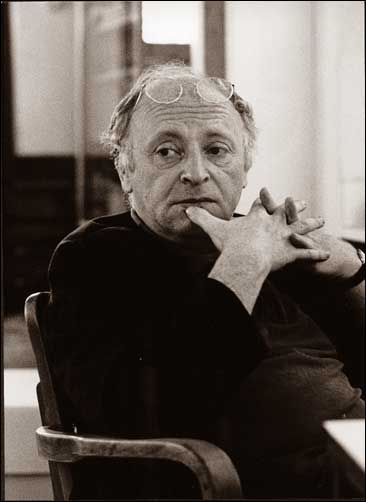
Текст этой песни написал немецкий солдат Hans Leip перед своей отправкой на русский фронт в 1915 г. Известный композитор Norbert Schultze обратил внимание на это стихотворение и в 1938 г. написал к нему музыку. В 1939 г. Lale Andersen записала эту песню на пластинку. 18-го августа 1941 Soldatensender Belgrad в первый раз в исполнении Лале Андерсен передал в эфир песню, которая вскоре стала позывными этой радиостанции. Песню подхватывали все, кто ее слышал, и она стала неофициальным гимном солдат всех фронтов Второй Мировой войны.
Песня была очень популярна в немецкоговорящих странах в конце 30-х и 40-х годах, благодаря исполнению этой песни Marlene Dietrich, также и на английском языке, во время концертов в разных странах позволило завоевать сердца миллионов людей по всему земному шару. - ostfront.ru
Josif Brodskij è stato uno dei maggiori poeti contemporanei di lingua russa. Ne riportiamo qui, per la sua importanza, una breve biografia:
Russian Version by Josif Brodskij.
Josif Brodskij is one leading Russian poet of the past century. Here's a short biography in Italian and English:
Josif Brodskij canta la prima strofa della versione russa di Lili Marleen
Joseph Brodsky singing the first verse of this Russian version of Lily Marlene
Josif Brodskji nasce a S. Pietroburgo il 24 maggio del 1940. Il padre Alexandr era ufficiale della Marina sovietica con la passione per la fotografia. Una passione che diventò un mestiere-ripiego, quando, a causa dell’origine ebraica, sopraggiunse il prepensionamento, perché l’antisemitismo stava diventando dottrina di stato. La madre Maria Volpert, durante la guerra lavorò come traduttrice nei campi di lavoro per prigionieri tedeschi, e finì per fare la contabile.
S. Pietroburgo e quel quotidiano fatto di diversità consapevole, coltivata dalla sua famiglia, in un Paese in cui la regola era essere uguali, daranno il ritmo al suo destino. Una città sospesa, lontana, affollata d’odori, ricordi, densa di personaggi letterari, e mai dimenticata, ritrovata in Venezia, in una sorta di trasposizione fisica e letteraria, di cui ci lascerà la descrizione in Fondamenta degli incurabili, attraverso un inimitabile gioco di specchi.
È quella città, insieme con una capacità di raccogliere tutto quello che si sospendeva sulla retina, ad averlo reso grande. Sia la fotografia sia la poesia colgono frammenti di vissuto, ma se la prima coglie l’attimo, la superficie, la seconda guarda all’eterno. Incoraggiato dalla madre, aveva abbandonato la scuola a quindici anni, incominciò a studiare da autodidatta e a comporre le prime poesie.
L’apprezzamento dell’Achmatova e l’eco delle sue letture — in molti accorrevano per ascoltare la sua indimenticabile voce nasale, capace di sollevare le parole e farle danzare — lo rendono inviso al Potere Sovietico. Accusato di fannullaggine sociale, processato, nel 1972 fu costretto a emigrare negli Stati Uniti, dove diventò cittadino americano nel 1977. Lì insegnò in diverse università, svolgendo contemporaneamente una vasta attività di pubblicista e poeta. Nel 1991-1992 fu nominato Poet Laureate degli Stati Uniti. La prima persona che volle incontrare, una volta arrivato in Occidente, fu Auden, l’unico che a suo parere, potesse sedersi sull’Enciclopedia Britannica. Della sua condizione d’esule moderno, sospeso nel tempo, nello spazio, ci resta il discorso d’accettazione al premio Nobel per la Letteratura, ricevuto nel 1987, pubblicato in Dall’esilio.
Il problema su cui ruota l’impianto della sua vasta e coerente opera è riuscire a far accettare, non solo percepire, la cultura, e nello specifico la poesia come vettore per la comprensione della realtà.
Ma soprattutto chiarire, in modo definitivo, che l’estetica è la madre dell’etica. Che uno sguardo incapace di riconoscere la simmetria delle cose è anche incapace di essere giusto. L’amore per Austen, Frost, Achmatova, Cvetaeva (l’unica con cui avesse deciso di non competere per il suo tono tragico inarrivabile), la capacità di rimettersi in discussione attraverso le parole e la loro plasticità rendono la sua attività un’opera d’arte pienamente compiuta. La possibilità di scrivere in russo, poesie, e in inglese, saggi, anche se scrisse in inglese un’elegia dal titolo Lowell per rendere omaggio alla memoria del poeta, e di mantenere intatta anche nella traduzione italiana il sottile estetismo della sua mente, lo rendono ineguagliabile. Una parola modulare la sua, come se le due lingue che usava non facessero altro che intersecarsi e comprendersi, quasi a lenire quella lontananza che l’esilio aveva tracciato in maniera definitiva.
Un uomo che riconosceva come unica divinità la lingua. Tutto il resto, corpo compreso, una trappola, capace di una fissità innaturale, una corazza per la parola, parola che in lui risuonava come un’onda.
Morto il 28 gennaio del 1996 a Brooklyn ha trovato finalmente riposo a Venezia.
Raccolte tradotte in italiano:
Fermata nel deserto, a cura di G. Buttafava, Milano, Mondadori, 1979
Poesie 1972- 1985, a cura di G. Buttafava, Milano, Adelphi, 1986,
Fuga da Bisanzio, trad. G. Forti, Milano, Adelphi, 1987
Il canto del pendolo, trad. G. Forti, Milano, Adelphi, 1987
Dall’esilio, Milano, Adelphi, 1988
Fondamenta degli incurabili, trad. G. Forti, Consorzio Venezia Nuova, 1989, e Adelphi, 1991
Marmi, trad. Fausto Malcovati, Milano, Adelphi, 1995
Poesie italiane, a cura di S. Vitale, Milano, Adelphi, 1996
Dolore e ragione, trad. G. Forti, Milano, Adelphi, 1998
Discovery, una poesia per bambini, con illustrazioni di V. Radunskij, testo italiano di A. Molesini, Milano, Mondadori, 1988
Nobel Prize winner and fifth U.S. poet laureate, Russian-born Joseph Brodsky (born Iosif Alexandrovich Brodsky; 1940-1996) was imprisoned for his poetry in the former Soviet Union but was greatly honored in the West.
Joseph (Iosif Alexandrovich) Brodsky was born on May 24, 1940, in Leningrad (now St. Petersburg), where he attended school until about 1956. His father was an officer in the old Soviet Navy. The family fell into poverty when the government stripped the older Brodsky, a Jew, of his rank.
When he left school, Joseph began an intensive program of self education, reading widely and studying English and Polish. He worked in photography and as an aid to a coroner and a geologist. He translated into Russian the work of John Donne, the 17th-century English poet, and Czeslaw Milosz, a modern Polish poet. He also wrote his own poetry, which impressed Anna Akhmatova, one of the country's leading literary figures.
Возле казармы, в свете фонаря
кружатся попарно листья сентября,
Ах как давно у этих стен
я сам стоял,
стоял и ждал
тебя, Лили Марлен,
тебя, Лили Марлен.
Если в окопах от страха не умру,
если мне снайпер не сделает дыру,
если я сам не сдамся в плен,
то будем вновь
крутить любовь
с тобой, Лили Марлен,
с тобой, Лили Марлен.
Лупят ураганным, Боже помоги,
я отдам Иванам шлем и сапоги,
лишь бы разрешили мне взамен
под фонарем
стоять вдвоем
с тобой, Лили Марлен,
с тобой, Лили Марлен.
Есть ли что банальней смерти на войне
и сентиментальней встречи при луне,
есть ли что круглей твоих колен,
колен твоих,
Ich liebe dich,
моя Лили Марлен,
моя Лили Марлен.
Кончатся снаряды, кончится война,
возле ограды, в сумерках одна,
будешь ты стоять у этих стен
во мгле стоять,
стоять и ждать
меня, Лили Марлен,
меня, Лили Марлен.
inviata da Riccardo Venturi - 25/3/2005 - 19:14
Trascrizione del testo russo in caratteri latini
Romanized Russian version
Vozle kazarmy, v svete fonarja
kružatsja poparno lisťja sentjabrja,
Ax kak davno u ėtix sten
ja sam stojał,
stojał i ždał
tebja, Lili Marlen,
tebja, Lili Marlen.
Esli v okopax ot straxa ne umru,
esli mne snajper ne sdełaet dyru,
esli ja sam ne sdamsja v plen,
to budem vnov’
krutiť ljubov’
s toboj, Lili Marlen,
s toboj, Lili Marlen.
Łupjat uragannym, Bože pomogi,
ja otdam Ivanam šlem i sapogi,
liś by razrešili mne vzamen
pod fonarem
stojať vdvoem
s toboj, Lili Marlen,
s toboj, Lili Marlen.
Esť li čto banalnej smerti na vojne
i sentimentalnej vstreči pri łune,
esť li čto kruglej tvoix kolen,
kolen tvoix,
Ich liebe dich,
moja Lili Marlen,
moja Lili Marlen.
Končatsja snarjady, končitsja vojna,
vozle ogrady, v sumerkax odna,
budeś ty stojať u ėtix sten
vo mgle i ždať
menja, Lili Marlen,
menja, Lili Marlen.
inviata da Riccardo Venturi - 17/9/2005 - 13:13
Cantata da Josiph Brodskij stesso nella sua traduzione in russo.
A voler essere precisi, Brodskij tradusse non l'originale "Lily Marleen" scritta da Hans Leip nel 1915, ma una versione della canzonetta, sentita per caso, fatta da Lev Kopelevyj nel 1942. Nondimeno, personalmente non ho dubbi sul fatto che in russo "Lily Marlen" debba suonare proprio come l'ha tradotta Brodskij. Quando e dove fu fatta questa registrazione non si sa. Probabilmente a Leningrado alla fine degli anni '60.
(testo tradotto dal russo e tratto dal sito http://imwerden.de)
Traduzione letterale della versione di Brodskij in italiano:
e più sentimentale di un incontro sotto la luna
ci fosse qualcosa di più rotondo delle tue ginocchia
delle tue ginocchia
Ich liebe dich
mia Lily Marlen
mia Lily Marlen.
(traduzione: Francesca Lazzarin)
Lili Marleen cantata da Josif Brodskij/sung by Joseph Brodsky
le foglie di settembre turbinano a due a due
Ah, quanto a lungo accanto a questi muri
sono rimasto in piedi
in piedi ad aspettare
te, Lili Marleen.
Se non morirò di terrore giù nelle trincee
se una granata non mi scaverà una fossa
se io stesso non sarò fatto prigioniero
allora faremo di nuovo
turbinare l'amore
io e te, Lili Marleen.
Picchieranno con la forza di un uragano, che Dio ci aiuti,
restituirò a Ivan l'elmetto e gli stivali,
magari mi lasciassero, in cambio,
stare sotto il fanale in due,
con te, Lili Marleen.
Finiranno i proiettili, finirà la guerra
fuori dal cancello, da sola al tramonto,
tu starai in piedi accanto a questi muri,
starai all'ombra,
in piedi ad aspettare
me, Lili Marleen.
Una versione letterale russa del testo originale tedesco, da ostfront.ru
A word-for-word Russian translation of the German lyrics, from ostfront.ru
Слова песни появились в годы Первой мировой войны. Их автором был учитель Ханс Лайп (1893—1983), сын портового рабочего из Гамбурга, впоследствии известный поэт и художник. Стихотворение он сочинил в начале апреля 1915 г., стоя на часах в Берлине, перед отправкой на Восточный фронт (Лили Марлен — контаминация имен двух реальных девушек, с которыми познакомился молодой солдат: дочери бакалейщика Лили и медсестры Марлен).
Стихотворение впервые было опубликовано в поэтическом сборнике в 1937 г., первоначально под названием «Песня молодого солдата на посту». Впервые музыка к стихам Ляйпа написана Рудольфом Цинком в 1938 г., первый исполнитель песни — Вилли Фрич, продано около 700 экземпляров.
Далее оно обратило на себя внимание композитора Норберта Шульце, который положил стихотворение на музыку в 1938 году. Песня была первоначально названа «Девушка под фонарём», но стала известна как «Лили Марлен», по имени героини песни. Шульце изменил мотив песни на более маршевый, строевой, что, видимо, соответствовало, и песня «пошла» — песню раскупили тиражом более миллиона экземпляров (это была запись с Лале Андерсен которая вышла в 1939). Наиболее известные записи песни сделаны в исполнении Лале Андерсен и Марлен Дитрих.
18 августа 1941 г. запись передала оккупационная германская радиостанция «Солдатское радио Белграда», вещавшая, в частности, на Африканский корпус генерал-лейтенанта Роммеля. Радио использовало пластинку, которую его сотрудники разыскали в венском магазине. Песня была вскоре снята с эфира по требованию ведомства Геббельса как «упадочническая и депрессивная», Лале Андерсен за «ненемецкое поведение» получила направление в концлагерь, и лишь сообщение ВВС об этом шаге помешало его реализовать. Певица была объявлена национальным достоянием Германии, её принимал Гитлер — и вдруг выплыли на свет её связи с еврейскими антифашистами в Швейцарии, и песня снова была запрещена.
Однако на радио стало приходить множество писем от солдат со всех фронтов с просьбой вернуть песню; к этим просьбам присоединился и генерал Эрвин Роммель, просивший передавать песню регулярно. Это было исполнено, и с тех пор «Солдатское радио Белграда» передавало песню ежедневно в 21:55, перед отбоем. Песня стала невероятно популярна в немецкой армии. Каждый род войск, каждый фронт, даже каждая дивизия обзаводилась своей версией «Лили Марлен», отражающей специфику места и т. д.
Вне Германии
Уже в 1941 году песня стала популярной среди английских солдат в Африке, что вызвало замешательство у командования. В ответ на упреки, что солдаты поют песню на немецком языке, последние предложили перевести её на английский, что и было сделано в мае 1943 года.
В конце 1941 года песня была переведена на французский (впервые исполнена Сюзи Солидор в парижском кабаре La Vie в январе 1942).
Песня сразу приобрела популярность и у американских солдат, которые связывали её с единственной Марлен, которую знали — Марлен Дитрих.
В 1942 году она была переведена также на финский, и стала известна в исполнении Георга Мальмстена.
В конце концов была переведена на 48 языков, включая иврит и латынь.
В России стихотворение по мотивам песни написал Иосиф Бродский.
Во время войны по союзническому радио передавалась на немецком языке антивоенная и антинацистская версия — «Люси Маннхейм». Текст представлял собой письмо Лили Марлен любимому на фронт и заканчивался пожеланием увидеть «того, кто виноват во всем» (то есть Гитлера) висящим на фонаре.
Ляйп прожил долгую жизнь (закончил свои дни в Швейцарии) и стал автором более чем 70 книг, но имя своё обессмертил именно этим стихотворением, ставшим главной военной песней на Западном фронте. Впоследствии Эйзенхауэр говорил, что Ханс Лайп — единственный немец, доставивший радость всему человечеству за годы мировой войны. - ru.wikipedia
перед большими воротами
Стоял фонарь,
да и сейчас ещё перед ними стоит.
Давай, свидимся там опять,
Будем стоять у фонаря,
Как когда-то Лили Марлен.
Как когда-то Лили Марлен.
Наши две тени
выглядели как одна.
То, что мы друг друга любили,
Было сразу из этого видно.
И пусть все это видят,
Когда мы стоим под фонарём,
Как когда-то Лили Марлен.
Как когда-то Лили Марлен.
Уже часовой прокричал:
"Сыграли вечернюю зарю,
Тебя посадят на три дня на губу!"
- "Приятель, Сейчас иду".
И мы сказали: "До свидания".
Ах, как я охотно пошел бы с тобой,
С тобой, Лили Марлен.
С тобой, Лили Марлен.
Фонарь узнает твои шаги,
твою красивую походку,
Он горит все дни,
но уже давно меня забыл.
И если со мной приключится горе,
Кто будет стоять у фонаря
С тобой, Лили Марлен.
С тобой, Лили Марлен.
Из тихого помещения,
со дна земли меня,
Словно во сне,
поднимает твой влюбленный рот.
Даже когда будут крутиться вечерние туманы,
Я буду стоять у фонаря,
Как когда-то Лили Марлен.
Как когда-то Лили Марлен.
inviata da Riccardo Venturi - 6/9/2008 - 15:51
(Hans Leip, 1915)
Там, где у казармы
К кирхе поворот,
Столб стоит фонарный
У больших ворот.
Ты приходи ко мне туда -
Мы постоим у фонаря
|: С тобой, Лили Марлен. :|
Обе наши тени
Будут как одна
И в любви сольются
В свете фонаря...
Пусть же нас видят все вокруг!
Не уходи, мой милый друг,
|: Моя, Лили Марлен! :|
Что ж, пора на вахту,
И труба зовет! -
Иль три дня гауптвахты -
Наказанье ждет.
Милая, до свидания...
Как бы хотел остаться я
|: С тобой, Лили Марлен! :|
И фонарь тот помнит
Милые черты...
Он горит, как звезды,
С ночи до зари!
Завтра нас ждет война и фронт -
Кто ж к фонарю теперь придет
|: К тебе, Лили Марлен? :|
Отсвистели мины,
Вечер настает...
Как во сне, любимый
Голос твой зовет -
И сквозь туман мы полетим
Туда, где тот фонарь стоит,
|: С тобой, Лили Марлен... :|
inviata da Riccardo Venturi - 7/9/2008 - 11:23
The Serbian translation (in Cyrillic characters) is reproduced from the Serbian edition of WikiSource.
"„Лили Марлен“ је чувена немачка љубавна песма која је стекла велику популарност на обема странама у Другом светском рату.
Текст песме написао је немачки учитељ из Хамбурга Ханс Лајп (Hans Leip, 1893-1983), као мобилисани војник за време Првог светског рата. Песма говори о љубави и чежњи војника према својој девојци са којом се састајао под фењером пред улазом касарне, пре него што је послат далеко од родног места. Име Лили Марлен је комбинација имена тадашње Лајпове љубави и једне његове пријатељице, а сама песма је објављена под именом „Песма младог војника на стражи“ („Das Lied eines jungen Soldaten auf der Wacht“).
Музику је 1938. компоновао немачки композитор Норберт Шулце (Norbert Schultze), док је аутор текста на енглеском Томи Конор (Tommy Connor). Песма је оригинално названа „Девојка под фењером“ („Das Mädchen unter der Laterne“), али је остала упамћена под именом „Лили Марлен“. Немачка варијанта снимљена је 1939. године у изведби Лале Андерсен, док је верзију на енглеском отпевала немачка, у Америци натурализована, певачица Марлен Дитрих.
Након окупације Београда 1941, Радио Београд, чији се сигнал могао хватати широм Европе, постао је радио-станица немачких окупационих снага под именом „Soldatensender Belgrad“ („Војнички радио Београд“). Официр који је управљао станицом је из Беча понео неколико плоча са музиком ради емитовања, и међу њима је била тада мало позната песма „Лили Марлен“ у изведби Лале Андерсен, стара 2 године, издата у свега 700 примерака. Због недостатка других плоча, Радио Београд је често емитовао ову песму.
Песма је за кратко време постала врло популарна, упркос противљењу нацистичких органа власти, првенствено Јозефа Гебелса, немачког министра за пропаганду, који је и наредио престанак њеног емитовања. Након тога, у Радио Београд су почела да пристижу многобројна писма немачких војника са свих страна Европе, у којима су молили да се песма врати у програм. Радио Београд је вратио песму у своју програмску шему, и од тада ју је емитовао сваке вечери у 21:55. Војници стационирани по Медитерану, укључујући и немачке одреде у Африци и британске припаднике Осме армије, редовно су подешавали своје радио-пријемнике како би је чули. Чак је и Ромел, командант немачких снага у Африци, био љубитељ ове песме и заједно са војницима ју је слушао свако вече.
Најстарију верзију на енглеском отпевала је Ен Шелтон (Anne Shelton), енглеска певачица позната по свом ангажману у мотивисању британских трупа у Другом светском рату, док је најпопуларнију касније отпевала певачица и глумица Марлен Дитрих. Различите верзије песме, на исту мелодију, биле су врло популарне међу савезничким трупама при искрцавању у Нормандију, као и међу онима у Италији.
У популарној култури Србије и послератне Југославије, песма „Лили Марлен“ је остала упамћена као симбол немачке окупације, и била асоцирана са нацистичким војним походима, бомбардовањима, освајањима и зверствима. Иронично, ова немачка „ратна песма“, заправо је љубавна и патетична наднационална и ванвременска поема о љубави и бесмислу рата.
„Лили Марлен“ се изводи све чешће у Србији без обзира не негативне конотације, 2008. певачица „лаких нота“ Екстра Нена ју је певала у Сава центру а преносила је национална телевизија.
„Лили Марлен“ се користила и као подлога за ријалити шоу "Фарма" (пролеће 2010). Песма је на симболичан начин искоришћена и у филму Underground Емира Кустурице, добитнику Златне палме на Канском филмском фестивалу 1995, као најава два распада југословенске државе и ратова који су уследили." - sr.wikipedia
Пред касарном
Пред главним улазом,
Стајао је један фењер
И стоји још пред њом
Ако се поново будемо видели
Код тог фењера ћемо стати
Као некад, Лили Марлен.
Наше две сенке
Изгледале су као једна
По томе је свако видео
Колико се волимо
И сви људи нека виде
Под светлом како стојимо
Као некад, Лили Марлен.
А у то повиче стражар
И трубач засвира повечерје
То може коштати три дана
„Друже, одмах долазим“
Кажемо једно другом „довиђења“
А тако сам желео да одем са тобом
Са тобом, Лили Марлен.
Фењер зна твој корак
И твој лепи ход
Сваку ноћ он гори
А мене је већ заборавио
И ако ми се догоди најгоре
Ко ће код фењера стајати
Са тобом, Лили Марлен?
Изнад овог тихог места
Дубоко под земљом
Узносе ме као у сну
Твоје љупке усне
И кад се заталаса магла
у овим касним сатима
Стајаћу код тог фењера
Као некад, Лили Марлен.
inviata da Riccardo Venturi - 5/9/2008 - 20:52
The same Serbian version in the Serbo-Latin alphabet (latinica). Transcription by Riccardo Venturi.
Pred kasarnom
Pred glavnim ulazom
Stajao jedan fenjer
I stoji još pred njom
Ako se ponovo budemo videli
Kod tog fenjera ćemo stati
Kao nekad, Lili Marlen.
Naše dve senke
Izgledale su kao jedna
Po tome je svako video
Koliko se volimo
I svi ljudi neka vide
Pod svetlom kako stojimo
Kako nekad, Lili Marlen.
A u to poviče stražar
I trubač zasvira povečerje
To može koštati tri dana
“Druže, odmah dolazim”
Kažemo jedno drugom “doviđenja”
A tako sam želeo da odem sa tobom
Sa tobom, Lili Marlen.
Fenjer zna tvoj korak
I tvoj noć on gori
A mene je već zaboravio
I ako mi se dogodi najgore
Ko će kod fenjera stajati
Sa tobom, Lili Marlen?
Iznad ovog tihog mesta
Duboko pod zemljom
Uznose ljupke usne
I kad se zatalasa magla
U ovim kasnim satima
Stajaću kod tog fenjera
Kao nekad, Lili Marlen.
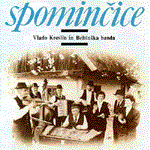
Versione slovena di Vlado Kreslin
(Album: "Spominčice", 1992)
Slovenian version by Vlado Kreslin
(from the LP "Spominčice", 1992)
Since about twenty years Vlado Kreslin has been playing a leading role in the field of Slovenian folk music. After his debut with the rock band "Martin Krpan", he started his solo career by composing a number of unforgettable songs. According to many, he's kind of Slovenian Fabrizio de André. Vlado Kreslin has a thirty years long career as a rock musician; his career as an author started about ten years ago.
Altre informazioni su Vlado Kreslin / Further information on Vlado Kreslin
"Lili Marleen je znamenita nemška pesem, najbolj priljubljena med drugo svetovno vojno. Besedilo je leta 1915 napisal Hans Leip, Norbert Schultze pa jo je leta 1938 tudi uglasbil. Originalni naslov pesmi je bil »Das Mädchen unter der Laterne« (Dekle pod laterno), vendar je postala poznana pod imenom Lili Marleen. Posnetki Lale Andersen in Marlene Dietrich so pomagali pri popularizaciji pesmi, ki je postala izjemno priljubljena kljub nasprotovanju nacističnega režima, še posebej Josepha Goebbelsa, ministra za propagando.
18. aprila 1941, po nemškem zavzetju Beograda, je bila Lili Marleen v izvedbi Lale Andersen predvajana na Radiu Beograd, ki je pod nemško oblastjo oddajal preko celotne Evrope. Pesem je bila na sporedu vsak večer ob 21.55. Poslušali so jo tako zavezniški kot nemški vojaki, s čimer se je širila njena popularnost.
V Sloveniji je predvsem znana slovenska izvedba Vlada Kreslina in Beltinške bande. Avtor besedila je Vlado Kreslin." - sl.wikipedia
Tamkaj pred kasarno,
poleg glavnih vrat,
stala je laterna,
k'je tam še od takrat.
Pod njeno žolto tam lučjo,
prijel te bom spet za roko,
kot že, Lili Marlen,
kot že, Lili Marlen!
Tam je majhen svet,
samo za naju dva,
kjer se tvoja senca
z mojo poigra.
In vsi ljudje naj vidijo,
da to je najino slovo,
s teboj, Lili Marlen
s teboj, Lili Marlen!
Tvoj korak samotno
odmeva v temo,
mojega že dolgo
ni več pod lučjo.
in ko bo svet temo pregnal,
le kdo bo pod laterno stal,
s teboj, Lili Marlen,
s teboj, Lili Marlen!
V vetru nad grobovi,
ki hlipa za vse nas,
sliši se kot v sanjah
tvoj ljubeči glas.
In ko bo svet meglo pregnal,
bom spet tam pod laterno stal,
s teboj, Lili Marlen
s teboj, Lili Marlen!
In ko bo svet meglo pregnal,
bom spet tam pod laterno stal,
s teboj, Lili Marlen
s teboj, Lili Marlen!
Versione spagnola anonima della División Azul
[ca. 1943]
Spanish "Blue Division" version. The author is unknown.
[about 1943]
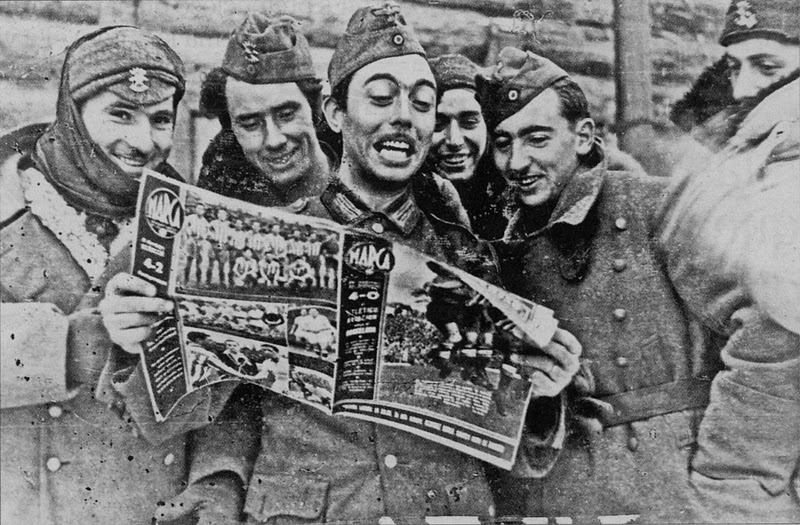
Da maneggiare con cura: la prima versione in assoluto di Lili Marleen in lingua spagnola è coeva (1942/43), ma nacque (come è del resto logico che fosse) nell'ambito della División Azul, la 250a Divisione di Fanteria della Wehrmacht formata interamente da circa 43.000 volontari spagnoli con cui il generalissimo Franco tentò di sdebitarsi con Hitler per il “gentile aiuto” fornitogli durante la Guerra Civile. La Spagna era ufficialmente neutrale, ma Franco non scoraggiò certo il “volontariato” della Blaue Division - e fu così che circa 4500 spagnoli morirono nella disfatta di Leningrado.
To be handled with care: the very first version of Lili Marlene in Spanish is from the same years as the German original (1942/43), but it originated (as it is rather logical) in the División Azul (Blue Division), the 250th Infantry Division of Wehrmacht totally formed by about 43,000 Spanish volunteers general Franco tried to repay Hitler with for his “friendly help” in the Civil War. Spain was officially neutral, but Franco did not discourage the Blue Division “volunteering” - that's why about 4,500 Spaniards died in the Leningrad defeat. [CCG/AWS Staff]
Bing Crosby, Jean-Claude Pascal, Freddy Quinn, Greta Garbo, Marlene Dietrich, Manuela y Marta Sánchez han grabado su voz con la música de Norbert Schultze y el texto de Hans Leip. Ninguno de ellos, sin embargo, ha logrado el éxito de su verdadera "creadora": Lale Andersen.
En principio Lale Andersen no se interesó por la melodía, dedicada como estaba a las canciones marineras de su Bremerhaven. Cuando en 1940 el compositor Norbert Schultze le ofreció incluir la melodía en su repertorio, no aceptó: cantaba ya una versión similar sobre "un soldado de guardia", de Hans Leip, sin que pudiera decirse que tuviera un gran eco. Únicamente cuando se dio cuenta de que la canción de Schultze gustaba, sobre todo al público de la radio, aceptó grabarla en disco. Pero la Alemania en guerra necesitaba otras canciones más excitantes y Lili Marleen no tardó mucho en desaparecer de la actualidad.
A mediados de 1941 Radio Belgrado -que transmitía programas para el Norte de África- pidió a Radio Viena nuevos discos. Un suboficial de Radio Belgrado seleccionó con el encargado del archivo una serie de grabaciones, entre ellas unas cuantas que llevaban la advertencia "pasados de moda". Por falta de otros mejores, Radio Belgrado emitió varias veces los que tenía a su disposición a partir del 18 de agosto de 1941. Hasta que intervino desde Berlín el ministro de Propaganda. Goebbels, que había ya roto por su cuenta una de las dos matrices originales, consideraba los versos "macabros" y la melodía excesivamente sentimental. Radio Belgrado no tuvo más remedio que retirar a Lale con su Lili.
Poco después empezaron a llegar peticiones de los soldados alemanes en África pidiendo que se repitiera la canción. La emisora reanudó la programación del disco utilizándolo como sintonía de cierre de su emisión de las 21,55 preguntando a Berlín si estaba de acuerdo.
Goebbels se indignó, pero no tuvo más remedio que aceptar "Lili Marleen" como refuerzo de la moral de la tropa, si bien cambiando la versión de Lale Andersen por una de marcha militar.
Una vez más protestaron los soldados exigiendo la versión antigua. Goebbels se rindió. Las otras emisoras alemanas imitaron a la de Belgrado. Diariamente se podía escuchar hasta treinta veces la voz de Lale Andersen cantando: "Vor der Kaserne, vor dem grossen Tor". La artista se hizo famosa de la noche a la mañana. Los soldados mandaban cartas a "Lili Marleen, Radio Belgrado" o a "Lale Andersen, Berlin, Alemania". Hasta ese momento había estado cantando en los casinos de oficiales sin atraer demasiado la atención: De repente la solicitaban de todas partes.
Vigilada por la GESTAPO "Ganaba mucho dinero -contó Lale (Elisabeth Carlotta Bunterberg era su verdadero nombre)- pero debido a la guerra mi estilo de vida no cambió en absoluto.
Goebbels dio orden a la Gestapo para que vigilara a la destinataria de millones de cartas de soldados. Durante un viaje a Italia -donde debía cantar ante heridos de guerra- se dirigió por escrito al compositor suizo Rolf Liebermann pidiéndole que la ayudara a huir a Suiza.
La Gestapo descubrió la carta y detuvo a la cantante Lale Andersen: "Me dijeron que aquello seria el final de mi carrera, que seria internada en un campo de concentración. Esa noche hubo tres alarmas aéreas; pensé que lo mejor era terminar cuanto antes y tomé todos los somníferos que tenía: volví a recobrar el sentido tres semanas más tarde..." Mientras tanto, la BBC de Londres dio la noticia de que Lale Andersen había sido internada en un campo de concentración, y que había muerto allí. A Goebbels se le presentaba la gran ocasión de demostrar cómo mentía la emisora inglesa. Lale Andersen tuvo que seguir actuando en público, prohibiéndosele revelar la obligación que tenía de presentarse dos veces por semana a la Gestapo, en Berlín. "Lili Marleen" desapareció de las ondas controladas por los alemanes a raíz de la derrota de Stalingrado, sin duda al no poder seguir considerándola como un tónico de la moral de combate.
Sin embargo, para entonces "Lili Marleen" había triunfado en todos los frentes como Lilli Marlene y Lily Marléne.
Cuando, tras semanas enteras de cerco, las tropas del "zorro del desierto", Erwin Rommel, conquistaron el fuerte norteafricano de Tobruk y entraron en la ciudad, los altavoces públicos difundían las voces de un trío femenino británico que entonaba el "Lady of the Lamplight-Lilli Marlene". Con la sorpresa del ataque, la emisora había olvidado desconectar los altavoces con el programa de la estación militar de El Cairo, dedicado a los soldados británicos. "Lilli Marlene" se había convertido en la melodía preferida de los soldados del 8º Ejército británico. Hans Leip, autor de la letra, afirmó al respecto: "Durante la primera contienda, el gran éxito fue "Its A Long Way to Tipperary", y revela lo suficiente sobre la falta de sentido de las guerras el que durante la segunda se reservara este honor a una melodía del enemigo".
En 1944 los británicos rodaron una película documental con el titulo: "The True Story of Lilli Marlene". En ella contaba el escritor Tommie Connor cómo a principios de 1942 la BBC le había encargado de poner letra a la popular melodía, de manera que los soldados vieran en "Lilli Marlene" a la hija, la madre, la hermana o la novia.
Cuenta Connor: "Francamente, al principio me quedé desconcertado. Después musité una oración y en 25 minutos estaba hecho el texto. De la primera versión con Anne Shelton se vendieron en pocas semanas un millón de discos".
Cuando a principios de marzo de 1942 las tropas germano-italianas ocuparon Cirenaica, el "Daily Herald" comentaba amargamente el desarrollo de la batalla, ascendiendo a general a la modesta Lili/Lilli, que se había revelado tan débil en su calidad de inspiradora de las tropas británicas, como demostraba el éxito de "su colega Rommel". Por todas partes donde ondeó hasta 1945 la bandera de la Union Jack se siguió cantando:
"... was there that you whispered tenderly, that you loved me, you'd always be... my own Lilli Marlene".
Cuando el 12 de julio de 1948 salieron de Inglaterra en dirección a la patria los últimos 546 prisioneros alemanes, embarcaron cantando el "Lili/Lilli". Cuatro años después de terminadas las hostilidades, una noche primaveral en la Riviera, donde descansaba, el ex premier británico Winston Churchill pidió a la orquesta que interpretara "Lilli Marlene". Al aparecer a la noche siguiente en el local, la orquesta le saludó con las notas de la canción solicitada por él 24 horas antes; Churchill -75 años- se opuso: "Esa canción que con tanta emoción había escuchado la noche anterior traía a la memoria el recuerdo de mucha sangre y muchas lágrimas" (Hans Leip).
"Lili Marleen" ha recorrido el mundo interpretada en 27 idiomas y con 40 letras distintas; siempre con la misma música, siempre con el mismo nombre. Cada traducción, cada adaptación ha dado al texto un nuevo giro sin cambiar el sentido inicial de Hans Leip.
"Dame una rosa y estréchala sobre mi corazón", cantan los italianos. Los franceses recuerdan: "Delante del cuartel, cuando el día se va". Y los japoneses, más heroicos: "Por ti quiero luchar, morir y resucitar". Ya durante la guerra un periódico suizo explicó el inesperado éxito de "Lili": "El secreto de la popularidad de esta melodía se debe sin discusión alguna a su limpieza de espíritu, para la que el soldado en peligro posee una grande y secreta sensibilidad que comparte y le solidariza con sus compañeros de infortunio. La canción se ha convertido, por encima del odio y el fragor de los combates, en un lazo de unión entre los pueblos, sin parangón en la historia".
El éxito de "Lili" sirvió, sobre todo, a su compositor Norbert Schultze. El presidente de la Cámara Musical del Reich, director de orquesta profesor Peter Raabe, inscribió al querido colega en la lista de "artistas creadores" que debían estar exentos del servicio militar. Norbert Schultze supo cumplir puntualmente con el ruego de ponderar el nuevo orden y la revolución nacional.
Accediendo a esto compuso la música de la película propagandística "Feuertaufe", sobre la invasión de Polonia. La música para la película "Bomben auf Engeland", sobre la batalla de lnglaterra. A petición de Rommel, subrayada con un envió de café y licores hecho por el mariscal, la marcha "Panzer rollen in Afrika". Con motivo de la proclamación por Goebbels de la guerra total, "¡Führer befiehl!" En total Schultze entregó a sus mecenas nacionalsocialistas 25 canciones "patrióticas". No sintió el menor remordimiento. En 1967 declaró al periodista Derek Jewell, del "New York Times", que trabajaba en la historia de "Lilli Marlene":
"No puedo arrepentirme de haber escrito todas esas melodías. Eran una exigencia de la época, no mía. Otros disparaban. Yo componía canciones.
¿No hicieron otros compositores lo mismo por su patria?... Pero comprendo la manera de pensar de la gente hoy. Se acuerdan de los tiempos en que escuchaban mi marcha por la radio y exclaman: "¡Dios mío, ése es el hombre que compuso esa maldita música!"
De manera muy diferente de lo que piensan muchos sobre Norbert Schultze, pensaba el general Dwight D. Eisenhower (después presidente de los EE UU) sobre el autor de la letra, Hans Leip. Eisenhower, cuyas tropas habían entrado en París al compás de las notas de "Lilli Marlene" en 1944, supo durante una inspección a la División Regenbogen -en 1945, en Tirol- que se encontraba allí Hans Leip, y quiso conocerlo.
-Tráigame a ese hombre -dijo a su ayudante.
El ayudante informó al general:
-Son las 10, la hora en que suele irse a la cama.
El soldado no podía saber que Leip, desde hacia tiempo, acostumbraba a acostarse antes de las 21,55 con objeto de no caer en la tentación de escuchar "Lili Marleen" por Radio Belgrado.
Eisenhower replicó: "No le molestemos entonces, es el único alemán que durante la guerra alegró al mundo entero".
http://www.editorialbitacora.com/armag...
Al salir de España
Sola se quedó,
llorando mi marcha
La niña de mi amor.
Cuando partía el tren de allí
Le dijo así mi corazón:
Me voy pensando en ti,
Adiós, Lili Marlen.
Aunque la distancia
Vive entre los dos,
Yo siempre estoy cerca
De tu claro sol,
Pues cuando tu carta llega a mí,
Se alegra así mi corazón,
Que sólo pienso en ti,
Soñando con tu amor.
Cuando vuelva a España
Con mi División
Llenará de flores
Mi niña su balcón.
Yo seré entonces tan feliz
Que no sabré mas que decir:
Mi amor, Lili Marlen,
Mi amor es para ti.
inviata da Riccardo Venturi - 25/3/2005 - 18:23
Versione cantata dall'esercito cileno nel secolo XX. Esiste una versione interpetrata dai marinai, con un testo diverso.
Altra versione spagnola (cilena), probabilmente degli anni attorno al 1945.
Another Spanish version (from Chile), probably dating from 1945 or so.
Dopo la versione della División Azul spagnola, ecco quella dell'Esercito Cileno; con tutta probabilità, risale a circa il 1945. In questa pagina, per la stessa natura di questa canzone nata in mezzo e dentro a due guerre mondiali, eserciti e soldati sono presenti in ogni riga e, spesso e volentieri, non si tratta di entità particolarmente gradevoli (a cominciare dalla Wehrmacht in cui nacque; ma, va detto, non risulta che Lili Marleen sia mai stata una canzone favorita dalle SS). Scorrendo adesso le versioni in spagnolo, ci si deve imbattere anche nell'esercito cileno; logico che venga quantomeno a mente quel che accadde l'11 settembre 1973, ed anche delle voci di oppositori imprigionati ai quali la canzone veniva fatta cantare a forza (vedi ad esempio questa poesia, “Caminos”, di Aristóteles España). La Lili Marleen cilena qui presente è in forma, naturalmente, di marcia militare; fortunatamente per lei, è stato appurato che il generale Pinochet preferiva un'altra marcia, pur sempre di origine tedesca: Erika. [RV]
After the version of the Spanish “Blue Division”, here's that of the Chilean army; its origin is to be traced back to 1945 or so. Due to the very nature of this song, originating in and between two world wars, armies and soldiers are everywhere in this page; and, as you can imagine, this may be often unpleasant (as in the case of the Wehrmacht, where the song originated; but, it must be said, Lili Marlene has never been a favorite SS-song). As for the Spanish versions we are giving now, we have to come across the “Ejército de Chile”, too; and it's rather logical to recall the Chilean golpe of September 11, 1973 and also the voices of imprisoned opponents who had to sing this song by force (see this poem, “Caminos”, by Aristóteles España). The Chilean Lili Marlene is, of course, in form of a military march; happily enough, general Pinochet liked best another German march. Erika. [RV]
Bajo la linterna,
frente a mi cuartel
Se que tu me esperas,
mi dulce amada bien.
Y tu corazón al susurrar,
bajo el farol,
latiendo está.
Lili, mi dulce bien
eres tu Lili Marleen.
Cuando llega un parte
y debo marchar
sin saber querida
si voy a regresar
se que me esperas
siempre fiel,
bajo el farol,
frente al cuartel
Lili mi luz de fe
eres tu Lili Marleen
Si en el frente me hallo,
lejos, ay! de ti
oigo que tus pasos
se acercan junto a mi.
Y se que allá
me esperas tu,
junto al farol,
plena de luz
Lili mi dulce bien
eres tu Lili Marleen.
inviata da Cristián Ramírez Múñoz - 25/3/2005 - 18:25
La versione fatta uscire nel 1986 dal gruppo pop spagnolo "Olé Olé" nel loro album "Los caballeros las prefieren rubias".
These are the lyrics of a version of the song released in 1986 by the Spanish pop group "Olé Olé", in their LP "Los caballeros las prefieren rubias".
Esa mina en ruinas sabe que pasó
Mira mi uniforme, mama me lo cosió
Fui un mal soldado, me vendí
Pero al final he vuelto a ti
Por ti, Lili Marlen
Por ti, Lili Marlen
Yo busque la muerte, casi la encontré
Nunca me escribiste, nunca te escribí
Pero maté pensando en ti
Jamás lloré, jamás te vi
Por ti, Lili Marlen
Por ti, Lili Marlen
Nunca me dijeron que es lo que hay que hacer
Salvece quien pueda, locos al poder
Y una explosión me habló de ti
Lili esta mal, Lili esta bien
Por ti, Lili Marlen
Por ti, Lili Marlen
No te envenes, deja de llorar
Quise ser un héroe, otra vez será
No fui un valiente, ya lo sé
Me siento mal, me siento bien
Por ti, Lili Marlen
Por ti, Lili Marlen
inviata da César Álvarez - 13/8/2007 - 19:06
Versione dei Los Muertos de Cristo nell'album A las Barricadas/Rapsodía Libertaria. Volumen II (2007)
Spanish version by Los Muertos de Cristo from the Album A las Barricadas/Rapsodía Libertaria. Volumen II (2007)
Dopo le Divisiones Azules e gli eserciti cileni, una Lili Marleen in spagnolo dovuta alla punk band anarchica (non genericamente anarchica: dichiaratamente anarchica e militante) Los Muertos de Cristo; e qui, come è lecito attendersi, la musica cambia radicalmente e non solo dal punto di vista delle sette note. In un album intitolato A las barricadas, ci ritroviamo trasportati in pieno nella guerra civile spagnola. Il brano inizia con la trasmissione radiofonica (originale) del famoso Último parte della guerra civile, il comunicato (redatto da Francisco Franco in persona) del 1° aprile 1939 con cui si annunciava la vittoria definitiva e la disfatta delle forze repubblicane: la Spagna piombava nella dittatura franchista durata fino alla morte del Generalissimo (1975). La Lili Marleen dei Muertos de Cristo, sotto il fanale, aspetta il miliziano che ama e che le aveva promesso di condividere assieme i sogni di libertà. Ma il miliziano giace morto, solo, in una trincea. La storia insegna contro chi si deve lottare e spezza i sogni. Come si può vedere, si tratta di una Lili Marleen che intende riequilibrare i conti, e vi riesce benissimo; quel che, invece, è riuscito malissimo, è la trascrizione del testo presente ovunque in rete. Un'accozzaglia di errori di ortografia e di incomprensioni che qualcuno deve avere fatto chissà quando, e che tutta la Rete (in particolare i famosi “Lyrics Sites”, che sono centinaia ma tutti uguali) ha ripreso; da segnalare “del amado de Lili” che era diventato un misterioso “del llamado ladyby”. Come (quasi) sempre ci vogliono le CCG per mettersi un paio di cuffie e trascrivere il testo correttamente. [RV]
After Blue Divisions and Chilean armies, here's a Spanish Lili Marleen by the anarchist punk band (not vaguely, but openly anarchist and militant), Los Muertos de Cristo (“Christ's Dead”); and, as one may expect, there's a radical change in the music, and not only in the seven notes. In an album called A las barricadas, we are suddenly transferred to the atmosphere of the Spanish civil war. The song begins with the (original) radio broadcasting of the famous Último parte of the civil war, the war communiqué (personally written by Francisco Franco) of April 1st, 1939 announcing the final victory and the defeat of the Republican forces: Spain plounged into Franco's dictatorship, that lasted until his death (1975). The Lili Marleen of Los Muertos de Cristo is waiting, under the lamplight, for the Militian she loves and who promised her to share dreams of freedom; but the Militian lies dead, alone in a trench. History teaches who you have to fight against and breaks dreams. As you can see, this Lili Marleen wants to balance the weights, and does well the task; what is very badly done, however, is the lyrics transcription you can see everywhere on the Web. A motley collection of misspellings and misunderstandings someone must have done God knows when, and that the whole Web has reproduced (and, in particular, the famous “Lyrics sites” that are hundreds, but all equal); to be specially remarked “del amado de Lili”, becoming a mysterious “del llamado ladyby”. As (almost) always, AWS have to take a pair of earphones and transcribe the lyrics correctly. [RV]
”En el día de hoy, cautivo y desarmado el ejército rojo, han alcanzado las tropas nacionales sus últimos objetivos militares. La guerra ha terminado. Burgos, 1° de abril 1939, año de la victoria. El generalísimo Franco.”
Bajo una farola se marchita una flor,
Lili Marlen espera al miliciano que la amó
Al partir al frente le prometió
Volver aquí junto a su amor,
Compartir los sueños de libertad
Que aportará la revolución
¡Adios Lili Marlen!
¡Adios Lili Marlen!
Sobre las trincheras en la oscuridad
Yace el cuerpo inerte del amado de Lili
Cuando en la batalla muerto calló
Nadie gritó, nadie lloró,
Sólo una foto y la soledad
Acompañó su triste final.
¡Adios Lili Marlen!
¡Adios Lili Marlen!
¡Adios Lili Marlen!
¡Adios Lili Marlen!
La historia nos enseña con quién hay que luchar,
Muestra el enemigo, también está detrás
Rompiendo los sueños del dilema de,
De transformar este bordel,
¡Adios Lili Marlen!
¡Adios Lili Marlen!
¡Adios Lili Marlen!
¡Adios Lili Marlen!
¡Adios Lili Marlen!
¡Adios Lili Marlen!
Espero volverte a ver.
inviata da DonQuijote82 - 19/4/2014 - 15:41
”In data odierna, fatto prigioniero e disarmato l'esercito rosso, le truppe nazionali hanno raggiunto i loro ultimi obiettivi militari. La guerra è terminata. Burgos, 1° aprile 1939, anno della vittoria. Il generalissimo Franco.”
Sotto un lampione un fiore cammina qua e là,
Lili Marleen aspetta il Miliziano che la amò
Quando partì per il fronte le aveva promesso
Di tornare qui insieme al suo amore,
Per condividere i sogni di libertà
Che porterà la rivoluzione
Addio, Lili Marleen!
Addio, Lili Marleen!
Nelle trincee dentro all'oscurità
Giace inerte il corpo dell'amato di Lili
Quando in battaglia tacque morto
Nessuno gridò, nessuno pianse
Solo una foto e la solitudine
Accompagnarono la sua triste fine.
Addio, Lili Marleen!
Addio, Lili Marleen!
Addio, Lili Marleen!
Addio, Lili Marleen!
La storia c'insegna contro chi si deve lottare,
Indica il nemico e anche lei è con noi
Spezzando le fantasie del dilemma
Di come trasformare questo casino,
Addio, Lili Marleen!
Addio, Lili Marleen!
Addio, Lili Marleen!
Addio, Lili Marleen!
Addio, Lili Marleen!
Addio, Lili Marleen!
Spero di riverderti.
Versione del gruppo punk spagnolo (1983). Talmente famosa la loro versione di Lili Marleen, che la band era conosciuta anche come "Los chicos del Lili Marlén".
Lili Marlene espera al soldado quien amó
Dulce era la vida
Y el prometió
Volver aquí junto a su amor
Adiós, Lili Marleen
Adiós, Lili Marleen
Sobre las alambradas 40 años
Yace el cuerpo inerte del soldado de Lilí
Cuando en la batalla muerto callo
Nadie grito nadie lloró
Adiós, Lili Marleen
Adiós, Lili Marleen
En Stalingrando, en Euroshima o en Berlín
También en las Malvinas en Corea o en Vietnam
Murió la esperanza de vivir
De abandonar aquel burdel
Adiós, Lili Marleen
Lili Emborráchate!
Adiós Lili Marleen
Lili Emborráchate!
Adiós Lili Marleen
Lili Emborráchate!
Adiós Lili Marleen!
Lili Emborráchate
inviata da dq82 - 24/7/2015 - 11:02
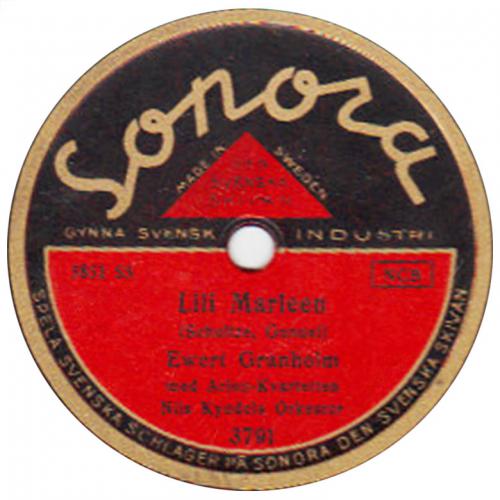
Versione svedese di Gunilla (Gunilla Sandberg, 1942), interpretata da Evert Granholm
Swedish version by Gunilla (Gunilla Sandberg, 1942), performed by Evert Granholm
"Il danese non era certamente una traduzione, assolutamente lontana dall'originale. Invece ho trovato una versione svedese, non è una traduzione esatta ma abbastanza vicina quanto a contenuto".
"The Danish version was no translation, it was very different from the original. However, I've found out a Swedish version, it is no exact translation but it's close enough to the original lyrics as for its contents".
La versione svedese di Lili Marleen è in realtà tra quelle più antiche: risale allo stesso 1942 che sembra essere regolarmente l'anno dell' “esplosione” della canzone. L'autrice del testo si faceva chiamare semplicemente “Gunilla”, ma si chiamava in realtà Gunilla Nordström. Era nata il 25 giugno 1919 a Stoccolma ed era figlia di un noto dentista che si dilettava di entomologia. Nel 1941 si era sposata con il cantante Sven-Olof Sandberg (1905-1974), da cui il nome con cui è nota: Gunillla Sandberg. Gunilla è morta a Stoccolma il 7 aprile 1995. La sua traduzione di Lili Marleen fu incisa per la prima volta nel 1942, su disco Sonora, dall'attore e cantante Evert Anton Sigvard Granholm, che in arte aveva generalmente mutato la “v” del suo nome in “w”: “Ewert Granholm”. Fu anche in Svezia un successo formidabile (e dire che la Svezia era un paese neutrale...). Evert Granholm era nato a Ed, in provincia di Stoccolma, il 18 luglio 1906; a volte cantava sotto lo pseudonimo di Sigge Ewert. È morto il 1° settembre 1996 a Solna.
The Swedish Lili Marleen can be numbered among the oldest versions of the song in any language: it was composed in 1942, the year of its world “explosion”. The lyrics author was known simply as “Gunilla”, but her real name was Gunilla Nordström. She was born on June 25, 1919 in Stockholm, the daughter of a renowned dentist who also had an interest in entomology. She was married 1941 to the singer Sven-Olof Sandberg (1905-1974), hence the name she is best known with: Gunillla Sandberg. Gunilla died in Stockholm on April 7, 1995. Her translation of Lili Marleen was first recorded 1942 on a Sonora plate by the actor and singer Evert Anton Sigvard Granholm, whose artist's name had a “w” instead of “v”: “Ewert Granholm”. The song enjoyed strong success in Sweden too (think Sweden was a neutral country...). Evert Granholm was bord in Ed, in the Stockholm district, on July 18, 1906; he used to sing also under the name of Sigge Ewert. He died in Solna on September 1st, 1996.
Texten skrevs 1915 av poeten Hans Leip (1893-1983). År 1937 publicerades en samling med Leips dikter där denna ingick, och då hade de två sista av de fem verserna tillkommit. Norbert Schultze (1911–2002) komponerade 1938 melodin och sången spelades in i augusti 1939 av Lale Andersen (riktigt namn Liese-Lotte Bunnenberg, 1905–1972). Sedan tyskarna ockuperat Jugoslavien försommaren 1941 började de sända militärradio från Belgrad. En löjtnant som var placerad där köpte under en permission i Wien en bunt skivor och bland dessa fanns den dittills okända sången som endast sålts i cirka 700 exemplar. Sändningarna kunde höras av tyska och allierade trupper runt hela östra Medelhavet och Lili Marleen blev så omtyckt att den efter en tid sändes varje kväll som avsignatur klockan 21:55. På så vis fick sången stort genomslag på båda sidor under kriget. Sången ogillades av tyske propagandaminister Joseph Goebbels som först förbjöd den, för att senare beordra Lale Andersen att spela in en något annorlunda version (juni 1942) för tyskt hemmabruk.
Den första engelska texten skrevs av Tommy Connor och sången framfördes av Anne Shelton. 1944 gjorde bland annat amerikanen Perry Como en ny version av sången. Efter kriget lanserade Marlene Dietrich den igen och den gick in på skivlistorna i USA 1968, Tyskland 1981 och Japan 1986. Inspelningar av Lili Marleen har genom åren gjorts på många språk (troligen cirka 50). Ewert Granholm gjorde den första på svenska 1942, samma år som Georg Malmstén gjorde den på finska med kvinnonamnet utbytt till Liisa (sic!). Ewert Granholm gjorde en ny inspelning tillsammans med Simons 1992 på albumet melodier vi minns. Texten behandlar tidlösa känslor som drömmar och längtan efter den man älskar, rädslan för att dö eller bli övergiven. Sången har mestadels framförts av kvinnor, dock är den till sitt innehåll en mans kärleksförklaring till en kvinna.
Hootenanny Singers inspelning av sången låg på Svensktoppen i åtta veckor 1966. Även Anita Lindblom och Sven Olof Sandberg har gjort en inspelning av sången. - sv.wikipedia
Klar liksom en stjärna
vid kasernens dörr
lyste en lanterna,
den finns där nu som förr.
På trottoarens nötta sten
jag möter dej i lyktans sken
som förr, Lili Marleen,
som förr, Lili Marleen.
Tätt intill varandra
stod vi hand i hand.
Ingen kunde klandra
jag stal en kyss ibland.
Vad gjorde det, om vinden ven -
vi stod i lyktans trygga sken.
vi två, Lili Marleen,
vi två, Lili Marleen.
Nu ropar vakten:
Kom in, ty tapto går.
Du hörde nog på takten,
jag inte dröja får.
Men det är svårt att ej bli sen,
när i min famn vid lyktans sken
du är, Lili Marleen,
du är, Lili Marleen.
För mitt öga står du,
dina läppar ler,
all min längtan får du,
i drömmen jag dig ser,
så som du stod i lyktans sken
en avskedsstund, då vinden ven.
Farväl, Lili Marleen
farväl, Lili Marleen.
inviata da Riccardo Venturi - 25/3/2005 - 20:02
Contributed by DonQuijote82. It is a non-rhythmic, literal Turkish translation reproduced from the big Lyricstranslate site. The Turkish introduction is reproduced from tr.wikipedia. [CCG/AWS Staff]
Lili Marleen II. Dünya Savaşı sırasında ün kazanmış Alman şarkısı. Orijinal sözleri 1915'de I. Dünya Savaşında rus cephesinde savaşan Hans Leip tarafından yazıldı, daha sonra "Nöbetteki Genç Askerlerin Şarkısı (Das Lied eines jungen Soldaten auf der Wacht) olarak yayınlandı. Müziğini Norbert Schultze 1938'de besteledi.
Şarkının orijinal ismi "Lambanın altındaki kız" ( Almanca,Das Mädchen unter der Laterne)'dı fakat "Lili Marleen" olarak ün kazandı.
Lale Andersen tarafından 1939'da Marlene Dietrich'in sesi ile kayıt edilmesi şarkının ününü arttırdı. Nazi rejimine ve Joseph Goebbels'in sayesinde Nazi propagandası olarak kullanılmasına rağmen popüler olmayı başardı. Bununla birlikte 1941'de Belgradın işgali sonucu Belgrad Radyosu'nun Alman ordusunun radyosu haline gelmesi ile bütün Avrupa ve Akdeniz de yayınlandı. Radyoda Andersen'in kaydı çalınmaktaydı. Her akşam saat 21:55'de çalınmakta ve hem Alman hem de müttefik askerleri tarafından ilgiyle dinlenmekteydi.
İtalyada, Müttefikler tarafından sözleri değiştirilerek D-Day Dodgers şarkısı yaratılmış, ayrıca savaşın almanların aleyhine dönmesi ile de ruslar tarafından sözleri değiştirilmiştir. Şarkının ingilizce versiyonu İngilterede Jill Daniels tarafından yorumlamıştır.
Kışla kapısının önündeki fener
Eskiden de oradaydı, şimdi de orada
Orada tekrar görüşsek ya
Dursak yine lambanın altında
Tıpkı eskisi gibi, Lili Marleen
Tıpkı eskisi gibi, Lili Marleen
İkimizin gölgesi sanki birdi
Birbirimizi nasıl sevdiğimiz kolayca görülebilirdi
Ve herkes yine görmeli
Bizi lambanın altında
Eskisi gibi, Lili Marleen
Eskisi gibi, Lili Marleen
Derken nöbetçi seslendi
'Yat borusunu çalıyorlar, üç gün cezası var!' dedi
'Hemen geliyorum, yoldaş' dedim
Ve sana veda ettim
Ah, oysa ki nasıl isterdim gelmeyi
Seninle, Lili Marleen
Seninle, Lili Marleen
Yerinde adımların, zarif yürüyüşün
Akşam boyu parlıyordur, ama beni unutalı çok olsa gerek
Bana bir şey olursa eğer
Kim kalacak lambanın altında
Seninle, Lili Marleen?
Seninle, Lili Marleen?
Sessiz odalardan, yerin yatağından
Aşk dolu dudakların, bir rüya gibi, beni kaldırıyor
Sabahın sisi dağıldığında
Lambanın altında olacağım
Tıpkı eskisi gibi, Lili Marleen
Tıpkı eskisi gibi, Lili Marleen
inviata da DonQuijote82 - 19/4/2014 - 11:12
Осяває браму світло ліхтаря,
У вечірнім небі згасла вже зоря.
Біля казарм, під ліхтарем,
Юнак чека Лілі Марлен,
Свою Лілі Марлен,
Свою Лілі Марлен.
Пам'ятаєш мила, як ми до рання
Не могли розстатись в світлі ліхтаря...
Вже жваво гра сурмач "Зорю",
І цілий полк завмер в строю
А я - з Лілі Марлен,
Я все з Лілі Марлен...
Прокричали з варти: "Підеш під арешт!"
Та всміхнеться доля нам у решті решт!
І знов у світлі ліхтаря
Зустрінемось, любов моя,
Моя Лілі Марлен,
Моя Лілі Марлен!
Витончену ходу вивчив вже ліхтар,
Як підборів стукіт - молодий чотар
А якщо дійде до біди,
Хто прийде під ліхтар сюди,
Моя Лілі Марлен,
Моя Лілі Марлен?
Навіть з того світу повернуся я,
З під землі повстану та із небуття,
Чарівний поцілунок твій
Як оберіг мені на бій
Моя Лілі Марлен,
Моя Лілі Марлен.
Ośavaje bramu svitlo lixtaŕa,
U večirnim nebi zhasla vže zoŕa.
Bilja kazarm, pid lixtarem,
Junak čeka Lili Marlen,
Svoju Lili Marlen,
Svoju Lili Marlen.
Pam'jataješ myla, jak my rannja
Ne mogli rozstatyś v svitli lixtaŕa...
Vže žvavo hra surmač “Zoŕu”,
I cilyj polk zavmer v stroju
A ja – z Lili Marlen,
A ja – z Lili Marlen
Prokryčali z varti: “Pideš pid arešt!”
Ta vsmixneťśa dolja nam u rešti rešt!
I znov u svitli lixtaŕa
Zustrinemoś, ljubov moja,
Moja Lili Marlen,
Moja Lili Marlen!
Vytončenu xodu vyvčyv vže lixtar,
Jak pidboriv stukit – molodyj čotar
A jakšćo dijde do bidy,
Xto pryjde pid lixtar śudy,
Moja Lili Marlen,
Moja Lili Marlen?
Nabiť z toho svitu povernuśa ja,
Z pid zemli povstanu ta iz nebuttja,
Čarivnyj pocilunok tvij
Jak oberih meni na bij
Moja Lili Marlen,
Moja Lili Marlen.
inviata da Riccardo Venturi - 22/7/2014 - 02:26
![Ilona Nagykovácsi [énekel "canta/sings"]](img/upl/nagykovacsi.jpg)
Versione ungherese anonima.
E' stata interpretata per prima nel 1942 dalla cantante Ilona Nagykovácsi. La versione si distingue per l'abbandono totale del nome Lili Marleen per il locale Márika
Hungarian version. The author is unknown.
It was first interpreted 1942 by the singer Ilona Nagykovácsi. This version is remarkable for the purely Hungarian name Márika instead of Lili Marleen.
Nota. Ricordiamo che secondo l'uso ufficiale ungherese il cognome precede sempre il nome, così come presentato nell'intestazione.
Note.According to the official use in Hungary, the family name always comes first, as shown in the header.
L'autore dei versi della versione ungherese più antica è rimasto anonimo, oppure in Rete ancora non si è riusciti a reperirlo; l'interprete, Ilona Nagykovácsi, è stata invece una delle più note artiste magiare dell'epoca. Nata a Jászárokszállás, cominciò a esibirsi negli anni '20 al teatro Royal Orfeum di Budapest assieme ad artisti come László Békeffi e László Vadnay. Nel 1933 la ritroviamo al teatro di Via Andrássy e nel '34 al teatro Terézkörúti; nel 1936 canta alcune canzoni su testo del poeta Endre Ady musicate da János Kurucz. Negli anni '40 diviene famosa alla radio con canzoni scritte da Tibor Polgár, che diverrà il suo secondo marito. Nel dopoguerra si esibisce in altri teatri e cabaret; fugge dall'Ungheria dopo la rivolta del 1956 e si stabilisce a Toronto, in Canada.
The lyrics author of the oldest Hungarian version still remains unknown, or was not to be found yet on the Web; the singer, Ilona Nagykovácsi, was one of the best known Hungarian artists of that time. Born in Jászárokszállás, she started performing in the 20s in Budapest's Royal Orfeum theatre together with artists like László Békeffi and László Vadnay. She performed 1933 at the Andrássy street theatre, and 1934 at the Terézkörúti theatre; she also performed 1936 a number of songs drawn from poems by Endre Ady and set to music by János Kurucz. She became a radio celebrity in the 40s with songs written by Tibor Polgár, later to become her 2nd husband. She performed in other theatres in the postwar years; she fled from Hungary after the 1956 revolution and settled in Toronto, Canada.
Csöndes az éjjel,
sehol semmi fény
őrszem áll a vártán,
derék magyar legény,
nagy Muszkaföldről gondol rám,
a sóhajtása száll hozzám
szeretlek Márikám,
szeretlek Márikám
Üzenetem néki
míg csak leírom,
könnyeimtől ázik
a levélpapírom
elküldöm mégis gyorspostán,
mert érzem, épp most gondol rám
felsóhajt Márikám,
felsóhajt Márikám
Kinn a Muszkaföldön
tombol már a tél
Jancsikám szívébe
a síró szél zenél
s ő egyre ott áll a vártán,
szerelmes szívvel csak vár rám
s azt súgja: Márikám,
szeretlek Márikám
Amióta elment
róla álmodom,
érte szenvedek
és csak néki szól dalom
elbúcsúzott ottan némán,
csak annyit mondott: várj énrám
én szívem, Márikám,
én szívem, Márikám
Istenem teremtőm
adj szívembe erőt,
ne kelljen már várnom,
hozd vissza nékem őt,
add hogy ne sírjak én árván,
ki tárt karral és úgy vár rám
úgy súgja: Márikám,
szerelmem, Márikám.
inviata da Riccardo Venturi - 25/3/2005 - 18:30
Anna Ézsöl, in arte Anna Kelly (“Kelly Anna” secondo l’uso ungherese), nata a Léva (l’attuale Levice in Slovacchia) il 6 ottobre 1919 e morta a Budapest il 10 gennaio 1965 è stata una famosa cantante operettistica ungherese degli anni ’40, quando svolse anche un’apprezzata carriera come ballerina. La sua versione di Lili Marleen, intitolata Én édes angyalom („Io, dolce tuo angelo”) è del 1943. Nel 1948 Anna Kelly sposò il musicista rumeno Mihai Vasilopol e, col nome di Anna Vasilopol divenne primadonna del Teatro dell’Operetta di Bucarest.
(Bp., 1919. okt. 6.–Bp., 1965. jún. 10.): énekesnő, előadóművésznő. Magánúton tanult énekelni, 1940-től lépett fel táncdalokkal, operettrészletekkel. 1941-ben szerepelt a Margitszigeti Szabadtéri Színpadon, 1943-ban a Fővárosi Operettszínházban. Mintegy 60 lemezfelvétele készült a Pátria Lemezgyárban. Az ún. kívánságműsorok kedvelt énekesnője, népszerű előadóművésznője volt. 1948-ban Romániába ment férjhez, ahol a bukaresti Operettszínház primadonnájaként Anna Vasilopol néven játszott. F.Sz. Glavari Hanna (Lehár F.: A víg özvegy); Angela (Lehár F.: Luxemburg grófja).
Hans Leip német költő az első világháború idején két barátnőjét, Lilit és Marleent egy versben örökítette meg. A vers először 1937-ben jelent meg egy kötetben „Fiatal őrtálló katona dala” címmel. Norbert Schultze a verset 1938-ban megzenésítette. A lemezt Lale Andersen népszerű énekesnővel készítették el. Amikor 1941-ben a németek elfoglalták Jugoszláviát, a belgrádi rádióban olyan hanglemezeket játszottak le, amik éppen kéznél voltak, köztük a Lili Marleent.
A dal hihetetlen hatást gyakorolt az otthonuktól távol lévő katonákra, emiatt le is vették a műsorról, Németországban pedig Lale Andersent 1942-ben átmenetileg eltiltották a fellépésektől. A katonák tiltakozásának hatására később a belgrádi rádió műsorába visszakerült a dal, sőt, minden este ezzel zárták az adást. Lale Andersen egy év múlva megint felléphetett, de a Lili Marleent nem énekelhette.
Egy anekdota szerint 1941 májusában a német Afrika-hadtest és a brit nyolcadik hadsereg nézett farkasszemet Tobruknál. Este tízkor megszólalt a Lili Marleen a légierő zenekara kíséretében, mire az angol katonák átkiabáltak a németeknek: „Bajtársak, hangosabban”. A szövetségesek kénytelenek voltak elkészíteni a saját verziójukat. 1944-ben kiadták a Lili Marleen angol nyelvű változatát egy angol énekesnő, Anne Shelton lemezével. Marlene Dietrich a frontokon turnézva pedig
már 1943-tól énekelte a dalt.
Werner Fassbinder a dal legendáját feldolgozva filmet készített Lili Marleen címmel. - hu.wikipedia
Kívül a kaszárnyán, kint a kapunál,
Lámpa lángolt árván, most is ottan áll.
Szívembe zárna két karom,
A lámpás égne a falon,
Mint akkor, angyalom!
Én édes angyalom.
Kettőnknek árnya egybeolvadott,
És a vén kaszárnya csak egyre hallgatott.
Hozzád repül ma kis dalom,
De el nem ér a két karom.
Mint akkor, angyalom!
Én édes angyalom.
Emlékezel még, drága kedvesem?
Trombitált az őrség! Én szerelmesem!
Mért is csitult el halk dalom?
Be kellett volna vallanom:
Szeretlek, angyalom!
Én édes angyalom!
Száll a szél a szárnyán, vaksötét az ég,
S otthon a kaszárnyán régi lámpa ég.
Jaj, hogyha éltem itt hagyom,
A láng csak ég a kőfalon.
Mint akkor angyalom!
Én édes angyalom!
Úgy fáj a lelkem, mit felelhetek?
Lámpaként, szerelmem, mindig ott leszek.
Távol boríthat sírhalom,
Örökké rólad álmodom,
Mint akkor, angyalom!
Én édes angyalom.
inviata da Riccardo Venturi - 29/7/2014 - 01:34
A Vietnamese translation of the 1st verse of the song has been found and reproduced from this Newvietart page together with a short historical outline (there's no Vietnamese Wikipedia page on the subject, up to now). The translation seems to have been conducted on the English version.
Những câu hát đó đã được hấu hết tất cả những người lính của cả 2 phía - Quân đội Đồng Minh và Quân đội Đức Quốc Xã thời Đệ Nhị Thế Chiến , họ ưa chuộng , họ đã nghe, họ đã hát một mình, hát với những chiến hữu bạn bè, hát khi vui , hát lúc buồn... không biết bao nhiêu lần. " Lili Marleen " bản nhạc bán chính thức của quân đội trên tất cả các mặt trận và là một bản nhạc luôn luôn đứng đầu trong những danh sách các bản nhạc được phổ biến trong đại chúng trên thế giới ngay từ ngày chấm dứt chiến tranh đến nay : bài hát của lịch sử và bài hát muôn đời đi vào lịch sử .
Bài hát khời nguồn từ năm 1915 trong Đệ Nhất Thế Chiến, thời gian mà Hans Leip ( sinh năm 1893 và mất năm 1983 ), một người lính Đức, bị đổi đi mặt trận Nga. Ông này đã sáng tác một bài thơ với chủ đề về tình yêu và sự ly biệt. Bài thơ được ông đặt tên là " Lili Marleen " , tên ghép của hai tục danh : Lili là tên người yêu của ông và Marleen là tên người yêu của một trong số các bạn thân ông. Bài thơ được ông cho xuất bản trong một tuyển tập thơ vào năm 1937.
Năm 1938, Norbert Schultze ( sinh năm 1911 và mất năm 2002 ) khám phá ra bài thơ Lili Marleen của Hans Leip và phổ nhạc. Vào thời kỳ này , Norbert Schultze đã là một nhà soạn nhạc có tăm tiếng qua những nhạc kịch, những âm điệu du dương và những nhạc phim nhưng khi bản nhạc " Lili Marleen " được ông cho xuất hiện lại không thành công. Đặc biệt với nhân vật đại diện cơ quan tuyên truyền của đảng Đức Quốc Xã, Joseph Goebbels, ông ta lại không thích bản nhạc, ngay chính nữ ca sĩ Lale Andersen vào lúc đầu không muốn nhận hát và nhà xuất bản cũng không muốn phát hành.
Vào năm 1928, nữ ca sĩ Lale Andersen nhận lời hát " Lili Marleen " ,nhưng không một tác động thuận lợi nào của những người ưa chuộng âm nhạc sau khi được nghe, người ta bảo rằng bài hát này gần như không " linh hồn " , không hứng thú .
Kết quả thương mại : chỉ 700 điã hát được tiêu thụ.
Nhưng một chuyện lạ kỳ gần như không có thực đã xảy ra tại thành phố Kfrefeld - Đức quốc, trong năm 1940 : Tại đại đội 2 tiểu đoàn 3 quân đội Đức đóng tại đây , bài hát " Lili Marleen " lại là bản nhạc của những người lính tại đơn vị này trong quán cà phê mà họ thường lui tới; Trong đại đội 2 có thượng sĩ Karl Heintz Reintger làm việc cho đài phát thanh Berlin ông này bị đổi đến đây với trách vụ phụ tá chỉ huy trạm tiếp phát chương trình quân đội của đài phát thanh Belgrade . Rồi Đại đội 2 bị thuyên chuyển đi mặt trận ác liệt tại Phi Châu . Như một hồi tưỏng về quá khứ, Karl Heintz Reintger mỗi buổi sáng qua chương trình phát thanh, ông đã cho truyền đi bản nhạc Lili Marleen hát bởi nữ ca sĩ Lale Andreson như lời chào hỏi buổi sáng cuả ông đến các chiến hữu cũ vào ngày 18 tháng 8 năm 1941 , bài hát đã bị mọi người không thém đếm xỉa đến, như một sự bừng tỉnh, bản nhạc đã thành công ngay trong quân đoàn Phi Châu (Afrika-Korps) của Thống chế Romel, Romel rất thích bài hát và chính ông ta đã ra lệnh cho đài Belgrade cho " Lili Marleen " hội nhập thường trực vào chương trình phát thanh, những người lính của quân đoàn Phi Châu luôn luôn yêu cầu được nghe lại để rồi " Lili Marleen "đã được truyền trên làn sóng của đài Belgrade mỗi buổi tối vào đúng 21 giờ 57 .
Một phóng viên chiến trường người Anh đã viết vào lúc đó rằng ngay những người lính của lực lượng Đồng Minh, họ cũng thế , cũng đều điều chỉnh tầng số các radio của họ trên băng tầng Belgrade để được nghe , " Lili Marleen ". Bài hát đã được quốc tế hóa ngay tức thời, đồng minh và kẻ địch đều nghe, đều yêu thích bài hát đó, bài hát đã kêu gọi họ, nhắn nhủ họ, làm họ nhớ tưỏng đến quê nhà xa xôi ,nhớ tưỏng đến gia đình, nhớ tưỏng đến một người tình nào đó của một thời quá vãng.
" Lili Marleen " đã thành công không thể chối cãi được nữa và đã trở nên một bài hát ưa chuông của mọi người lính đồng minh bất chấp quốc tịch, mầu da, lục địa...để trở thành một " vấn đề " cho Bộ Chỉ Huy Quân Đội Đồng Minh, bởi lẽ khó thể tưởng tượng và chấp nhận được rằng những người lính đồng minh lại cất lời hát một bản nhạc được kẻ thù ưa chuộng và...bản nhạc này đã bị cấm không được hát, không được phổ biến trong hàng ngũ quân đội Đồng Minh mặc dù giới hữu trách thời đó cũng biết rằng không có biện pháp nào có thể ngăn chận được sự phổ biến ngấm ngầm.
Nhưng không được lâu, trước sự quảng bá vô cùng rộng lớn trong quần chúng bằng lời nhạc tiếng Đức , nữ ca sĩ Anh, cô Anne Sheldon đã cho ghi âm một nhạc bản bằng tiếng Anh để sau đó nữ ca sĩ Vera Lynn hát trên làn sóng đài BBC và " Lili Marleen " đã được Quân Đoàn thứ 8 của quân đội Anh Quốc đón nhận ngay , cùng lúc đó, sự xuất hiện của Marlène Dietrich với " Lili Marleen ".
Bài hát được hát trong các quân y viện, trên khắp các mặt trận, "Lili Marleen" đã trở thành " Bài Hát của Đệ Nhị Thế Chiến " : một thành công không tiền khoáng hậu và không còn gì có thể ngăn cản được nữa...Cản ngăn để làm gì ? Điều này cũng chẳng còn quan trọng , dù cho đó là một bài hát "bán chính thức " của quân đội Đức Quốc Xã hay giản dị chỉ một điệu huýt gió nhẹ nhàng... " Lili Marleen " không còn chối cãi được nữa, một bản mélodie vô cùng truyền cảm.
Dưới ngọn đèn lồng lờ mờ
Trước vọng gác cổng trại
Em yêu ơi, anh hồi tưởng
Lối quen em vẫn chờ đợi anh
Nơi đây em đã thầm thì âu yếm
Rằng em yêu anh, luôn yêu anh
Lily của anh ngọn đèn sáng,
Lily của riêng anh.
[...]
inviata da Riccardo Venturi - 23/7/2014 - 22:18
Die Parodien
Le parodie
Parodies
“Lili Marleen” is one of the five or six most famous songs in history: in other words, it goes together with the Internationale, the Marseillaise, “Volare” and “My Way”. It is rather obvious that it originated (and still keeps originating) dozens, and perhaps hundreds, of parodies of any kind, from anti-German to antifascist, from “local”to purely joking ones. It is practically impossible to give a complete repertory, but we've found some of them, hallelujah. A good number of these parodies are, rather obviously, far more interesting than the original, for they expressed antiwar feelings and attitudes to the same tune and after the style of the best known of all war songs. That’s why the clandestine, anti-Hitler German parodies, often broadcast by Allied propaganda, are particularly interesting and unequivocal.
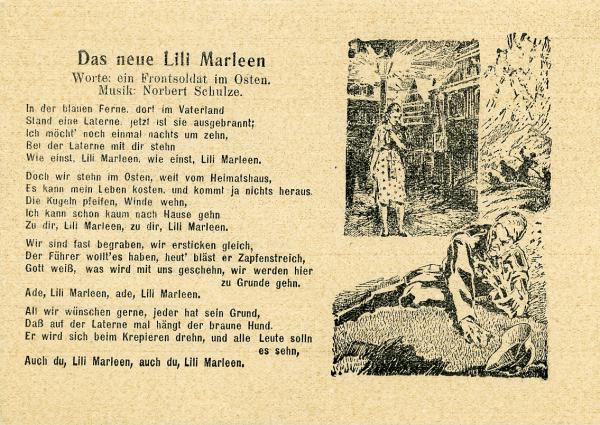
Just as many world known songs, "Lili Marleen" has also inspired a number of parodies. The following is one most important parody: it was interpreted since 1943 by Lucy Mannheim (1899-1976) and broadcast repeatedly by BBC for its definitely anti-Hitler nature.
Ich muß heut' an Dich schreiben,
Mir ist das Herz so schwer.
Ich muß zu Hause bleiben
Und lieb Dich doch so sehr.
Du sagst, Du tust nur Deine Pflicht,
Doch trösten kann mich das ja nicht.
Ich wart an der Laterne
Deine Lili Marleen
Was ich still hier leide,
Weiß nur der Mond und ich.
Einst schien er auf uns beide,
Nun scheint er nur auf mich.
Mein Herz tut mir so bitter weh,
Wenn ich an der Laterne steh'
Mit meinem eignen Schatten
Deine Lili Marleen
Vielleicht fällst Du in Rußland,
Vielleicht in Afrika,
Doch irgendwo da fällst Du,
So will's Dein Führer ja.
Und wenn wir doch uns wiederseh'n,
Oh möge die Laterne steh'n
In einem ander'n Deutschland!
Deine Lili Marleen
Der Führer ist ein Schinder,
Das seh'n wir hier genau.
Zu Waisen macht er Kinder,
Zur Witwe jede Frau.
Und wer an allem schuld ist, den
Will ich an der Laterne seh'n!
Hängt ihn an die Laterne!
Deine Lili Marleen.
inviata da Riccardo Venturi - 25/3/2005 - 19:43
Italian version of the foregoing parody, by Riccardo Venturi
(March 25, 2005)
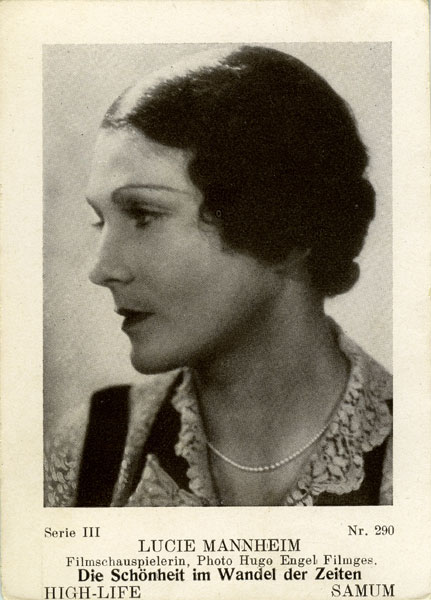
Oggi ti devo scrivere,
ho il cuore tanto gonfio.
Devo restare a casa
però ti amo tanto.
Dici di fare solo il tuo dovere,
ma questo proprio non mi consola.
E aspetto sotto il lampione,
- la tua Lili Marleen.
Quello che soffro qui
lo san solo la luna ed io.
Una volta splendeva per tutti e due
ma ora splende solo per me.
Ho il cuore gonfio d'amarezza
quando me ne sto sotto il lampione
in compagnia della mia ombra,
- la tua Lili Marleen.
Forse sei caduto in Russia,
forse in Africa,
ma dovunque tu cada
questo lo vuole il tuo Führer.
Quando però ci rivedremo
possa il lampione stare
in una Germania diversa!
- la tua Lili Marleen.
Il Führer è un farabutto,
e lo vediamo bene.
Rende orfani i bambini
e vedova ogni donna.
E colui che ha la colpa di tutto questo
lo voglio vedere al lampione!
Impiccatelo al lampione!
- la tua Lili Marleen.

Poco, anzi nulla, si sa dell’autore di questa parodia tedesca stampata su volantino e attribuita a un “Frontsoldat im Osten”, vale a dire a un soldato tedesco sul fronte orientale. Probabilmente è di provenienza russa, e non è azzardato ipotizzare che il volantino provenga dall’assedio di Stalingrado. La funzione che dovrebbe avere il fanale secondo tale versione è chiarita nel testo.
Very little, say nothing, is known about the author of this German broadside version, credited to a “Frontsoldat im Osten”, i.e. a German soldier on the Eastern front. It is probably of Russian origin, and it is no idle supposition that the broadside came from Stalingrad siege. The use that should be made of the lamplight is better explained in the lyrics. [RV]
In der blauen Ferne, dort im Vaterland
Stand eine Laterne, jetzt ist sie ausgebrannt.
Ich möcht’ noch einmal nachts um zehn
Bei der Laterne mit dir stehn,
Wie einst, Lili Marleen, wie einst, Lili Marleen.
Doch wir stehn in Osten, weit vom Heimatshaus,
Es kann mein Leben kosten, und kommt ja nichts heraus.
Die Kugeln pfeifen, Winde wehn,
Ich kann schon kaum nach Hause gehn,
Zu dir, Lili Marleen, zu dir, Lili Marleen.
Wir sind fast begraben, wir ersticken gleich,
Der Führer wollt’ es haben, heut’ bläst er Zapfenstreich.
Gott weiß, was wird mit uns geschehn,
wir werden hier zu Grunde gehn,
Ade, Lili Marleen, ade, Lili Marleen.
All wir wünschen gerne, jeder hat sein Grund,
Daß auf der Laterne mal hängt der braune Hund.
Er wird sich beim Krepieren drehn,
und alle leute solln es sehn,
Auch du, Lili Marleen, auch du, Lili Marleen.
inviata da Riccardo Venturi - 15/9/2014 - 17:12
Italian translation of the foregoing parody
di Riccardo Venturi / by Riccardo Venturi
15 settembre 2014 / September 15, 2014
Nell’azzurra lontananza, laggiù in Patria
C’era un fanale, ma ora è tutto bruciato.
Vorrei ancora, la sera alle dieci
Stare con te presso il fanal,
Come una volta, Lili Marleen, come una volta, Lili Marleen.
Però stiamo a oriente, lontani da casa,
Mi può costar la vita, non ne verrà nulla di buono.
Le pallottole sibilano, i venti soffiano,
E a casa proprio non ci potrò tornare,
Da te, Lili Marleen, da te, Lili Marleen.
Siam quasi sepolti, soffochiamo già,
Lo ha voluto il Führer, e oggi batte ritirata.
Dio sa che ne sarà di noi,
Andremo sottoterra qui,
Addio, Lili Marleen, addio, Lili Marleen.
Tutti noi vorremmo, e ognuno ha il suo motivo,
Che al fanale fosse appeso quel cane in camicia bruna.
Si rigirerebbe mentre crepa
E tutti quanti lo vedrebbero,
Anche tu, Lili Marleen, anche tu, Lili Marleen.

Dall'album Atlantic Affairs del 2002, si tratta in realtà delle prime due strofe della versione originale alle quali Udo Lindenberg ne ha aggiunte una e mezza di sua creazione e aggiornamento. Come si vede, Lili Marleen non cessa di essere fonte di ispirazione.
From the album Atlantic Affairs (2002). This version is composed of the first 2 original verses plus one and half specially composed and updated by Udo Lindenberg. As you can see, Lili Marlene keeps on being a source of inspiration. [RV]
Vor der Kaserne,
vor dem großen Tor
Stand eine Laterne,
und steht sie noch davor,
so wollen wir uns da wieder sehen,
bei der Laterne wollen wir stehen,
wie einst Lili Marleen,
wie einst Lili Marleen
Unsrer beider Schatten
sahen wie einer aus
Dass wir so lieb uns hatten,
das sah man gleich daraus.
Alle Leute sollen es sehen,
wenn wir bei der Laterne stehen,
wie einst Lili Marleen,
wie einst Lili Marleen.
Und wieder zu den Fronten
ruft das Militär,
doch diese Mal da geb ich
meinen Mann nicht her.
Ich will nicht im Laternenschein
da ewig stehn und traurig sein
und warten bis sie kommen, und sagen:
er starb den Heldentod.
Ich will nicht an der Laterne stehen
ich will dem Krieg nicht stumm zusehen,
und warten, bis sie kommen.
Ohne mich! Lilli Marleen!
inviata da Riccardo Venturi - 15/9/2014 - 20:00
Italian translation of Udo Lindenberg's foregoing parody
Davanti alla caserma
davanti al portone
si trovava un lampione
che è rimasto lì tutt'oggi
se ci volessimo rivedere
potremmo ritrovarci vicino al lampione
come una volta Lili Marleen
come una volta Lili Marleen
Le nostre ombre si fondevano
sembravano essere una sola
avevamo così tanto amore dentro di noi
che si vedeva subito anche da fuori
e tutti lo potevano vedere
quando stavamo vicino al lampione
come una volta Lili Marleen
come una volta Lili Marleen
E ancora ai fronti
richiama il militar,
però questa volta
il mio uomo non lo do.
E alla luce del lampion
per sempre triste non starò
ad aspettar che vengano a dirmi
che è morto da eroe.
Presso il lampion, no, non starò
muta alla guerra non assisterò
ad aspettar che vengano,
senza di me, Lili Marleen!
Autore sconosciuto / Author unknown / Auteur inconnu / Verfasser unbekannt [JR]
Vor den Toren Moskaus
stand ein Bataillon.
Es waren noch die Reste
von einer Division.
Die Deutschen wollten Moskau sehn,
sie mussten aber türmen gehen
wie einst Napoleon.
Und es rief der Posten:
Die Russen kommen schon,
es kann dein Leben kosten,
Kam´rad, drum lauf davon!
Gewehr und Stiefel blieben stehn,
wir mussten aber türmen gehn
wie einst Napoleon.
Dnjepr, Bug und Weichsel,
das ist schon lange her,
denn jetzt an der Oder
steht das rote Heer.
Wenn sie erst mal bei Leipzig stehn,
dann wird es uns viel schlimmer gehn
wie einst Napoleon.
inviata da Juha Rämö - 2/3/2018 - 11:25
"OR CHE MUSSOLINI" - ITALIAN ANTI-FASCIST PARODY
Il canto è di un anonimo cantastorie della seconda metà degli anni '40, sulla melodia di Lilì Marleen.
Lyrics reproduced from Il Deposito - Canti di Lotta.
The song was written by an anonymous folksinger in the 2nd half of the 1940's to the tune of Lili Marlene. [CCG/AWS Staff]
Or che Mussolini
non ci frutta più
L'hanno messo in alto
con la testa in giù
Tutta Milano l'ammirò
ma di sputacchi l'onorò
Questa è la giusta fin
del boia Mussolin.
Venticinque anni
solo lui parlò
E la folla schiava
per forza l'ascoltò
Sempre voleva aveva ragion
il delinquente di quel buffon
Or già non parla più
e sta col bel [...]
Col manganello
con l'olio di ricinin
Conquistò il potere
il boia del Mussolin
Ma chi sorgevan suo rival
li eliminava col pugnal
L'infame traditor,
di belva aveva il cuor
Quando Mussolino
all'inferno andò
Appena che lo vide
il diavolo scappò
Subito un fascio rifondò
e duce ancora si proclamò
Stringendo con ardor
la sua Petacci al cuor
E la gerarchia
l'han raggiunto già
Che la maggior parte
son ancor di qua
Volevan viver di leon
ed ora fanno i pecoron
Ma andate per piacer
del vostro conto fier.
inviata da donquijote82 - 26/10/2013 - 16:02
A COLLECTION OF ANTIFASCIST PARODIES IN DIFFERENT ITALIAN DIALECTS
Ripresa dal Deposito – Canti di lotta, lo storico “sito gemello” delle CCG. “Lilì Marlene, la canzone più nota e cantata dai combattenti di tutti i fronti, si prestò per fare il verso al potere: brano il cui primo successo, nella versione di Lale Andersen, è decretato dai soldati tedeschi che lo impongono al posto dei soliti motivi marziali graditi a Goebbels. La canzone, incisa in italiano nel ’42 da LinaTermini con l’orchestra Angelini, dà ben presto origine a numerose parodie con le quali raccontare gli ultimi anni di guerra e di fame (Filippo Colombara)” La fonte non è più raggiungibile (link inattivo).
Tutte le sere
’ndà in lett sensa mangiar
e la matina a un’ora andà a lavorar,
dopu mezz dì, patati e ris
e ’noster dus el fa on sorìs...
Evviva l’italian
c’un et e mezz de pan
2. sull'aria di Lili Marlene, raccolta nel cuneese, da Cesare Bermani
Quand ch’as cantava la Béla Gigögìn
’nsima le tàule as mangiava i tajarin
Adès ca véini Lilì Marlen
la pansa vöja e ’l tübu pièn. Ma mì lulì m'arven
ma mì lulì m'arven
3. sull'aria di Lili Marlene, raccolta nel milanese, a Sesto S. Giovanni
Mi a la sera quand vu a cà mangià
tröuvi là nagotta e me meti a bestemà.
Una scigula e un toch de pan
cheschì a l’è mangià di can
4. sull'aria di Lili Marlene, raccolta nel milanese
Duce duce mè a son bèl e stöf
a me vr’ev un piat ed taiadel sciött
de mò sö vö ch’al sia per me
un èt e mès ed pan al dé.
O duce an in pos piö
o duce an in pos piö
5. sull'aria di Lili Marlene, raccolta in Emilia
Duce, o duce me a san bel e stuff
al me v’rev un piatt de tajadel asutt
inviata da Riccardo Venturi - 19/2/2020 - 19:38
"LILI MARLENE IN TRIESTE STYLE" - A Parody in the Trieste dialect
Inserita tra le CCG a suo tempo come canzone autonoma, preferiamo non cancellarla da lì.
Quando che i tedeschi
Xe rivai a Rojan,
de le nostre tesere
ne ga cavado ‘l pan,
e no se trova più fasoi,
poveri noi,
cosa farem?
De fame morirem
Con te Lilì Marleen !
Soto la Defonta
Se stava tanto ben,
se magnava ovi
e luganighe col kren;
‘deso che i gnochi xe rivai
se magna poco
e squasi mai.
Lerai, semo fregai!
Con te Lilì Marleen!
Prima dela guera
Stavimo ‘sai ben,
magnavimo capuzi
e luganighe col kren,
inveze adeso a lavorar
ne toca andar
senza magnar,
cusì ne morirem
con te Lilì Marleen!
Fora de la caserma
Stemo ad aspetar,
co’la pignata
un poco de magnar.
Gnanca ai soldai
No i ghe la dà più
E li fa star
Sempre a digiun,
cusì ne morirem
con te Lilì Marleen!
Quando a mesogiorno,
stanco del lavor
mi torno a casa,
i me canta el "Trovator",
per zena monto in tranvai
e vadu su
de i sfratai
con te Lilì Marleen!
Con te Lilì Marleen!
Se sero i oci
Me par de magnar
Come una volta polenta e bacalà,
ma co li verso vedo che
no ghe xe più
gnanca ‘l cafè,
la guera vinzerem!?!
Con te Lilì Marleen!?!
inviata da Lorenzo Masetti - 26/3/2005 - 14:27
LA PARODIA CANTATA DAI SOLDATI INGLESI IN ITALIA
A PARODY SUNG BY ENGLISH TROOPS IN ITALY
La stessa Nancy Astor si dice che sia stata la protagonista di un celebre scambio di battute con Winston Churchill: "Signor Churchill, lei è completamente ubriaco!!" - "Sì, signora, e lei è bruttissima. Però a me domani passa...".
This satire is about one of the great gaffes of World War II. England's Lady Astor, while making a speech in Parliament after the Invasion of Normandy, referred to the British 8th Army (and indirectly to their American and Canadian allies) as "D-Day dodgers", insinuating that they had skipped the high profile invasion for light duty in Italy. The fact is that troops in the Italian campaign saw some of the bloodiest fighting of the war and they took exception to her ill-considered comment with the words of this song which they set to the tune of the then popular "Lily Marlene". The sharp tongued Astor met her match in several encounters with Winston Churchill. On one occasion she proclaimed, "Why, Sir Churchill, you are drunk!" Churchill replied, "Yes, and you, Madam, are ugly. But tomorrow, I shall be sober."
Jeanne (the post war baby boomer who's fascinated by this history ;o)
Lyrics from Military History Network
We're the D-day Dodgers out in Italy,
Always on the vino and always on the spree,
8th Army scroungers and their tanks,
We live in Rome among the Yanks,
We are the D-Day Dodgers, in sunny Italy.
We landed at Salerno, holidays with pay,
Jerry brought his band out to cheer us on our way,
Showed us sights and made us tea,
We all sang songs and beer was free,
To welcome D-Day Dodgers to sunny Italy
Naples and Cassino were taken in our stride,
We didn't come to fight there. We just came for the ride.
Anzio and Sangro were just names,
We only came to look for dames,
The randy D-Day Dodgers in sunny Italy.
On the way to Florence we had a lovely time,
We ran a bus to Rimini right through the Gothic Line,
Soon to Bologna we will go,
And after that we'll cross the Po.
We'll still be the D-Day Dodgers in sunny Italy.
Once we heared a rumour we were going home,
Back to dear old Blighty, never more to roam,
Then someone said, "In France you'll fight",
We said "No fear, we'll just sit tight,
The windy D-Day Dodgers in sunny Italy."
Dear Lady Astor, you think you know a lot,
Standing on your platform talking tommy rot,
You - England's sweetheart bride -
We think your mouth's too bleeding wide,
That's from the D-Day Dodgers in sunny Italy.
Look across the mountains in the mud and rain,
See the rows of crosses some without no name,
Heartbreak and toil and suffering gone:
The Boys Beneath Just Slumber On,
They were the D-Day Dodgers who stayed in Italy.
Di Riccardo Venturi, 13 ottobre 2014
Italian Translation of the Foregoing Parody
By Riccardo Venturi, October 13, 2014
Siamo gli imboscati del D-Day quaggiù in Italia,
Sempre in mezzo al vino e sempre a far bisboccia,
Gli scrocconi dell'VIII Armata e i loro carrarmati,
Viviamo a Roma in mezzo agli Yankees,
Siamo gli imboscati del D-Day nell'Italia assolata.
Siamo sbarcati a Salerno in ferie pagate,
Jerry ha portato la sua banda per festeggiarci all'arrivo,
Ci ha fatto vedere il paesaggio e ci ha fatto il tè,
Tutti noi cantavamo canzoni e la birra era a gratis
Per dare il benvenuto agli imboscati del D-Day nell'assolata Italia.
Napoli e Cassino sono state prese durante l'avanzata,
Non siamo venuti a combattere, solo per fare una gita.
Anzio e Sangro erano soltanto nomi,
Siamo venuti qua soltanto per guardare le donne,
Gli imboscati del D-Day arrapati nell'assolata Italia.
In strada per Firenze ci siamo divertiti un sacco,
Abbiamo preso un bus per Rimini proprio attraverso la Linea Gotica,
Presto andremo a Bologna
E dopo passeremo il Po.
E saremo sempre gli imboscati del D-Day nell'assolata Italia.
Una volta abbiamo sentito voci che tornavamo a casa
Nella cara vecchia Gran Bretagna [[|1]] per non vagar mai più,
Allora qualcuno ha detto: “Combatterete in Francia”,
E noi abbiamo detto, “Niente paura, ce ne staremo belli a sedere,
Gli spaventati imboscati del D-Day nell'assolata Italia.”
Cara Lady Astor, lei pensa di saper tante cose
Ritta sul suo podio a dire gran cazzate,
Lei, la fidanzatina d'Inghilterra,
Noi pensiamo che la sua bocca vomiti troppe cose,
Glielo dicono gli imboscati del D-Day nell'assolata Italia.
Guardi le montagne in mezzo al fango e alla pioggia,
Guardi le file di croci, diverse senza nome,
Il crepacuore, le pene, le sofferenze passate:
Dormono ancora quei ragazzi sepolti là sotto,
Erano gli imboscati del D-Day che stavano in Italia.
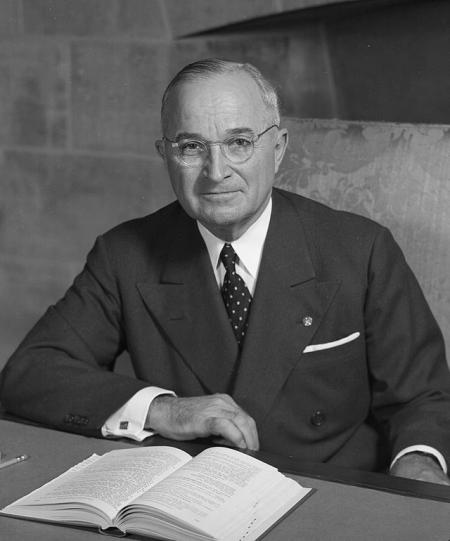
Gentilmente contribuita da Sean Smith
"My father and three of his brothers were veterans of the Korean War. And I grew up hearing them play their guitars and singing a song they learned in Korea. The melody is that of Lili Marleen but the lyrics spoke of the irritation of some soldiers at being in Korea after having just fought WWII. I'll recount a verse the best I can remember it. Though there's one word I can't recall exactly. I want to say "Rome" but that doesn't really make sense to me. Is anyone else familiar with this version? I found one brief reference to it a few years ago written by someone on Usenet." (Sean Smith)
Si tratta di una strofa sull'aria di "Lili Marleen" che il sig. Sean Smith ricorda di avere sentito da suo padre e dai suoi zii, tutti veterani della guerra di Corea. Si trattava di una strofa, come dice il sig. Smith, che "parlava dell'irritazione provata da alcuni soldati per essere di nuovo a combattere in Corea dopo avere appena finito di combattere nella II Guerra mondiale. Una testimonianza personale preziosa; facciamo seguire una traduzione italiana di massima. [CCG/AWS Staff]
We have conquered Germany and we have conquered Rome
Why can't we leave this place?
We have beat the master race
Let the boys in [rhymes with Rome] go home
Let the boys in [repeat rhyme] go home.
Ehi, sig. Truman, perché non possiamo andare a casa?
Abbiamo conquistato la Germania e abbiamo conquistato Roma
Perché non possiamo andarcene da questo posto?
Abbiamo sconfitto la razza padrona
Fai tornare i ragazzi a casa
Fai tornare i ragazzi a casa
inviata da Sean Smith - 9/7/2008 - 09:07
...A DIT LILY MARLÈNE - La parodia francese di Pierre Dac
...A DIT LILY MARLÈNE - The French Parody by Pierre Dac
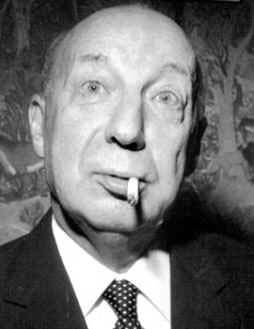
Sulla melodia originaria, con testo scritto da Pierre Dac.
To the original tune, with new lyrics by Pierre Dac.
A force d’entendre chanter cette chanson
J’ai au le désir, dicté par la raison
D'aller tout simplement un soir
Afin de voir
Et de savoir
… que dit Lily Marlène
… que dit Lily Marlène
Hè! dis moi la belle, pourquoi cet air songeur
Pourqoui dans tes yeux cette trouble lueur ?
“Il n’est plus, pour moi de bonheur
Et le malheur
Est dans mon coeur”
… a dit Lily Marlène
… a dit Lily Marlène
Voyons n’as tu plus confiance en ton Fuhrer
N’est-il pas pour toi plus grand que le Seigneur ?
"Le triomph’ qu’il nous a promis
Je l’attends depuis
Trois ans et d’mi”
… a dit Lily Marlène
… a dit Lily Marlène
N’es-tu pas encore heureus’ d’appartenir
A la grande Allemagne et fièr de son av’nir ?
“Je sais que le Reich tout entier
Est bombardé
Par les Alliés”
… a dit Lily Marlène
… a dit Lily Marlène
Ignores-tu donc l’invincible rempart
Que votre Wermacht dresse de toutes parts
“Je sais que le sol de Russie
Est tout rougi
Du sang nazi”
… a dit Lily Marlène
… a dit Lily Marlène
Enfin la victoire couronnant vos drapeaux
Sur 1a croix gammée resplendira bientôt.
“Je sais qu’en mon âme éperdue
L’espoir n’est plus
Nous sommes perdus”
… a dit Lily Marlène
… a dit Lily Marlène
inviata da Alessandro - 22/12/2009 - 15:11
(Di Riccardo Venturi, 29 dicembre 2014)
A furia di sentir cantare 'sta canzone
mi è preso il desiderio, dettato dalla ragione
di andare semplicemente, una sera,
a vedere
e a sentire
...che dice Lily Marlène,
...che dice Lily Marlène.
Ehi, dimmi, bella, perché quest'aria assorta,
perché i tuoi occhi risplendono sì cupi ?
« Per me non c'è più gioia
e ho la pena
dentro al cuore. »
...ha detto Lily Marlène,
...ha detto Lily Marlène.
Su, non hai più fiducia nel tuo Führer,
per te Egli non è più grande del Signore ?
« Il trionfo che ci ha promesso
lo aspetto da
tre anni e mezzo. »
...ha detto Lily Marlène,
...ha detto Lily Marlène.
Non sei più felice di appartenere
alla grande Germania fiera del suo avvenire ?
« Io so che tutto quanto il Reich
è bombardato
dagli Alleati. »
...ha detto Lily Marlène,
...ha detto Lily Marlène.
Dunque non sai dell'invincibile baluardo
che la vostra Wehrmacht ha eretto da ogni parte ?
« Io so che il suolo di Russia
è tutto rosso
di sangue nazista. »
...ha detto Lily Marlène,
...ha detto Lily Marlène.
Infine, la vittoria che corona le vostre bandiere
splenderà presto sulla croce uncinata !
« Io so che nella mia anima sconsolata
non c'è più speranza,
siamo perduti. »
...ha detto Lily Marlène,
...ha detto Lily Marlène.
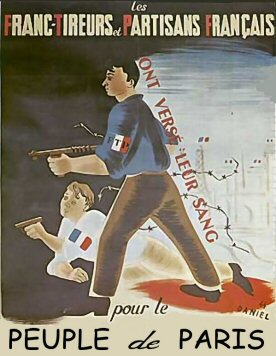
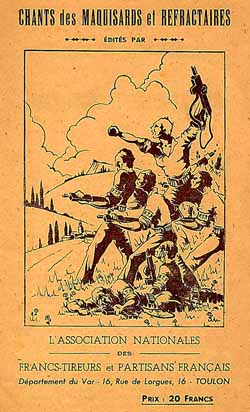
Parodia francese di anonimo autore (un partigiano dell’F.T.P.F, il movimento di resistenza creato nel 1941 dal Partito Comunista Francese) tratta dai “Chants des maquisards et réfractaires”, raccolta edita dall’Association Nationale des Francs-tireurs et Partisans Français.
In realtà l’autore non è poi completamente “anonimo”, che ne viene fornita la matricola, n. 61.058. Impossibile comunque risalire all’identità.
La musica viene attribuita ad “un Ch’leu”, che credo significhi “un Lupo” in Ch'ti, la lingua piccarda del Nord-Pas de Calais. Probabilmente si tratta del soprannome di un altro partigiano o, forse, di come venivano chiamati in genere i maquisards dell’F.T.P.F.
Un jour en Russie
Au soleil couchant
Un jeune nazi
S'en allait clopinant,
Il avait reçu un pruneau
Dans l'gras du dos
(Ti diou quaquo)
Aïe ! Aïe ! Lily Marlen
Aïe ! Aie ! Lily Marlen
Il disait en boche
Qu'on n'le prendrait plus
Et dans sa caboche
Ne voyait que du Pruss'
Non, non, j'ne veux plus rien savoir
J'en ai soupé d'toujours trinquer,
Aïe ! Aie ! Lily Marlen
Aïe ! Aïe ! Lily Marlen
Notr' sadiqu' Hitler
Nous avait bien dit
Que sa guerre éclair
Serait bientôt finie,
Mais voilà six ans que ça traîne,
Et en Ukraine, quelle déveine,
Aïe ! Aie ! Lily Marlen
Aïe ! Aïe ! Lily Marlen
Dans les plaines russes
Tous les hitlériens
Irons, sois-en sûr,
Crever comme des chiens,
Et ce sera du pain béni
Pour ces nazis, tous des pourris
Avec Lily Marlen
Avec Lily Marlen
Prolétaires du monde
Pour vos libertés
Que de Russes tombent,
Faut jamais l'oublier.
L'union de tous les travailleurs
Doit en finir des oppresseurs,
Pour que l'humanité
Vive en liberté.
inviata da Bernart Bartleby - 16/12/2014 - 21:35
(Di Riccardo Venturi, 29 dicembre 2014)
Un giorno in Russia
verso il tramonto
un giovane nazista
andava a zoppino :
si era beccato una
pallottola nel culo
(ti diou quaquo),
ahi ahi, Lily Marlene,
ahi ahi, Lily Marlene.
Diceva in crucco
che non avrebbe prese più,
e che nella sua zucca
non vedeva che Prussia
No, non voglio sapere più nulla,
ne ho abbastanza di non far che trincare.
ahi ahi, Lily Marlene,
ahi ahi, Lily Marlene.
Il nostro sadico Hitler
ci aveva ben detto
che la sua guerra lampo
sarebbe finita presto,
ma son sei anni che tira avanti
e in Ucraina che scalogna,
ahi ahi, Lily Marlene,
ahi ahi, Lily Marlene.
Nelle pianure russe
tutti gli hitleriani
se ne andranno, stanne certo,
a crepare come cani,
e sarà manna dal cielo
per questi nazisti, tutti schifosi,
loro e la loro Lily Marlene,
loro e la loro Lily Marlene.
Proletari del mondo,
per le vostre libertà
quanti russi cadono,
non bisogna scordarlo mai.
L'unione di tutti i lavoratori
deve farla finita con gli oppressori,
affinché l'umanità
viva in libertà.
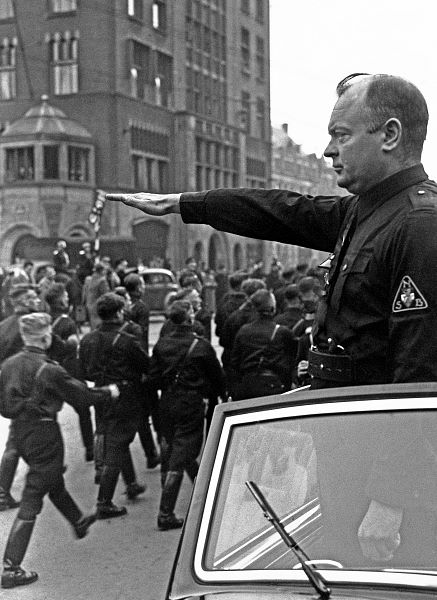
Parodia locale fatta nella città di Eindhoven dopo la visita del commissario del Reich, Seyss-Inquart, e del capo del partito Nazista Olandese, Anton Mussert, alle fabbriche della Philips. Segue la traduzione del testo in italiano.
lag een hoopje kak
Ze namen het mee naar binnen
't ging in de Philiprak
En alle mensen aten mee
Seys Inquart liep al naar de plee
en Mussert riep houzee.
Davanti al portone della Philips
c'è una cacata di cane.
L'hanno presa e portata dentro
ed aggiunta alla "Philiprak" (*).
Tutti quanti l'hanno mangiata.
Seyss Inquart è corso al cesso
e Mussert gridava "Houzee". (**)
(*) La colazione degli operai della Philips.
(**) Saluto nazista olandese che significa "salute".
inviata da M. van der Velden - 29/5/2006 - 23:35
The following parodic verse in Dutch has been contributed by mr Dirk Vincke, whom we thank heartily. Its origin remains unknown. An Italian translation is provided.
ga je wat gaan zien :
de Tommy's die gaan komen
met al hun vliegmachien,
met chocolat en koekenbrood.
De Duits moet dood,
die dommekloot,
met al zijn paardenbrood,
met al zijn paardenbrood.
Dopo quest'estate
andate un po' a vedere :
i Tommies stanno arrivando
con tutta la loro macchina aviatoria,
con cioccolato e pane bianco.
I tedeschi devono morire,
quegli imbecilli
con tutto il loro pane da cavalli,
con tutto il loro pane da cavalli.
Ferruccio Alessandri - 5/6/2005 - 11:09
penso che potrebbe essere un INNO alla NON GUERRA.
GIANNI il marinaio - 5/8/2005 - 13:17
rossella58@hotmail.com - 9/5/2006 - 20:01
AIUTATEMI A TROVARE LE NOTE DI QUESTA CANZONE!!!!!!!!!
MI SERVONO URGETEMENTE PER L'ESAME!!!!
QUALCUNO MI DIA UN POSTO DOVE CERCARE!!!!
GRAZIE VI VOGLIO BENE,
MARY - 7/6/2006 - 13:33
da "ALICE GUARDA I GATTI (F.DE GREGORI):
...e Lili marleen bella più che mai!
sorride non ti dice la sua età...
e tutto questo alice non lo sa...
Giovanni - 24/10/2007 - 08:12
Ho 37 anni, non ho vissuto quei tragici momenti di quando è stata scritta (1° guerra mondiale) e musicata (poco prima della 2° guerra mondiale), ma anche nel mio piccolo nelle marce che feci come soldato svizzero, assieme ai miei commilitoni; ci capitava spesso di cantarla. Pur non avendo la fidanzata o la moglie oppure una semplice amica, mi ha sempre emozionato. Ora sono sposato e non faccio più il soldato, ma ho scaricato con emule la versione di Lale Andersen (per me la migliore) e spesso la riascolto con enorme piacere; ascolto anche la versione italiana di Lina Termini, sempre scaricata con emule.
GRAZIE A LEIP E SCHULZ PER QUESTA IMMORTALE E SPLENDIDA CANZONE D'AMORE, DA PREMIARE COME "CANZONE DEL SECOLO" E SECOLI AVVENIRE. Infatti non credo proprio che si possa scrivere un altra canzone mondiale che faccia riunire tutti i popoli del mondo.
Ringo
Ringo - 30/11/2007 - 18:15
José Alfredo Cedillo Martínez - 11/8/2008 - 18:27
carlo vezzoni - edital@tin.it - 27/8/2008 - 17:46
Riccardo Venturi - 6/9/2008 - 16:02
Peppe
Peppe - 16/1/2009 - 14:32
Ainsi Parlaient Marco Valdo M.I. et Lucien Lane
Marco Valdo M.I. - 22/12/2009 - 13:05
antonio pelizzari - 29/1/2012 - 19:16
bruno - 7/2/2012 - 00:16
- http://www.archive.org/details/AageJuh...
See also: - Lili Marleen on archive.org
Holger Terp - 11/2/2012 - 16:14
lui aveva partecipato allo sbarco in Normandia, e giorni dopo il D-Day, decise di mettersi a suonare la tromba nella notte, anche se il suo comandante lo aveva avvisato: nelle vicinanze si nascondeva un ultimo cecchino tedesco.
Allora, pensando che anche il cecchino doveva essere solo e spaventato quanto lui, Tueller decise di suonare una canzone tedesca.
Lili Marleen.
Il cecchino non sparò.
Il mattino dopo, la polizia militare andò da lui e gli disse che avevano catturato un soldato tedesco che continuava a chiedere chi avesse suonato la tromba la notte precedente.
Tueller andò a trovare quel prigioniero, e questi scoppiò in lacrime: "Mi sono ricordato della mia ragazza e di mia madre. Non ho potuto sparare."
"Mi porse la mano e io strinsi la mano del nemico", dice Tueller, "Ma non era un nemico. Era spaventato e solo come me. Il potere della musica."
Ora, io penso che questo sia semplicemente il motivo per cui adoro questo sito e il lavoro enorme che state facendo. La prova che scrivere canzoni contro la guerra non è affatto inutile. E secondo me non è un caso che sia proprio Lili Marleen la canzone che ha scatenato la reazione del cecchino. Una canzone così forte da fermare, anche se per un solo uomo, la guerra.
Federica - 10/4/2012 - 00:49
Complimenti per il sito e grazie per aver svolto questo lavoro.
Un saluto da un ragazzo di 22 anni.
Samuele
Samuele Rocca - 4/9/2012 - 23:47
♪ perché non mandi, mandi il testo ♫
♪ Samuele SA-SA maledetto ♫
perché non mandi, mandi il testo ♪
Samuele maledetto (ha il testo, sshhh
(ma non lo vuole mandare)
Piero - 5/9/2012 - 21:47
Daniel Kahn - Lili Marleen
Dead End - 6/9/2012 - 10:30
Piergiorgio - 7/9/2012 - 00:16
Scommetto che questa l'hai scritta proprio tu...
(PS Guardatevi il video fino alla fine...)
Dead End - 7/9/2012 - 08:25
conosco il tedesco... ma credo che chiunque ascolti questa canzone... non ha bisogno di traduzioni .... perchè si avvertono chiaramente i sentimenti, le emozioni e gli stati d'animo dei protagonisti... e pensando al tempo in cui venne cantata dai soldati di questa o quella nazione... beh..davvero ognuno di noi potrebbe essere quel soldato o quella Lili Marlene...
Ricordo da bambina quando mio padre metteva il disco della versione cantata da Marlene Dietrich e insime la ascoltavamo in silenzio. Intensa e commovente!!!
Mi piacerebbe trovare un disco da ascoltare con il grammofono che ho in casa... sarebbe ancor più malinconica!!!
PS. Credo che per rendere giustizia al testo originale sia giusto attenersi alla traduzione letterale e non a traduzioni che rendano il brano orecchiabile in italiano o altra versione!!!)
BUSAN 74 - 19/10/2012 - 01:13
Antonio - 10/5/2013 - 13:11
Un saluto
Samuele
Samuele Rocca - 13/8/2013 - 21:37
Reg. F. Marranci, Le Sieci, novembre 2007.
Sull’aria della famosa canzone tedesca Lili Marleen - scritta durante la I° Guerra Mondiale dal poeta Hans Leip, musicata nel 1937 da Norbert Schultze e resa nota dalle cantanti Lale Andersen e Marlene Dietrich - Pasqualina ricorda questa strofa di una probabile parodia antifascista, che solitamente intonava una donna di S. Brigida detta la Mora. I pigionali si arrangiavano prestando opra presso i mezzadri in cambio di legna, cereali e quant’altro occorreva per la sopravvivenza. La precarietà della loro condizione li esponeva però alla possibilità di soffrire la fame, come durante la II° Guerra Mondiale. È il caso de la Mora che aiutava Pasqualina e Sergio nella raccolta di legna, nella mietitura del grano a mano, nella battitura dei marroni o in altri lavori pesanti, mentre il marito lavorava come bracciante a giornat a per la manutenzione di fossi, muri e tetti presso le fat torie della zona.
http://laleggerahost.altervista.org/pd...
E e la Mora l’ha patìo la fame ’nsomma la patìa la fame, i’ su’ marito gli era comunista spaccato… anche lei eh, anche lei l’era, e lei e l’ ’nsomma noi si cantava Lili Marle’ come Lili Marle’ e lei quande l’arrivàa a che noi dopo ’un si sapèa più e lei la dicèa queste cose ’nsomma questo canto chi:
t’hai levato i’ pane alle povere perso’
anche per te la finirà
quella borsa nera la ti si leverà
inviata da donquijote82 - 26/10/2013 - 16:13
Riccardo Venturi - 8/4/2014 - 04:36
Riccardo Venturi - 8/4/2014 - 17:41
Danish, English and German Lili Marleen texts versions; translated into Danish'
Danish and English documented comments and discography.
You are welcome to publish my translations.
Holger Terp
Holger Terp - 12/4/2014 - 10:11
Riccardo Venturi - 30/7/2014 - 11:33
Sagittario1962 - 5/8/2014 - 20:38
CCG Staff - 5/8/2014 - 21:43
Gian Piero Testa - 6/8/2014 - 00:17
Parva Securis - 20/9/2014 - 18:38
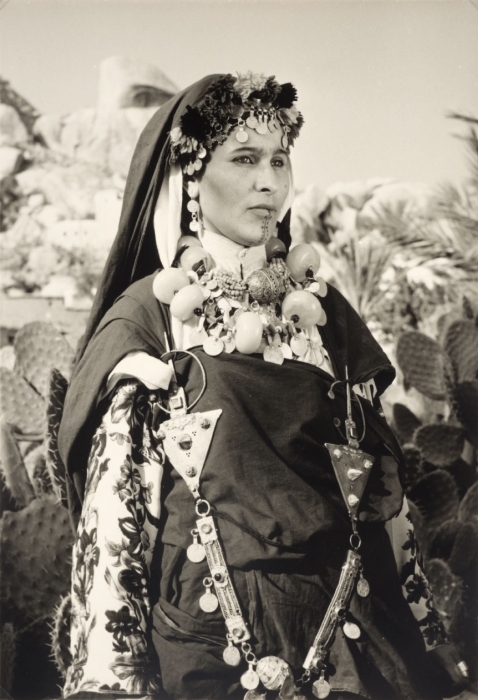
In pratica, la canzone è attribuita ironicamente "a un crucco". Sarebbe interessante andare a vedere tutti i nomignoli spregiativi attribuiti ai tedeschi, che ne hanno fatto una collezione (chissà perché...). L'italiano "crucco", ad esempio, sembra derivare dalla parola croata per "pane", kruh, che i soldati croati austroungarici pronunciavano assai di frequente per fame, of course. A forza di chiedere "kruh, kruh" nacquero i crucchi.
Riccardo Venturi - 29/12/2014 - 19:57
Riccardo Venturi - 29/12/2014 - 22:50
Lors de la Première Guerre mondiale, le mot Chleuh apparait avec le sens de « soldat des troupes territoriales » dans l’argot des soldats combattant au Maroc. (1936) Avec le sens de « frontalier parlant une langue autre que le français : comtois ou alsacien ». (1939) Le sens évolue vers « personne allemande ou de langue allemande » (à Metz d’après Dauzat) puis, vers mai 1940 « militaire allemand ». (http://fr.wiktionary.org)
Grazie Riccardo per aver corretto il mio strafalcione.
B.B. - 30/12/2014 - 09:00
Lilli...
krzyś - 24/11/2015 - 03:15
Le premier tube planétaire de l'histoire de la chanson méritait bien une émission spéciale.
Lili Marleen est une chanson au destin hors norme. Aujourd’hui, on en retient surtout la version de Marlène Dietrich, chantée après la Seconde Guerre Mondiale. Pourtant, c’est pendant la guerre que le succès de cette chanson s’est joué. Tour à tour utilisée et interdite par la propagande nazie, adoptée par les soldats de la Wehrmacht puis par les soldats Alliés, elle fut adaptée en une cinquantaine de langues dans les années 1940, pour devenir un tube planétaire.
Pourtant, Lili Marleen n’est pas un chant de guerre. Pourquoi cette simple ritournelle aux paroles simplettes est-elle devenue un chant à la symbolique aussi forte ? Quel est l’histoire de ce chant si polémique ?
Tout commence dans les tranchées russes en avril 1915. Hans Liep, poète et musicien allemand, écrit une ode à ses deux bien-aimées, Lili et Marleen, qu’il a quittées pour partir au combat. Dans son poème, Lili et Marleen deviennent Lili Marleen.
A la fin des années trente, le poème est adapté par une chanteuse de cabaret allemande, Lale Andersen. La chanson passe d’abord inaperçue. Elle attendra la guerre pour rencontrer son public.
Diffusée sur Radio Belgrade, elle est immédiatement adoptée par les soldats allemands, fidèles auditeurs de la station. Le IIIè Reich utilise dès lors Lili Marleen pour doper le moral de son armée qui vole de victoires en victoires. Mais à la fin de l’année 1942, Lale Andersen entre en disgrâce. Lili Marleen est provisoirement interdite en Allemagne.
Elle est alors adaptée en Anglais et utilisée par la propagande alliée, qui en fait le chant de la Liberté. C’est à cette époque que, comme un symbole, la victoire change de camp. Le destin de Lili Marleen vient de basculer.
Réalisé par Angélina Vautier
Raconté par Franck Ferrand
Genre : Série documentaire - Historique Année
Producteur : Martange Production
Riccardo Venturi - 24/12/2018 - 15:45










Testo di Hans Leip [1915]
Musica di Norbert Schultze [1937]
Incisione originale di Lale Andersen:
Electrola EG 6993, 2 agosto 1939
Lili Marleen (Lied eines jungen Wachtpostens)
Altre incisioni: Marlene Dietrich, Willy Fritsch, Heyn Quartett; in inglese, da Anne Shelton, Vera Lynn e (in America) da Bing Crosby e Perry Como. L'originale tedesco è stato interpretato anche dal coro della VI. Panzergrenadierdivision (VI. Divisione Corazzata).
La "Versione per gli U-Boot"
Lyrics by Hans Leip [1915]
Music by Norbert Schultze [1937]
First recording by Lale Andersen:
Electrola EG 6993, August 2, 1939
Lili Marleen (Lied eines jungen Wachtpostens)
Other recordings: Marlene Dietrich, Willy Fritsch, Heyn Quartett; in English, by Ann Shelton, Vera Lynn and, in the US, Bing Crosby and Perry Como. The German original has been also interpreted by the choir of the VI Panzergrenadierdivision.
The "U-Boot Version"
Worte von Hans Leip [1915]
Musik von Norbert Schultze [1937]
Originalauffassung von Lale Andersen:
Electrola EG 6993, 2. August 1939
Lili Marleen (Lied eines jungen Wachtpostens)
Andere Auffassungen: Marlene Dietrich, Willy Fritsch, Heyn Quartetto; auf Englisch, von Anne Shelton, Vera Lynn und (in den Vereinigten Staaten) von Bing Crosby und Perry Como. Die deutsche Originalauffassung wurde auch vom Chorus der VI. Panzergrenadierdivision aufgefasst.
Die "U-Bootversion"
QUICK INDEX OF VERSIONS AVAILABLE [45 languages up to now]
Marlene Dietrich 1 (Tedesco) - Marlene Dietrich 2 (Tedesco) - Versione degli U-Boot (Tedesco) - Italiano 1 – Italiano 2 (Nino Rastelli-Lina Termini) – Italiano 3 - Italiano 4 - Italiano 5 - Italiano 6 - Italiano 7 - Italiano 8 (Luigi Anzalone) - Italiano 9 ("Or che Mussolini" - Parodia antifascista) - Italiano 10 (Raccolta di parodie antifasciste in vari dialetti italiani) - Italiano 11 (Los Marcellos Ferial) - Inglese 1 (J.J.Phillips/T.Connor-Anne Shelton/Vera Lynn) – Inglese 2 (Marlene Dietrich) – Inglese 3 – Inglese 4 (Perry Como) - Inglese 5 (Lale Andersen) - Inglese (The Ballad Of The D-Day Dodgers, Parodia) - Inglese (Hello, Mr. Truman, Parodia) - Afrikaans 1 - Afrikaans 2 - Albanese (Alfred Kola) - Basco (Euskara) - Bengalese (Neel) - Bretone (Jakez Konan) - Bulgaro 1 (Iva Vanja) - Bulgaro 2 - Catalano 1 (Feliu Formosa i Torres/Ester Formosa i Plans) - Catalano 2 (Núria Feliu i Mestres) - Catalano 3 (Marina Rossel) - Ceco 1 (Lilly Hodáčová) - Ceco 2 - Cinese - Coreano - Croato 1 (Vlado Kreslin) - Croato 2 - Danese (Emil Damvig/Elsa Sigfuss med Aage Juhl-Thomsens Orkester) – Ebraico (Avraham 'Oz) - Esperanto (Kantfesto) – Estone 1 – Estone 2 (Vennaskond) - Finlandese (Kerttu Mustonen/Georg Malmstén) – Francese 1 (Henri Lemarchand/Suzy Solidor) - Francese 2 (Anne Vanderlove) - Francese 3 (Marco Valdo M.I.) - Francese ("A dit Lily Marlène" di Pierre Dac, Parodia) - Francese ("Aïe Lily Marlène", FTPF, Parodia) - Gaelico - Georgiano - Giapponese 1 - Giapponese 2 - Giapponese 3 (Rie Tanaka) - Greco 1 (Gian Piero Testa) - Greco 2 (Makis Fotiadis/Thanasis Gaïfyllias) - Greco 2A (Traduzione italiana della precedente) - Hawaiiano (Kiope Raymond e Pearl Rose) - Islandese - Latino 1 (Meredith Minter Dixon) – Latino 2 (Franciscus Kopmeier) - Kelartico (Riccardo Venturi) - Lettone (Valdis Mednis) - Macedone (Aleksandar Stojčevski) - Neerlandese (Herre De Vos/Lou Bandy Orkester) – Neerlandese (Parodia) - Neerlandese (Parodia) - Norvegese (Rita Engebretsen) - Piemontese - Polacco 1 (Wojciech Młynarski) – Polacco 2 (Edward Snopek) - Polacco 3 (Swalczak) - Portoghese 1 (Alexandre Monteiro) – Portoghese 2 (Brasiliano) - Portoghese 3 (Brasiliano) (Francisco Alves) - Rumeno (Sisiphe) - Russo 1 (Josif Brodskij) – Russo 1A (Josif Brodskij - Testo trascritto) - Russo 2 - Russo 3 (Alla und Aleksandr) - Serbo (Kirilica) - Serbo (Latinica) - Sloveno (Vlado Kreslin) – Spagnolo 1 (División Azul) – Spagnolo 2 (Ejército de Chile) – Spagnolo 3 (Olé Olé) - Spagnolo 4 (Los Muertos de Cristo) - Spagnolo 4A (Traduzione italiana) - Spagnolo 5 (interterror) - Svedese (Gunilla Sandberg / Evert Granholm) – Tedesco (Parodia 1 - Lucy Mannheim) – Tedesco (Parodia 2 - "Das neue Lili Marleen") - Tedesco (Parodia 3 - Udo Lindenberg) - Triestino (Parodia) - Turco - Ucraino - Ungherese 1 (Ilona Nagykovácsi) - Ungherese 2 (Anna Kelly) - Vietnamita
Marlene Dietrich 1 (German) - Marlene Dietrich 2 (German) - U-Boot Version (German) - Italian 1 – Italian 2 (Nino Rastelli-Lina Termini) – Italian 3 – Italian 4 - Italian 5 - Italian 6 - Italian 7 - Italian 8 (Luigi Anzalone) - Italian 9 ("Or che Mussolini" - Italian anti-fascist parody) - Italian 10 (A collection of antifascist parodies in different Italian dialects) - Italian 11 (Los Marcellos Ferial) - English 1 (J.J.Phillips/T.Connor-Anne Shelton/Vera Lynn) – English 2 (Marlene Dietrich) – English 3 – English 4 (Perry Como) - English 5 (Lale Andersen) - English (The Ballad Of The D-Day Dodgers, Parody) - Inglese (Hello, Mr. Truman, Parody) - Afrikaans 1 - Afrikaans 2 - Albanian (Alfred Kola) - Basque (Euskara) - Bengali (Neel) - Breton (Jakez Konan) - Bulgarian 1 (Iva Vanya) - Bulgarian 2 - Catalan 1 (Feliu Formosa i Torres/Ester Formosa i Plans) - Catalan 2 (Núria Feliu i Mestres) - Catalan 3 (Marina Rossel) - Chinese - Croatian 1 (Vlado Kreslin) - Croatian 2 - Czech 1 (Lilly Hodáčová) - Czech 2 - Danish (Emil Damvig/Elsa Sigfuss med Aage Juhl-Thomsens Orkester) – Dutch (Herre De Vos/Lou Bandy Orkester) – Dutch (Parody) - Dutch (Parody) - Esperanto (Kantfesto) – Estonian 1 – Estonian 2 (Vennaskond) - Finnish (Kerttu Mustonen/Georg Malmstén – French 1 (Henri Lemarchand/Suzy Solidor – French 2 (Anne Vanderlove) - French 3 (Marco Valdo M.I.) - French ("A dit Lily Marlène" by Pierre Dac, Parody) - French("Aïe Lily Marlène", FTPF, Parody) - Georgian - German (Parody 1 - Lucy Mannheim) – German (Parody 2 - "Das neue Lili Marleen") - German (Parody 3 - Udo Lindenberg) - Greek 1 (Gian Piero Testa) - Greek 2 (Makis Fotiadis/Thanasis Gaïfyllias) - Greek 2A (Italian translation of the foregoing) - Hawaiian (Kiope Raymond and Pearl Rose) - Hebrew (Avraham 'Oz) - Hungarian 1 (Ilona Nagykovácsi) - Hungarian 2 (Anna Kelly) - Icelandic - Irish - Japanese 1 - Japanese 2 - Japanese 3 (Rie Tanaka) - Kelartic (Riccardo Venturi) - Korean - Latin 1 (Meredith Minter Dixon) – Latin 2 (Franciscus Kopmeier) - Latvian (Valdis Mednis) - Macedonian (Aleksandar Stojčevski) - Norwegian (Rita Engebretsen) - Piedmontese - Polish (Wojciech Młynarski) – Polish 2 (Edward Snopek) - Polish 3 (Swalczak) - Portuguese 1 (Alexandre Monteiro – Portuguese 2 (Brazilian) - (Portuguese 3 (Brazilian) (Francisco Alves) - Romanian (Sisiphe) - Russian 1 (Josif Brodskij) – Russian 1A (Josif Brodskij - Romanized Lyrics) - Russian 2 - Russian 3 (Alla und Aleksandr) - Serbian (Kirilica) - Serbian (Latinica) - Slovenian (Vlado Kreslin) – Spanish 1 (División Azul) – Spanish 2 (Ejército de Chile) – Spanish 3 (Olé Olé) - Spanish 4 (Los Muertos de Cristo) - Spanish 4A (Italian Translation) - Spanish 5 (interterror) - Swedish (Gunilla Sandberg / Evert Granholm) – Trieste dialect (Parody) - Turkish - Ukrainian - Vietnamese.
"Lili Marleen" è stata la canzone preferita dai soldati di fanteria tutto il mondo durante la II guerra mondiale: praticamente ne fu l'inno non ufficiale. Una canzone tedesca scritta da un giovane soldato amburghese con velleità poetiche e musicata da un musicista compromesso con il nazismo, che però travalicò presto i confini della Germania e fu adottata da tutti i ragazzi che andavano a morire a decine di migliaia, pensando magari alla loro "Lili" lasciata chissà dove. Strane storie hanno a volte, le canzoni. Strane e imprevedibili.
Il testo originale proviene, come detto da una poesia scritta da un soldato tedesco, Hans Leip, intitolata Das Lied eines jungen Soldaten auf der Wacht "La canzone di un giovane soldato di sentinella", poco prima di recarsi al fronte nei Carpazi nel 1915; la poesia faceva parte di un volume intitolato Die Harfenorgel ("L'arpa"). Il nome "Lili Marleen" proviene da quello della sua ragazza (figlia di un ortolano) combinato con quello di una giovane infermiera, Marleen, che sembra invece essere stata la ragazza di un commilitone. Ma l'edizione tedesca di Wikipedia riporta una seconda, ed assai curiosa, versione sull'origine della canzone da parte di Hans Leip. Secondo tale versione, Hans Leip sarebbe stato innamorato nientemeno che di Lilly Freud (1888-1970), la nipote di Sigmund Freud (era figlia di sua sorella Marie). Lo stesso Hans Leip confermò in seguito di averla conosciuta. La giovane, che era un'attrice, però lo lasciò per sposare, nel 1917, l'attore e regista Arnold Marlé. Leip scrisse quindi scrisse la canzone intitolandola "Lilly Marlé", divenuta poi "Lili Marleen". La stessa Lilly Freud-Marlé dichiarò che nella sua famiglia era stato sempre raccontato che la Lili Marleen della canzone era lei. Se tale storia fosse vera, sarebbe altamente ironica: i soldati della Wehrmacht cantavano una canzone dedicata a una ragazza ebrea. Ma lo stesso Hans Leip ha smentito più volte questa ipotesi.
Norbert Schultze era, comunque, già ricco e famoso prima del successo enorme della canzone della "ragazza sotto il fanale" che attendeva il fidanzato vicino alla garitta. Le sue opere, marce e melodie di stampo militaresco e propagandistico, hanno titoli inequivocabili che sarebbe forse meglio tralasciare in una raccolta di canzoni contro la guerra, del tipo "Bomben auf England". Nel 1945 gli alleati gli ordinarono di smettere di comporre, ma nel 1948 Schultze era già di nuovo in attività.
La canzone ha comunque una storia assai accidentata. Il potentissimo ministro della propaganda e dell'informazione del III Reich, il tristemente noto dottor Goebbels, non la amava affatto. Voleva una marcia militare. La stessa Andersen era restia a inciderla; ma lo fece per la prima volta nel 1938 per la Apollo Verlag, con il titolo di Das Mädchen unter der Laterne ("La ragazza sotto il lampione"); all'inizio vendette pochissimo, solo 700 copie, e lo stesso accadde con la nuova incisione del 2 agosto 1939 per l'Electrola Studio di Berlino, la prima dove la canzone compare col titolo di "Lili Marleen" (e con il sottotitolo Lied eines jungen Wachtpostens "Canzone di una giovane sentinella"), che passò praticamente inosservata. Tutto questo finché una radio militare tedesca non iniziò a trasmetterla, nel 1941, alle forze impegnate in Africa (l' "Afrika Korps" del maresciallo Rommel).
I comandi tedeschi si accorsero ben presto di cosa stava scoppiando loro tra le mani, con quella canzone che ricordava ai soldati un amore lasciato a casa invece dell'ardore guerriero. Una canzone "disfattista", insomma; i soldati la cantavano con le lacrime agli occhi mentre andavano a crepare per la grandezza del Reich. "Lili Marleen" fu quindi ovviamente proibita, il che contribuì non poco ad accrescerne la sua popolarità, che stava già diventando enorme.
Dopo l'occupazione tedesca della Jugoslavia, nel 1941, a Belgrado fu impiantata una stazione radiofonica per trasmettere notizie alle forze di aviazione e all'Afrika Korps. La stazione si chiamava "Soldatensender Belgrad" Il tenente Karl-Heinz Reintgen, direttore della SSB, aveva un amico nell'Afrika Korps cui la canzone, nonostante il suo divieto ufficiale, era piaciuta parecchio, e che chiese all'emittente di trasmetterla; e Reintgen, eludendo a suo rischio e pericolo il divieto (il che non era cosa da poco!), accettò e la fece trasmettere per la prima volta il 18 agosto 1941. Qui accadde il secondo miracolo, perché la canzone piacque nientemeno che al maresciallo Erwin Rommel in persona, che chiese a Reintgen di inserirla nel programma musicale fisso della stazione radiofonica, contro il parere di Goebbels e anche di Hitler stesso. La canzone divenne ben presto addirittura la sigla di chiusura delle trasmissioni dell'emittente, che terminavano alle 9 e 55 della sera.
Da allora niente poté più arrestare il cammino della canzone. Fu captata ed ascoltata dalle forze Alleate, e Lili Marleen divenne la canzone più nota e preferita dei soldati di entrambi gli schieramenti, che la cantavano in tedesco o nella propria lingua. Una canzone, insomma, che riuscì a unire migliaia di persone che stavano combattendosi accanitamente. Una canzone universale di fratellanza di soldati che condividevano lo stesso terribile destino.
La popolarità immensa della versione tedesca provocò un'affrettata traduzione in inglese, probabilmente quando un editore britannico di canzoni, John Jordan Phillips, rimproverò a un gruppo di soldati inglesi di cantarla nella lingua del "nemico". Un soldato, assai arrabbiato, gli replicò a muso duro: "E perché non ci scrive le parole in inglese?" Fu quindi preparata una migliore versione assieme a un paroliere inglese, Tommie Connor, nel 1944, interpretata dalla cantante Anne Sheldon e che polverizzò ogni record di vendite. La canzone, trasmessa giornalmente anche dalla BBC (nella versione di Vera Lynn), fu adottata prima dell'Ottava Armata britannica, e poi anche dalle forze Americane in Europa.
Era cantata negli ospedali militari e trasmessa da enormi altoparlanti, assieme a notizie di propaganda; era cantata per le strade. Era cantata al fronte, da entrambe le linee.
Fu presto tradotta e interpretata nella lingua originale e in inglese anche dall'esule tedesca Marlene Dietrich, che la portò in tutto il mondo al seguito delle truppe Alleate (in Nordafrica, in Sicilia, in Alaska, in Groenlandia, in Islanda e in Inghilterra). La versione americana di Marlene Dietrich, interpretata anche da un coro anonimo, nel 1944, scalò i record di vendita in pochi mesi, ripetendo l'exploit decine di anni dopo (non a caso nel 1968, quando divenne anche una "protest song"). Nel 1981 riuscì a restare a lungo nella hit parade tedesca, e nel 1986 addirittura in quella giapponese.
Ovvero in tutti i paesi più colpiti dalla tragedia della II guerra mondiale.
La canzone è stata tradotta in 48 lingue.
Tra queste il francese, il russo, l'italiano e l'ebraico. La versione croata sembra essere stata una delle canzoni preferite dal maresciallo Tito.
"Lili Marleen" è probabilmente la più celebre canzone nella guerra, ed intrinsecamente contro la guerra, di tutti i tempi. Il tema del soldato che pensa al suo amore è universale. Lale Andersen spiegò il suo successo planetario con queste significative parole: "Il vento può forse spiegare perché diventa una tempesta?"
(Il testo dell'introduzione in italiano è una rielaborazione e integrazione di Riccardo Venturi dei testi inglesi e tedeschi ripresi dalla "Pagina ufficiale di Lili Marleen")
25 marzo 2005
Surely the favourite song of soldiers during World War II, Lili Marleen became the unofficial anthem of the foot soldiers of both forces in the war.
Original German lyrics from a poem “The Song of a Young Sentry” by World War I German soldier, Hans Leip *22.9.1893 in Hamburg, †6.6.1983 in Fruthwilen, near Frauenfeld (Thurgau), Switzerland who wrote these verses before going to the Russian front in 1915, combining the name of his girlfriend, Lili (the daughter of a grocer), with that of a friend's girlfriend or by a wave given to Leip, while he was on sentry duty, by a young nurse named "Marleen" as she disappeared into the evening fog. But according to German Wikipedia, a second (and very curious) origin of the name could be possible: Hans Leip was supposed to be in love with Lilly Freud (1888-1970), Sigmund Freud's niece (she was his sister Marie's daughter). Hans Leip himself said later she was his girlfriend; but the girl, who was an actress, left him and married (1917) the actor and director Arnold Marlé. So, Leip wrote the song with the original title of “Lilly Marlé”, that was later to become “Lili Marleen”. Lilly Freud-Marlé herself declared it was common saying in her family that she really was the Lili Marleen of the song. If this story would be true, it would be really hironical: the Wehrmacht soldiers used to sing a song written for a Jew girl.
Hans Leip's poem was later published in a collection of his poetry in 1937. The poems caught the attention of Norbert Schultze (born 1911 in Braunschweig, died 17.10.2002), who set this poem to music in 1938 and gave it the title Das Mädchen unter der Laterne (The Girl under the Lantern). Schulze was already rich and famous before the success of The Girl under the Lantern, who awaited her lover by the barrack gate. His operas, film scores, marches and tunes for politically inspired lyrics were successful. In 1945 the Allies told Schultze to forget about composing but he got back to it in 1948.
The tune had a rocky road. The propaganda secretary of the Nationalist-Socialist party, Joseph Goebbels didn't like the song, he wanted a march. Lale Andersen didn't want to sing it and the DJ who was supposed to get it on the charts also gave it two thumbs down.
Recorded just before the war by Lale Andersen (Eulalia Bunnenberg), the song sold just 700 copies, until German Forces Radio began broadcasting it to the Afrika Korps in 1941.
The songs was immediately banned in Germany, for its portentous character, which did nothing to slow its spread in popularity.
After the German occupation of Yugoslavia, a radio station was established in Belgrade and beamed news, and all the propaganda fit to air, to the Africa Corps. Lieutenant Karl-Heinz Reintgen, the director of Radio Belgrade had a friend in the Africa Corps who had liked the tune. He aired Lale Anderson's version for the first time on 18. August 1941. General Feldmarschall Rommel liked the song and asked Radio Belgrade to incorporate the song into their broadcasts, which they did. The song soon became the signature of the broadcast and was played at 9:55 pm, just before sign-off.
After the song was broadcast there was no holding it back. The Allies listened to it and Lili Marleen became the favourite tune of soldiers on both sides, regardless of language.
The immense popularity of the German version spawned a hurried English version, supposedly when a British song publisher named J.J. Phillips reprimanded a group of British soldiers for singing the verses - in German. One irate soldier shouted back : "why don't you write us some English words?". Phillips and a British songwriter Tommie Connor soon had an English version in 1944. Anne Sheldon's English hit record started the songs popularity with the Allied countries. Vera Lynn sang it over the BBC to the Allied troops. The British Eighth Army adopted the song.
It was sung in military hospitals and blasted over huge speakers, along with propaganda nuggets, across the frontlines, in both directions.
Marlene Dietrich featured The Girl under the Lantern in public appearances, on radio and "three long years in North-Africa, Sicily, Italy, in Alaska, Greenland, Iceland, in England," as she later recalled.
An RCA US recording, by an anonymous chorus in June, made it to No. 13 in 1944. It hit the US charts again in 1968, the German charts again in 1981 and the Japanese charts in 1986.
The song is said to have been translated into more than 48 languages, including French, Russian and Italian and Hebrew. Tito in Yuogoslavia greatly enjoyed the song.
Lili Marlene is easily the most popular war song ever. Its theme of dreaming for one's lover is universal. Why is the song so popular? The last word goes to Lale Anderson : "Can the wind explain why it became a storm?"
Es war bestimmt das Lieblingslied aller Soldaten des Zweiten Weltkriegs. Lili Marleen wurde die inoffizielle Hymne der Soldaten an sämtlichen Fronten.
Der Urtext dieses Liedes, "das Lied eines jungen Soldaten auf der Wacht" stammt von Hans Leip, einem deutschen Soldaten des ersten Weltkriegs. Hans Leip ist am 22. 09. 1893 in Hamburg geboren und starb am 6. 06. 1983 in Fruthwilen, bei Frauenfeld (Thurgau), Schweiz. Er schrieb diese Strophen 1915 vor seiner Abfahrt an die russische Front. Dabei kombinierte er den Namen seiner Freundin Lili (Tochter seines Lebensmittelhändlers), mit jenem der Freundin eines seiner Freunde. Es besteht auch die Möglichkeit, daß er sich von Marleen, einer jungen Krankenschwester, die, als er Wache schob, an ihm vorbeiging und langsam im Abendnebel verschwand, inspirieren ließ. Eine andere Version der Entstehungsgeschichte des Liedes ist folgende: Hans Leip war verliebt in Lilly Freud (1888–1970), Tochter von Sigmund Freuds Schwester Marie. Hans Leip selbst gab später zu, Lilly Freud gekannt zu haben. Die Schauspielerin verließ ihn jedoch und heiratete 1917 den Schauspieler und Theaterleiter Arnold Marlé. Leip schrieb daraufhin das Lied, aus „Lilly Marlé“ wurde „Lili Marleen“. Lilly Freud-Marlé selbst erklärte stets, die „Lili Marleen“ aus dem Lied zu sein, in der Familie wird die Geschichte immer noch erzählt. Stimmt die Geschichte, wäre sie voller Ironie: Die deutschen Wehrmachtssoldaten sangen ein Lied über ein jüdisches Mädchen.
Dieses Gedicht wurde später in seiner Poesiesammlung 1937 veröffentlicht. Norbert Schultze (1911 in Braunschweig geboren, starb 17.10.2002) wurde auf dieses Gedicht aufmerksam und er vertonte es 1938. Schultze war bereits vor seiner Vertonung des "Mädchens unter der Laterne, die ihren Geliebten vor dem Kasernentor erwartet" ein bekannter Komponist. Seine Opern, Filmsätze und Melodien für politisch inspirierte Liedtexte waren erfolgreich. 1945 untersagten ihm die Alliierten weitere Arbeiten. 1948 fing er jedoch wieder zu texten und komponieren an.
Der Weg zum Weltruhm, für Lili Marleen, war aber steinig. Joseph Goebbels wollte einen Marsch daraus machen, Lale Andersen wollte es zuerst gar nicht singen und der Unterhaltungssender, für welchen Schultze das Lied vertonte, wollte es nicht spielen.
Kurz vor dem Krieg machte Lale Andersen (Eulalia Bunnenberg, geb. 23.03. 1905 in Lehe/Bremerhaven, gest. 29. 08. 1972 in Wien) eine Aufnahme dieses Liedes, verkaufte aber nur 700 Kopien. 1941 strahlte jedoch das deutsche Heer die "Lili Marleen" bis zum Afrika-Korps aus und bewirkte damit den Durchbruch.
Im Großdeutschen Reich wurde das Lied alsbald wegen seines "unheilvollen Charakters" verboten - jedoch hinderte das nicht seine Verbreitung.
Nach der deutschen Besetzung von Jugoslawien wurde in Belgrad ein Nachrichtensender erstellt, der natürlich auch Propaganda bis zum Afrika-Korps senden sollte. Leutnant Karl-Heinz Reintgen, der Direktor von Radio Belgrad, hatte einen Freund im Afrika-Korps, dem diese Melodie sehr gefiel. Am 18. August 1941 übertrug er die Lale-Andersen-Version zum ersten Mal. Auch Feldmarschall Rommel gefiel dieses Lied, und er bat Radio Belgrad, es in die Sendungen zu integrieren. Was dann auch geschah. Es wurde bald zur Erkennungsmelodie dieses Senders und um 21:55, kurz vor Sendeschluß, ausgestrahlt
Dieses Lied ward nicht mehr zu bremsen sobald es irgendwo bekannt wurde. Auch die Alliierten hörten mit, und die Lili Marleen wurde somit die Lieblingsmelodie aller Soldaten gleich welcher Nationalität und Sprache.
Die große Popularität dieser deutschen Version hatte eine schnelle englische Version zur Folge, weil angeblich ein britischer Liederverleger, namens J.J. Phillips eine Gruppe britischer Soldaten dafür tadelte, daß sie dieses Lied in deutscher Sprache sangen. Ein zorniger Soldat schrie zurück: "Und warum schreiben sie uns keinen englischen Text dazu?"
1944 brachten dann Phillips und der britische Texter Tommie Connor die englische Version dieses berühmten Liedes. In allen alliierten Ländern wurde das Lied, durch Anne Sheldons englische Aufnahme (London), sehr berühmt. Vera Lynn sang es über die BBC zu den alliierten Truppen. Auch die britische 8. Armee adoptierte dieses Lied.
Es wurde sowohl in den Lazaretten gesungen, wie auch anhand von Riesenlautsprechern, zusammen mit Propagandamaterial, über die Fronten in alle Richtungen geballert.
Marlene Dietrich brachte "Das Mädchen unter der Laterne" per Radio an die Öffentlichkeit und "für drei lange Jahre in Nordafrika, Sizilien, Italien, Alaska, Grönland, Island und England" wie sie später erläuterte.
Eine RCA- Aufnahme im Juni in den USA, von einem anonymen Chor gesungen, brachte die Lili Marleen auf Rang 13 der Schlagerparade der USA von 1944. Danach erschien es wieder 1968 in der US Schlagerparade, 1981 in der deutschen Schlagerparade und 1986 in der japanischen Schagerparade.
Es wird behauptet, daß dieses Lied in mehr als 48 Sprachen übersetzt worden ist: u. A. ins Französische, ins Russische, ins Italienische und Hebräische. In Jugoslawien genoß auch Tito dieses Lied sehr.
Lili Marleen ist ganz gewiß das populärste Kriegslied aller Zeiten. Das Thema von der Sehnsucht nach dem Liebhaber ist weltumspannend. Weshalb ist dieses Lied so populär?
Das letzte Wort hierzu überlassen wir Lale Andersen selbst: "Kann denn der Wind erklären, warum er zum Sturm wurde?"
Le texte original est un poème, intitulé Das Lied eines jungen Soldaten auf der Wacht « La Chanson d’un jeune Soldat de Garde », qu’un soldat allemand, Hans Leip écrivit avant de se rendre au front dans les Carpates en 1915 ; le poème faisait partie d’un volume intitulé Die Harfenorgel (« La Harpe »). Le nom « Lili Marleen » provient de celui de son amie (la fille d’un verdurier) combiné avec celui d’une jeune infirmière, Marleen, qui semble par contre avoir été l’amie d’un compagnon d’armes.
L’édition allemande de Wikipedia propose une deuxième, et assez curieuse, version à propos de l’origine de la chanson de Hans Leip. Selon elle, Hans Leip serait tombé amoureux Lilly Freud (1888-1970), la nièce de Sigmund Freud (c’était la fille de sa sœur Marie). Hans Leip confirma ensuite l’avoir connue. La jeune fille, qui était actrice, le laissa pour épouser, en 1917, l’acteur et réalisateur Arnold Marlé. Leip écrivit donc la chanson en l’intitulant « Lilly Marlé », devenue ensuite « Lili Marleen ». Lilly Freud-Marlé déclara que dans sa famille, on avait toujours raconté que la Lili Marleen de la chanson, c’était elle. Si cette histoire est vraie, elle serait hautement ironique : les soldats de la Wehrmacht chantaient une chanson dédiée à une jeune fille juive. Mais même Hans Leip a plusieurs fois démenti cette hypothèse.
Le poème de Hans Leip, quoique de caractère décidément antiguerre, fut publié dans un recueil de poésies patriotiques en 1937 ; bien vite Lili Marleen (elle aussi notoirement antiguerre) allait attirer l’attention de la chanteuse Lale Andersen (pseudonyme d’Eulalia Lieselotte Bunnenberg, née en 1905 à Bremerhaven et morte en 1972 à Vienne), qui demanda au compositeur Rudolf Zink, de la mettre en musique. Naît ainsi une première version romantique, qu’Andersen interprète dans des petits cabarets de Berlin et de Munich. En 1938, elle demande au compositeur Norbert Schultze (né en 1911 à Braunschweig et mort le 17 octobre 2002), de mettre aussi en musique la poésie, chose que Schultze fit tout de suite en chantonnant une mélodie qu’il avait créée deux ans auparavant pour une publicité radiophonique du dentifrice Chlorodont. Il s’agit d’une mélodie plus « martiale », et Lale Andersen chanta parfois une, parfois l’autre version dans les cabarets. De ses dires, elle préférait la première version plus « douce », mais il les présentait toutes les deux pour sonder les faveurs du public. C’est de toute façon la seconde version que Lale Andersen finit par enregistrer, qui s’imposera pendant la Seconde guerre mondiale. Une chanson immédiatement décriée par la critique, qui la jugea « sombre et privée de rythme ».
Norbert Schultze, de toute façon, déjà riche et célèbre avant le succès énorme de la chanson de la « fille sous le réverbère » qui attendait son fiancé près de la guérite. Ses œuvres, marches et mélodies de facture soldatesque et propagandiste, ont des titres catégoriques qu’il vaudrait peut-être mieux omettre dans un recueil de chansons contre la guerre, du type « Bomben auf England » (Bombes sur l’Angleterre). En 1945, les Alliés lui ordonnèrent de cesser de composer, mais en 1948, Schultze était déjà à nouveau en activité.
Cette chanson a connu une histoire fort tourmentée. Le très puissant ministre de la propagande et de l’information du III Reich, tristement célèbre Dr Goebbels, ne l’aimait pas du tout. Il voulait une marche militaire. Andersen elle-même était rétive à l’enregistrer ; elle le fit pour la première fois en 1938 pour Apollo Verlag, sous le titre de Das Mädchen unter der Laterne (« La fille sous le réverbère ») ; au début, on en vendit très peu, seulement 700 exemplaires, et ce fut pareil avec la nouvelle gravure du 2 août 1939 pour l’Electrola Studio de Berlin, la première version où la chanson paraît sous le titre de « Lili Marleen » (et avec le sous-titre Lied eines jungen Wachtpostens « Chanson d’une jeune sentinelle »), qui passa pratiquement inaperçue. Tout ceci jusqu’à ce qu’une radio militaire allemande commence à la transmettre, en 1941, pour les forces engagées en Afrique (l’« Afrika Korps » du maréchal Rommel).
Les commandements allemands s’aperçurent bien vite de quoi il éclatait ils parmi les mains, avec cette chanson qui rappelait aux soldats un amour laissé à l’arrière au lieu de l’ardeur de guerrier. Une chanson « défaitiste », en somme ; les soldats la chantaient avec les larmes aux yeux pendant qu’ils allaient crever pour la grandeur du Reich. « Lili Marleen » donc fut évidemment interdite, circonstance qui contribua à accroître sa popularité, qui était déjà devenue énorme.
Lors de l’occupation allemande de la Yougoslavie, en 1941, fut installée à Belgrade une station radiophonique pour transmettre des nouvelles à la Luftwaffe et à l’Afrika Korps. La station s’appelait « Soldatensender Belgrad », le lieutenant Karl-Heinz Reintgen, directeur de cette radio, avait un ami dans l’Afrika Korps à qui la chanson, malgré son interdiction officielle, plaisait beaucoup, et qui demanda à l’émetteur de la transmettre ; et Reintgen, en éludant à ses risques et péril l’interdiction (ce qui n’était pas peu !), accepta et la fit transmettre pour la première fois le 18 août 1941. Ici se manifesta le second miracle : la chanson plut au maréchal Erwin Rommel en personne, qui demanda à Reintgen de l’insérer dans le programme musical fixe de la station, contre l’avis de Goebbels et même de Hitler. La chanson devînt bien vite le signal de fermeture des transmissions de l’émetteur, à 9 heures et 55 du soir.
À partir de là, rien ne put plus arrêter le progrès de la chanson. Elle fut captée et écoutée par les Forces Alliées, et Lili Marleen devînt la chanson la plus connue et préférée des soldats des deux camps, qui la chantaient en allemand ou dans leur langue. Somme toute, une chanson qui réussit à unir des milliers de gens qui se combattaient avec acharnement. Une chanson universelle de fraternité de soldats qui partageaient le même terrible destin.
La popularité immense de la version allemande entraîna une traduction en anglais, probablement quand un éditeur britannique de chansons, John Jordan Phillips, reprocha à un groupe de soldats anglais de la chanter dans la langue de l’« ennemi ». Un soldat, très fâché, répliqua brutalement : « Et pourquoi on ne nous écrit pas les paroles en anglais ? » Ainsi fut faite une version par un parolier anglais, Tommie Connor, en 1944 et interprétée par la chanteuse Anne Sheldon, qui atomisa tous les records de ventes. La chanson, transmise quotidiennement par la BBC (dans la version de Vera Lynn), fut adoptée par la Huitième Armée britannique, et ensuite même par les forces américaines en Europe.
On la passait dans les hôpitaux militaires et transmise par d’énormes haut-parleurs, avec les nouvelles de propagande ; elle était chantée dans les rues. Elle était chantée au front, des deux côtés des lignes.
Elle fut interprétée dans la langue originale et en anglais par l’exilée allemande Marlene Dietrich, qui la porta dans le monde entier à la suite des troupes alliées (en Afrique du Nord, en Sicile, en Alaska, au Groenland, en Islande et en Angleterre). La version américaine de Marlene Dietrich, interprétée avec un chœur anonyme, en 1944, atteint les records de vente durant quelques mois, répétant ce tour de force dizaines d’années plus tard (en 1968, lorsque devînt même une « protest song »). En 1981, elle réussit à rester longuement dans le hit-parade allemand, et en 1986, même au Japon. Autrement dit, dans tous les pays frappés par la tragédie de la Seconde guerre mondiale.
La chanson a été traduite en 48 langues. Parmi celles-ci : le français, le russe, l’italien et l’hébreu. La version croate semble avoir été une des chansons préférées du maréchal Tito.
« Lili Marleen » est probablement la plus célèbre chanson de guerre, et intrinsèquement une chanson contre la guerre, de tous les temps. Le thème du soldat qui pense à son amour est universel. Lale Andersen expliqua son succès planétaire avec ces mots : « Le vent peut-il expliquer pourquoi il devient une tempête ? »
(Le texte de l’introduction en italien est une réélaboration et une intégration de Riccardo Venturi de textes anglais et allemands repris de la « Page officielle de Lili Marleen »)
trad. Marco Valdo M.I.
25 mars 2005